Abbie, Jerry & Ed
Vote!
a Record, a Dialogue, a Manifesto — Miami Beach, 1972 and Beyond
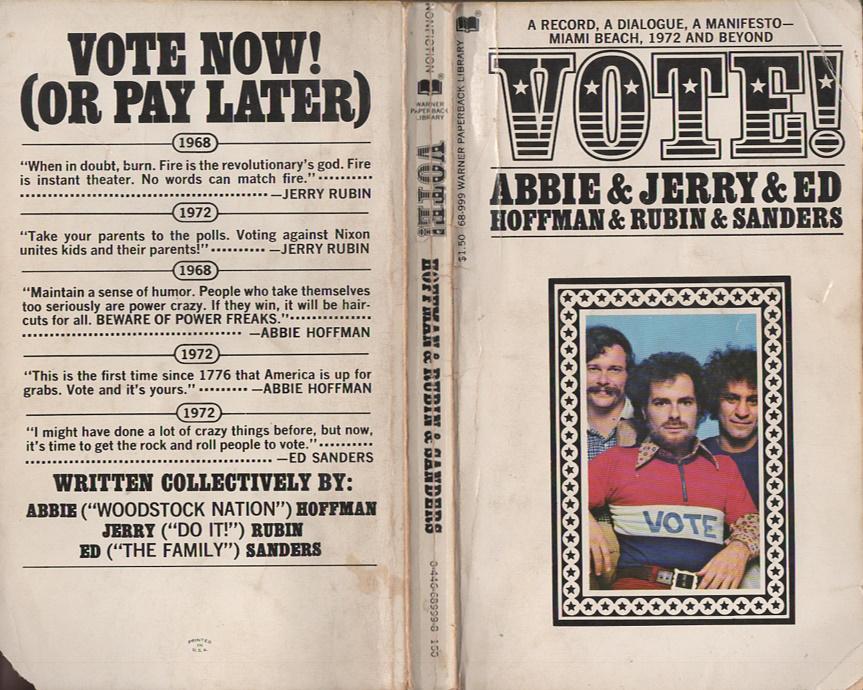
Ed Sanders
Eats the Republicans
Miami Beach: Our Place in the Sun
20,000 Naked Yippies terrorize Miami Beach
Humphrey Bogart meets his grandparents
To live inside a Media Image is like a prison
Tricky Dick vs. Gorgeous George
McGovern is the people’s vehicle
We now work from within to change The System
The Democratic Convention: Higher than L.S.D
Chicago cops dominate ’72 Convention, too.
Freaks bring Morality to Convention
Tape recorders recording tape recorders
Candidates as Political Prisoners
Please give Wilbur Mills a message from me
How well do you know McGovern?
Yippies K.O. Muskie out of the race
McGovern’s a Politician, not a Messiah
The day the kids abandoned McGovern
Alice Cooper is a long way from Alice’s Restaurant
Richard Nixon is a Closet Queen
The Movement: The New Nostalgia
Ed Sanders Eats the Republicans
The Freeshare Feast of the Generations
Poem For The Marriage of the Generations Lummus Park, July 11, 1972 Miami Beach, Florida
Opening Night of Nixon’s Coronation
Mitchell at Hate Camp—Bye Bye Bond Salesman
The Convention goes South, The CIA and the Cubans come North: Watergate
This November let’s Eat the Rich
[Front Matter]
[Dedication]
dedicated to
The Vietnamese People
Other Books By The Authors
Abbie Hoffman
Revolution for the Hell of It
Woodstock Nation
Steal This Book
Jerry Rubin
Do It!
We Are Everywhere
Ed Sanders
Shards of God
Peace Eye (poems)
The Family
Beer Cans on the Moon (record album)
[Note]
Fifty percent of the advance payment for this book was used by the Youth International Party, Inc. (YIPPIE) for the purpose of carrying out demonstrations and political activities in Miami Beach. In addition, twenty-five percent went for such expenses as agent fees, travel, and photos. The remaining twenty-five percent was divided among the authors. Of any future royalties, fifty percent will go to Youth International Party, Inc.
[Title Page]
Vote!
ABBIE & JERRY & ED
HOFFMAN & ROBIN & SANDERS
WARNER
PAPERBACK LIBRARY
NEW YORK
[Publisher Details]
WARNER PAPERBACK LIBRARY EDITION
First Printing: October, 1972
Copyright © 1972 by Youth International Party, Inc.
All rights reserved
[Acknowledgements]
our special thanks to
Ronnie Kaplan
and
Stew Albert
for their editorial assistance
[Contact]
If you want to share your ideas about this book, write to the authors care of:
Mark Kuppennan
Warner Publishing
909 Third Avenue
New York, N.Y. 10022
Warner Paperback Library is a division of Warner Books, Inc., 315 Park Avenue South. New York, N.Y. 10010
Contents
Abbie Hoffman & Jerry Rubin
Miami Beach: Our Place in the Sun
“O.K. Jerry, keep the faith”
20,000 Naked Yippies terrorize Miami Beach
Losing $5 to Mike Wallace
Cops are People, too (Gulp!)
Humphrey Bogart meets his grandparents
It’s great to grow old
Nixon Genugl
Winning over a Chiropractor
We Endorse McGovern
Vote for the Vietnamese
Free Martha Mitchell!
To live inside a Media Image is like a prison
Tricky Dick vs. Gorgeous George
McGovern is the people’s vehicle
We now work from within to change The System
The Democratic Convention: Higher than L.S.D
Chicago cops dominate ’72 Convention, too.
Freaks bring Morality to Convention
What a Convention!
Tape recorders recording tape recorders
Candidates as Political Prisoners
Glad to see you. Shithead
Please give Wilbur Mills a message from me
How well do you know McGovern?
The McGovern People’s Army
Yippies K.O. Muskie out of the race
Hubie woos the Yippies
Yippies on floor—where’s LBJ?
Let John and Yoko stay
McGovern’s a Politician, not a Messiah
The day the kids abandoned McGovern
McGovern is People’s Power
The Grand Climax
Red Star Over the White House
Famous in Flamingo Park
Alice Cooper is a long way from Alice’s Restaurant
Carry me back to Old Miami
Richard Nixon is a Closet Queen
Nixon: The New Nostalgia
The Movement: The New Nostalgia
“Two Hundred Years More!”
Ed Sanders
Eats the Republicans
The Gore Crowd comes to Miami
The Freeshare Feast of the Generations
Opening Night of Nixon’s Coronation
Mitchell at Hate Camp—Bye Bye Bond Salesman
The Convention goes South, The CIA and the Cubans come North: Watergate
John’s dirty pool
The Street Without Joy
Nixon and Chaos In Miami
This November let’s Eat the Rich
The night Nixon gave his Acceptance Speech
Miami Beach: Our Place in the Sun
The Democrats chose Miami Beach because it was 1200 miles from the nightmare of Chicago, freed from the tensions and passions of a big city, the playground of the country. The Republicans came to Miami Beach fleeing I.T.T. scandals and fearing uprisings in San Diego. What a theatrical setting was the choice of Miami Beach, sitting down there on the tip of America’s phallus.
Mayor Chuck Hall wears make-up and tries to control your head with compliments and bear hugs. The Police Chief is a gregarious liberal who gets his picture in the society columns every week. Miami Beach is a Hollywood setting, an American illusion. How can anyone take Miami Beach seriously, when he wakes up in the morning and immediately confronts the neon miasma, streets of huge picture windows filled with baby alligators and plastic oranges?
Miami Beach should be called Money Beach because it is a money capital. You need money to survive. The purpose of Miami Beach is yioney. Miami Beach is where people go to spend money, where the Mafia ‘cleans” its
money, where the vacationers pay steep prices searching for the golden tan. It’s here where the headliners of another generation bring down the house with cruelty masquerading as humor. Where else in America would you find roads named after television personalities? Let China have its Square of Glittering Hope and Highway of Patient Struggle. Here in Miami Beach we can drive down Arthur Godfrey Road, Ed Sullivan Boulevard, or stroll through Jackie Gleason Park. Miami Beach is Murf the Surf climbing into hotel windows and Lloyd Bridges climbing out of his wetsuit. It’s gin rummy by the pool while a Rent-a-Bird scratches your back and you wait for the big deal to come through. It’s gigolos stalking divorcées with stock portfolios. And suitcases filled with counterfeit twentydollar bills waiting to be exchanged for suitcases filled with baggies of powdered milk passing as heroin.
Lenny Bruce took one look at Miami Beach, rented a priest’s outfit and began panhandling for nonexistent leper colonies. Miami Beach is a paradise for any hustler who can afford a pair of patent leather shoes.
We were sitting in Police Chief Pomerance’s office, with Rocky and Lt. Larry Cotzen, at 11 a.m. about 10 days before the Democratic Convention.
Rocky had woken us up at our hotel with a plea to meet us “alone, without press, without T.V. cameras, for a very important matter.” As we sat there munching on our banana breakfast, Rocky began profusely apologizing for an article in yesterday s newspapers which warned oj 10 tough new laws against street demonstrators for the Conventions, including one that demanded jail time for anyone who dared to sing an obscene song in public.
“Fellahs, I don’t believe in trying to enforce laws that can’t be enforced. If you guys smoke a little pot, I’m not going to send my men in after you. I don’t believe in asking a police officer to make a fool of himself.”
Rocky was so interested in becoming Our Favorite Police Chief that we accused him of trying to use the summer to become either head of the F.B.I. or head of the Yippies.
In Miami Beach in the summer of 72 you figured every actor in the play had ulterior motives. Such a symbolic media center as a political convention inevitably breeds careerbuilding for everyone, major and minor historical actors. This was the summer when careers were built for the next four years. Ironically, all of us were in Miami Beach to find our place in the sun.
“Oh, I’ve been offered big jobs before,” Rocky exclaimed, in self-defense, “and why should I take them? So I can work 20 years waiting for the day I can retire and move to Miami Beach? Well, I’m already in Miami Beach,” he beamed. Rocky had us. Truly he and Miami Beach were one. What more could he ask for. When the meeting broke up, Rocky grabbed Abbie by the arm.
“Abbie, when are you gonna arrange for me to be in the movie?”
“Movie, Rocky?”
“Don’t kid me, we know the deal you guys worked out with Warner Brothers.”
“Oh that The cameramen will be here next week, Rock.”
What the hell was he talking about, we wondered, There was no movie deal. A week before Abbie had tried to arrange one with Al Ruddy, producer of The Godfather. Can you picture Abbie trying to convince the producer of The Godfather that peaceful demonstrations are going to make good drama? There were no movies, yet for some reason every cop we met, from the patrolman on the beat to the Chief himself, mentioned this mysterious multi-million-dollar movie. It was a good sign though. Nobody wants to play the heavy in an updated version of Wood- stock. We agreed that the cops would be cool. Rocky was a regular guy, a real me ns ch. And what was all this stuff with secret movement handshakes and quotes from our books? We were indeed a long way from Chicago.
Miami Beach, the recreational center, the little strip of land whose leaders get their philosophy from Playboy magazine. Miami Beach was chosen as a convention site for its escapist qualities. But Miami Beach showed you can’t run away anymore in America. For all its fairyland atmosphere, Miami Beach brought home even more the contradictions and disasters of contemporary America.
Where’s the beach? A Miami Beach with no beach!?! That would be the ultimate exposé of the Big Lie.
The big hotels stole the beach, building garish monstrosities of concrete and money. Every year more and more of the beach gets eaten up by the advance of greed and private ownership. Miami Beach is becoming, like the rest of America, an ecological disaster because of the desire for profit. Everything, including our beaches, gets sacrificed in the greedy grope for money.
Behind the neon and the glitter lie the tears. Even Miami Beach has its slum and palm tree ghetto. Shielded from the myth of fantasyland lies the reality: thousands of middle-, retired- and working-class Jews suffering in overcrowded and underserviced conditions while living the last years of their lives on shrinking fixed incomes. There must be more at the end of life’s rainbow than a cold platter of cottage cheese and a stack of unpaid medical bills.
We remember the day we all sat in Wolfie’s, our favorite Miami Beach hangout, eating chopped chicken livers and grapefruits, when an old couple stopped at our table to welcome us. They said:
“Miami Beach is the largest outdoor hospital in America”
And we looked again at the streets. Full of the discarded of humanity. Old People. Abandoned by their children and shattered by the pain and suffering of years. Ignored in the mythic romances of our day. Each one crippled in some way by a major fuck-up of one part of their organism. Left on the streets to die. All they have is each other—a community of the deserted, the suffering, the forgotten. Refugees kicked out of the Promised Land.
What better example of the inhumanity of the American experience—the treatment of old people. When you are no longer of any economic use, you are no longer of any human use in America. Yes, Miami Beach, that escapist carnival land, is a heated garbage can for America’s unwanted “waste products.”
When all the T.V. cameramen with their nonstop coverage (except for ABC which felt Marcus Welby, Af.D. reruns were better for the people than a live political convention) came to Miami Beach, who saw the old people? No one.
The focus was on the big hotels and the big actions by the Big Politicians. The media ignored the old as it ignores most of America’s problems. Old people do not fit into the myth of Miami Beach. Tourists aren’t going to shell out much to tour a geriatric ward. The purpose of media is not to expose reality but to perpetuate myths.
Only the Yippies—ironically enough—these apostles of youth, these alleged haters of parents and tradition and everything old—“saw” and felt old people and related to them as human beings. We forced the media to see them. We tried to project the plight of old people as a major, national, political crisis. We saw old people as an oppressed political constituency, and in the tribal alliance of voters from the age brackets of 18–35 and 65–100 we envisioned a common consciousness and the foundation of a new political power base.
But mostly we dug them. We discovered long-lost relatives. We held parties and demonstrations with them. We enjoyed seeing them lose their fear of us as parenticidal barbarians. The old people saw us less as myths and more as human beings. We felt their suffering. We transcended the age and stylistic gap and got really together. We felt our bodies and faces and realized we all are getting older all the time.
The choice of Miami Beach as convention site by the ruling classes was clone as a deliberate entertainment diversion. In 1968, six blacks were killed by police in an uprising in the Miami ghetto during the Republican Convention. They didn’t fit into the myth, so few people found out about it and the symbolic repression of Chicago got far more attention. Instead of masking, however, Miami Beach just points up more and more of the agonies of America.
The largest minority group are the Cubans. Do you realize 200,000 exiles from Communism in Cuba live in Miami? The level of fanaticism in these people is frightening. Two years before, Abbie spoke to thousands of students packed into the outdoor plaza of Miami University. Squads of angry Cubans stormed the stage, hurling bags of flour and garbage. Other squads waded into the students with fists flying. Thirty Cubans were arrested only to have the charges all quickly dismissed.
The night before we had all gone to see the movie Z, and one night later it was acted out live for us by revenge-crazy, C.I.A.-sponsored Cubans. The rumors of violent Cuban groups about to bomb, kidnap and Idll kept us nervous all summer. It became impossible to say—or even think—a good thought about Communist Cuba because you might get killed by the “crazy Cubans.” Death threats on the phone were a constant reminder that they were out there.
One realized the extent to which exiles from Communism have poisoned the American political atmosphere with their emotionalism against Communism, preventing Americans from seeing the truth and their own best interests. Since the
Republican Party benefits from such a perverted view, ail summer we feared the Republicans using the Cubans to provoke an incident to harm and discredit the demonstrators.
Nixon is buddy-buddy with the rich exile leaders who live in Key Biscayne. Cuban exiles played a role in the break-in of the Democratic Headquarters. Certain leaders and Mafiosi make huge profits from heroin-smuggling while the Justice Department turns its head.
* * *
Miami Beach would have been a better choice than Chicago for the Democratic Convention in 1968. A phony town for a phony event. Political conventions usually are artificial events, artificial displays of artificial democracy. For such events, Miami Beach is the ideal artificial setting.
It was the appropriate setting for the Nixon Coronation, though some isolated far-away island like those off Fascist Greece or the colonial Virgin Islands may have been better, of course. The problem with. Miami Beach is that it is not far enough away. It is still too close to the mainland America of war, poverty and pollution.
During the Democratic Convention, Miami Beach disappeared from sight. The drama of the Convention totally overshadowed the town and the demonstrators. Because the Democrats learned a lesson in 1968. The people will not accept unrepresentative government.
So the Democratic Party opened itself up to the masses of people usually kept outside the padlocked doors of power in America. The Democratic Party began to move into the future instead of holding onto a dead past The 1972 Democratic Convention could have been held in the middle of downtown Chicago and there would not have been a drop of blood spilled. Because the people were on the inside this time.
* * *
Power in Miami Beach is secret. Who wields power, and how money is made, and who owns what and when is none of your business. The foundation of the Miami Beach economy is hotels, hookers, and heroin, but nobody is complaining. An ecological disaster, a Beach without a beach, a huge gap between rich and poor, a fanatical right-wing minority, an invisible power structure.
By choosing Miami Beach, the two political parties tried to hide the reality of America by presenting to the world glossy images of the beautiful people at play. The gap between the myth of Miami Beach and its own reality, between Miami Beach and the rest of America, and between Miami Beach and the rest of the world, dramatizes the crisis of American capitalism today.
EVEN ESCAPE LAND HAS NO ESCAPES.
“O.K. Jerry, keep the faith”
Chuck Hall, what a character. We knew Miami Beach was no Chicago when we met the Yippie Mayor. Silver-haired and straight out of a Hollywood movie, reportedly worth 25 million dollars, a close politicai confidant and supporter of Hubert Humphrey, a goyish mayor in a Jewish ghetto, everybody’s friend, the biggest back-slapper of them all, “call me Chuck” sat behind his desk and looked at us with awe. “You guys have made quite a name for yourself,” he said, looking proud. He pointed at the John Lennon print of John and Yokos marriage hanging on his wall. “It’s the original, you know.”
Within an hour, Mayor Hall accepted our invitation to come to the Y.I.P. office, located in an office building two blocks from Convention Hall, in the downtown business section of Miami Beach. As you got off the second floor elevator you saw:
Allergist.
Professional Oxygen.
Physical Therapy.
Youth International Party.
It was a gas. Movement purists put us down
for having an air-conditioned, carpeted, brown-paneled office with comfortable desks and chairs, but it was cheap—$1200 for the four months— and it was protection from the mad Cubans who might be reluctant to bomb an office in a doctors’ building.
The Allergist had gone to Brandeis University with Abbie. He took him out to lunch one day and introduced him to other doctors who were also fellow alumni. Abbie had always wondered what had happened to his classmates. Now he knew. They had all become doctors and moved to Miami Beach.
Their mothers must be very happy.
Chuck posed for pictures with 10 of us in the Y.I.P. office and then said he hoped we might consider moving to Miami Beach permanently.
“I hope a lot of you fine young people who come here to protest this summer decide to stay,” the Mayor said. “Miami Beach just isn’t attracting young people anymore. You are all going to Europe instead. And this is a fine place to live, Miami Beach.”
Hall genuinely liked us. Ten days later he shocked the community by telling a luncheon of rich businessmen that we, the demonstrators, should be given one of the city’s golf courses as a campsite for the summer.
Hall put his career on the block because he had learned the Daley lesson: If people have no place to sleep at night, they have no place to go.
“Chuck, if the cops crack open my head, my mother and father won’t come down here this winter.”
Hall freaked out at what blood on the streets
would do to the peaceful, playland image of Miami Beach.
By agreeing to take both the Democratic and Republican Conventions, the city had offered itself up as a sacrificial lamb to the social conflicts of America. Hall advocated control by containment: Give the protestors a place to play in. Treat them as human beings with a grievance. Fatten the egos of their so-called leaders and then, pray.
What followed was ideological warfare in Miami Beach, carried on in the letters-to-the-editor columns in newspapers, all the radio talk shows and City Council meetings. The demonstrators were barbarians. Coming to freeload off the community. Steal Shoplift Demand to be fed for free.
For free!
For free!
“Let the Communists buy hotel rooms like everyone else,” said Miami Beach businessmen and residents, including a one-man pressure group, a lawyer named Ellis Rubin, who appointed himself the guardian of Miami Beach against the invading hordes. Ellis debated Jerry one night at the Unitarian Church and Jerry revealed that Ellis was his long-lost uncle from Cincinnati, Ohio. When he was introduced to Abbie, at a city council meeting, Abbie kissed him. We never saw Ellis after that.
Rocky, the police chief who had his men read Do It! and Steal This Book as part of an eightweek sensitivity training course, joined Hall in advocating the peaceful containment theory of law enforcement. “Give the demonstrators one place to camp in.” He privately told us that it would be impossible to enforce sleeping codes.
“You know the story of the 800-pound gorilla. Somebody asked where does he sleep at night. Well the answer is he sleeps wherever he sits down.”
Humphrey was out Daley was on his way. Nixon was coming in August
The political reality had changed from when we had first come to Miami at the beginning of May. Humphrey had been a serious contender. There were backroom plots being hatched to prevent the mandate for change being demanded in the primaries.
Hanoi and Haiphong had just been mined.
In the subsequent weeks, the McGovern campaign picked up steam. Only a few small splinter groups on the left felt McGovern the enemy. Most adopted a “lesser of two evils” attitude and began to build the action around the Republican Convention.
Many others packed up and went home, deciding that local organizing showed more promise than the complicated political maze that was developing in Miami Beach. Besides, the intense heat melted most people’s energy.
A month before the Democratic Convention, we began issuing statements advising people not to come down. Nevertheless, we still fought for a campsite and parade rights. Knowing that some people would show up.
We held the first demonstration of the Convention season to protest turning Miami Beach into a mini-military Saigon.
As the march begins, a huge Rolls Royce drives up and out steps the Mayor, face full of make-up for the cameras. He walks to the front of the march and starts leading it
What a scene, the Mayor jaunting with a fat
Yippie woman dressed up as Rocky Pomerance, Yippies made-up as Vietnamese women, a hysterical Martha Mitchell yelling “Freedom! Freedom I”, and young kids shouting obscene words about Nixon. Finally we get freaked that the Mayor is stealing our media.
We grab him by the arm and force him to the back of the march.
The Miami Beach City Council finally voted 4–2 to give Flamingo Park to the demonstrators, and the Democratic Convention passed without serious incident.
Marches took place every day and nigh’ from the park to the convention, but demonstrators knew that what was going on inside was more significant than any demonstration outside.
So much so that the first night some young kids tore down a fence outside Convention Hall in a desire to get in.
The news of tearing down the fence got a lot of people paranoid on Convention floor. It was Monday night and there were three more days. As word got around, Jerry bumped into Chuck Hall wandering in the aisles of Convention floor.
Jerry: I heard there was some trouble outside.
Mayor: Heard it! You got it wired to your ears, you little rascal Heh, heh. Jerry, take care of yourself. Was it the S.D.S?
Jerry: I don’t know. I’m not going to be your stool-pigeon.
Mayor: Jerry, I want you to know I love ya. We don’t want any of that fence business now because it makes it look bad for of Chuck, and if it’s bad for ol’ Chuck, it’s bad for everyone. What can you find out about this thing anyway?
Jerry; You misunderstand me.
Mayor: I’m telling you privately now that I want to know what’s going on. Dammit, if you won’t tell me, I’ll find out from police files. We going to make Life together this week? (Poses for picture) O.K. Jerry, keep the faith. (Moves on)
20,000 Naked Yippies terrorize Miami Beach
The naked march was the first non-event which complicated our relations with the police and people of Miami Beach.
Back in February, seven months before the Convention, a group of us called a press conference in front of Convention Hall to engage in some psychic media terrorism. Stoned, naked to the waist and laughing hysterically, in a total slapstick atmosphere, we promised that 10,000 naked Yippies would march down Collins Avenue to protest the Democratic Convention.
Reporters broke their legs running to the nearest pay phones. Stop the presses!
It was the lead story on the six p.m. news on all three T.V. stations.
For months the nude march grew and grew in the media, in the imaginations and fantasies of the people, and in police counter-insurguency planning.
For all its rent-a-sex, Miami is a pretty uptight place. A year ago, the police pulled the plug on a poetry reading by Allen Ginsberg when he began to sing the ecstasies of gay love.
Before that, Janis Joplin and Jim Morrison both had been busted for obscenity in their rock acts.
Hippies were constantly getting busted for lovemaking on the beach. Don’t forget that Miami is in many ways just another Southern town. And the attitudes of Miami influenced the Beach.
The nude march became so real that when the Yippies finally arrived in June to plan real activities, we felt the political need to call a press conference to call off the naked Yippies.
What’s happened to America’s sense of humor when Yippie must officially cancel a put on?
No, 10,000 Yippies will not march nude. Yes, that’s official.
Losing $5 to Mike Wallace
Mike Wallace, the CBS-TV star, made a visit to the Y.I.P. office. Stew Albert gave Mike the official Yippie back massage and Mike accused us of selling out because we had carpets. Jerry bet Wallace five dollars that 100,000 non-delegates would come to Miami to protest the Democratic Convention.
Jerry lost the bet because McGovern won the California primary and Y.I.P., fearful we might be lured by Republican provocateurs into riots that would embarrass McGovern, called off demonstrations. We decided to save our hostility for Nixon.
Generous Jerry paid Wallace the five dollars when he saw him on the Convention floor and threw in two tablets of Sunshine Acid for being wrong.
Cops are People, too (Gulp!)
Our view of the police has changed.
It’s true that they are protectors of the property of the rich and powerful.
It’s true that many cops are mean, sadistic bastards.
It’s true that many are corrupt and work hand-in-hand with heroin-pushers.
It’s true that many are extreme racists.
But it’s also true that many of them are also exploited members of the working class. That they are the visible scapegoats for a power establishment extending from the bank to the corporation board room.
One day Abbie was invited to address the patrolmen of the Miami Police Department. A much tougher police force than that on the Beach. About 150 cops were in the room in different stages of dress. Some had tee-shirts on, some carried riot helmets. A few were in plain clothes. Abbie doffed his cowboy hat and began:
“I guess you guys are wondering why I called this meeting.” (No laughs—try again) “Hey look, I didn’t come down here to get martyred; I ain’t even Catholic.” (A few laughs) Abbie lays down the general change in our philosophy, bulling a little here and there, like anybody would in that situation. He spoke for about 10 minutes. When he was through, the Community Relations Director asked for questions.
Barooml Like hounds on the fox they pounced.
“What right do you lazy bums have to come down here and disturb our community?’ “One step out of line and you’ve had it.” ““Keep those faggots away from my pants.” “They didn’t do enough to you in Chicago.”
The Community Relations Director mopped his brow and made some statements about opening the dialogue, and hustled Abbie from the room. Out in the hall though, a group of young cops approached Abbie.
“We don’t agree with anything those old-timers said. We feel closer to you than them. We went to Vietnam, they didn’t.” They spent a couple of hours together. Abbie had never met cops like this. “How come nice guys like you end up being cops?”
“Look, I’ve seen a few punks beating up an old man. Don’t you think I get a good feeling chasing them down?”
“Don’t kid yourself, I hate pigs as much as you, but I see a need for cops. Me and my old lady went to the Winterfest Rock Festival last year and there were problems. Bad drugs, rip-offs, the women were hassled. Somebody had to deal with that mess.”
Abbie’s bead was spinning like crazy He’d never heard a cop talk that way. He stared deep into his eyes. Now remember, this Yippie has about 70 stitches in his head, a shattered nose and a permanently screwed up back—all from cops. We all have friends put in prison by cops and a few killed by cops.
This cop hated Vietnam. Certainly he smoked grass. He was dealing with racism and sexism. His wife, he told Abbie, was in a woman’s consciousness-expansion group.
“How long are you guys going to keep your jobs?”
“We don’t know, things are changing. Were not alone. Every day we grow stronger. Who knows. How long you going to keep your job, Abbie?”
Humphrey Bogart meets his grandparents
In Miami Beach we stayed at the Albion Hotel, right out of a Humphrey Bogart movie. Our expanding, contracting collective of fifteen people piled themselves into three rooms on the seventh floor.
A week later, Secret Service men moved into the floor below.
We didn’t have that many secrets.
The Albion had seen better days. During World War II, when the large hotels were all turned over to high-ranking army officials for recreation, two minor hotels were reserved for civilian use. The Albion was one.
Rita Hayworth and Orson Welles spent their honeymoon on the seventh floor.
John Garfield and Ann Sheridan swam in the pool.
At one time, even Charlie Chaplin stayed there.
Today, it is more rooming house than hotel. Until we came, only old people lived there. The one elevator always broke down, the refrigerators in the rooms were getting rusty, and as many chairs were broken as were not in the T.V. room.
The managers gave us a special low rate and didn’t mind how many people we squeezed in a room nor did they freak out over the hate calls or the police visits. In the evening, the old women would don their clean white crocheted sweaters and sit on the porch kibbitring the night away.
The Neto York Daily Netos ran a banner headline story on our “luxury hotel penthouse suites.” The next day we took the reporter on a tour of “Mattress Meadow,” as we called it The News printed a retraction.
When we first came to the Albion, the old people shied away from us. We resolved to calm their fears. Each night we rapped with them. We were on our best behavior.
Often during the day they would listen to the local radio talk shows. Generally the only news in Miami Beach is the weather. In the winter they carefully detail each and every snowstorm in the North, reminding the tourists how lucky they are to have “come on down.” In the summer without Northern snowstorms, even the weather ceases to be news. Week after week, we were all that was discussed. Gossip on talk shows took the place of hardcore news. Strange stories about us beamed out over the airways. The Yippies had turned into a daytime Soap Opera. “Can Miami Beach Be Saved from the Hoardes of Hairy Dope Fiends? Tune in tomorrow for a hot-line call from Myrna Shapiro’s aunt in Orlando whose son visited the Yippie office and went away disillusioned.”
The old people grew to love the real life soap opera being acted out before their eyes.
We showed them how news is made up.
They showed us how time is made up.
Old people are a lot like hippies.
It’s great to grow old
When we first arrived in Miami Beach we were offended by the old people. They reminded us of our own mortality. The average age in Miami Beach is 65 years old.
As Yippies, we liked to believe we were going to stay young forever.
We proclaimed the millenium of youth culture and we made speeches, organized demonstrations and made a big fuss about being young, but nature wins out: We kept getting a day older every day.
We had been lured into a Madison Avenue trap: the bourgeois romancing of youth.
To glorify youth is to hate yourself, because everyone ages.
Capitalism glorifies youth because of its $$$ interest in selling the thousands of consumer products that people use to look younger and younger every day.
Capitalism is a functional system. When you can be exploited, you are important
When you are old and beyond exploiting, either as a worker or as a consumer, you are no longer important A functional economic system must be anti-human, as it promotes false values and dooms millions of people to the junkheap.
What better condemnation of capitalism than in its condemnation of old people! Speed-freak America has no patience with people who take a long time hobbling across the street. Young people think old people can’t have any fun.
Old people making love in bed is considered obscene.
Youth is glorified and old age shamed. Who decided that this culture would have a way of life that denies its own biology?
Opposing the tendency to see everything in America as normal and universal, we looked around at other societies, particularly China and Vietnam, and discovered that in those places, old people are respected and valued for their accumulation of life’s experience. For their wisdom.
America scorns wisdom because it’s not profitable.
Old people have a special, sacred place in the values of North Vietnam and China because old people reaffirm the continuity and value of tion that youth inevitably lacks, because old people reaffirm the continuity and value of human struggle. If old people are not rigid, they can learn from the young. If young people are not rigid, they can learn from the old.
Elderly residents of Miami Beach freaked out at the prospect of thousands of young barbarians descending on their homes.
They foresaw their purses being snatched and old people mugged and mangled on the streets at night. They foresaw homes ransacked and stores burglarized. They foresaw daily rudeness, insults, and young people kicking and spitting at them in the street—or even worse—ignoring them as they “took over” Miami Beach.
And who can blame them? All they had read in the mass media was the arrogance of longhaired demonstrators. They had never been given the opportunity of reading about our concern for human beings and our love for people.
We were first frightened by the old people. We realized that they were a mirror in which we could look at ourselves. What did we have against these old people?
We had spent the past four years rebelling against our parents and glorifying youth, and now we came face-to-face with a community of old people. Were they the enemy? Were they our enemy? Were we going to sacrifice them to the struggle? Were they going to suffer and die this summer in Miami Beach?
No. Maybe we were wrong in our attack on all old people. We rebelled against our parents, but not our grandparents.
We started hanging out with old people. Stew Albert went to a couple of old peoples’ meetings, gave speeches and got huge applause.
“Don’t let the meshuginahs get you down,’ Stew told the old folks. “We came to Miami Beach not to make tzoris for you, but for Richard Nixon.”
Ht felt so good to give a speech and be applauded by a room full of people over 65,” said Stew, very moved by the experience.
Joyce Hodge began organizing weekly parties on the beach between young and old.
On the first Yippie march of the year past Convention Hall—protesting the military occupation of Saigon and Miami Beach—Jerry bumped into an aunt and uncle he had not seen in eight years, and be almost cried with joy. They looked each other over at first with fear of rejection. Then they smiled. Jeny wasn’t as awful as the papers had said. And it was good to have kind relatives.
Yippies are the revolutionary group that should break the age barrier because we did so much to build it We found that those old people in Miami Beach were more than just ‘‘statistics” or a “category”—they were our long-lost relatives.
Jewish Yippies discover Jewish grandparents in Miami Beach.
It was a beautiful story, which turned the summer into a schmaltzy musical comedy instead of a violent tragedy.
We got stoned and went to see Fiddler on the Roof with the old people. Outside on the street we danced old folk dances.
Old people are like us.
They just hang out, meditate and groove in the sun all day. They are poor. Most live on social security or fixed incomes. After working hard all their lives, they feel abandoned by the capitalist system. They have an “old people” class consciousness and like us, they are sick of work and want a free society which satisfies the human needs of people.
They live communally, and hang out in street scenes together.
They don’t like violence.
So Yippies and the very old could cross the lifestyle barrier and see a common identity. Maybe we had accidentally discovered something. Maybe in the alliance of the young and the very old, we could build a powerful political movement. People over 65 are 15% of the voting population (20,800,000) and youth 18–24 years old are 18% (25,000,000). Put them together and you get 33% of the potential voters.
Already newspapers were carrying stories of the formation of the “Grey Panthers” in Philadelphia-militant, angry, revolutionary senior citizens who named themselves after the “Black Panthers.”
We consciously began io project a new myth —youth and senior power. A Yippie-ycnta pact. Old people greeted us at the end of our first march and gave us a huge papier maché key to the city. We marched arm-in-arm with senior citizens to protest an anti-Semitic country club.
We catered a “Marriage of the Generations” to symbolize the end of the generation gap.
We were the first people in a long time to treat them seriously, to listen to them. Old people in turn supported our getting a campsite from the city. A Miami Beach rabbi told Allen Ginsberg that we had turned the fear of the community around.
Capitalism oppresses both ends of the generation spectrum—the very young and the very old.
Relating to old people has helped us to come to terms with our own ageing. Like old people, we have become health- and body-conscious, aware that taking care of your body in a positive way, loving your body, is the best way to health, and old age is great if you’re in good health.
Most people are afraid to talk frankly about the question of age. They shrink from it out of fear. It is taboo, a subject of ridicule, scorn, shame. Where is the person who is proud about getting older? We are all casualties to our own youth-worshipping propaganda.
Those of us who are the veterans of the 1960’s are the pioneers on the frontiers of age.
We must create anew what it means to grow old just as we created new meanings for being young.
We must change the nature of the ageing process. We are the biological-sociological vanguard. History has placed us in the role as models whether we like it or not because we are a transitional generation, raised in the aftermath of World War II. We carry a mixture of the old and the new into a future without maps or rules.
“Hey, Abbie, aren’t you getting old?” the reporters queried in unison.
T always was old,” he smiled. For five years now, the Yippie had passed the magic cut-off figure of thirty. One of the great moments in our famous Chicago Trial occurred when the prosecutor was crossexamining him.
Prosecutor: Now can you explain to the jury all this stuff about youth culture?
Witness: Oh Schultz, come on now, I’m three years older than you. Why don’t you explain it!
Reality jolted the courtroom. The media mirrors shattered. Abbie’s kids marched into the courtroom. Age, alas, is in your head. If you asked us for a definition, we’d say when you’re old you look back, and when you’re young you look forward. If you want to know the truth of it, we are getting old. We all spend too much time looking back these days.
Y.I.P.s breakthrough with old people this summer in Miami Beach may be the first step in a historic change for youth culture in the definition of growing old.
Nixon Genug!
Yiddish is the language of the old people of Miami Beach. It’s a beautiful language composed almost entirely of exaggerated idioms and epithets.
There is no way to write Yiddish since it is strictly a verbal means of expression. In Germany, you write it in German, in Spain in Spanish, in America in English, in Israel in Hebrew.
Since very few young people know Yiddish, this may be the last Yiddish poem. The old people on the benches in Lummus Park should be glad to translate it for you.
NIXON GENUG!
Vos tutzick America?
Vuh bis der gaein?
Mit and ganise tacke Nixon
A odder chiye tzmachen dem war tn Vietnam
Un tucheslecher mit de ganse gesheft
Yentzer de urermerund kranke
Vos tutzick America?
Vuh bis der gaein?
Mit un nishgutnick Nixon
Un shlump mit Mantovani records
Ver tzozugen un gansser yuntef in Miami
Uber tzegevden a shtickel white bread (Echi)
Vos tutzick America?
Vuh bis der gaein?
Drai unzerer kaink kop
Mit dinah luftraizer
Tzebleiden in Key Biscay ne
Kibittzin mit Kissinger
Leben a guten tog mit Pat
NIXON GENUG! NIXON GENUG!
Shvieg! Shvieg! Shvieg!
Cumt November est do kreegen cost cumt der.
Shoiegl Shvieg! Shvieg!
NIXON GENUG! NIXON GENUG!
Winning over a Chiropractor
“Well, there’s at least one thing Nixon and I have in common,” said Norman Mailer, sitting next to Jerry in the Green Room of the Fontainebleau waiting for McGovern’s press conference, and reading together in the morning Aliami Herald that Richard Nixon has his “back and spine manually adjusted by a chiropractor.”
Like Mailer and Nixon, Jerry’s a chiropractic freak. Goes to chiropractors Jack Soltanoff and Gus Bernstein a couple of blocks from his house every week. He believes in the chiropractic theory of preventative medicine that good nutrition, vitamins, and exercise like yoga are the answer for sickness, not pills and shots. A friend said to us recently, “You guys are funny. You tried every way you could to give your life away in the ’60’s. Now you’re trying every tiling to get it back.”
In the 1960’s, we saw ourselves as invulnerable. We couldn’t lose. Then we started growing older. Sustaining some setbacks. Reducing our ambition and our expectations. We began to see ourselves as vulnerable, and we started taking better care of ourselves.
For our health, Miami Beach was good and bad.
The heat during the summer sapped your energy and seemed to drain away even a little life force. But the heat drove you to the swimming pool and beach to relax and exercise. The heat exasperated patience, increased intensity and tempers flared. But the pace of the environment was also mellowing.
To stay in shape, Jerry and Stew Albert began every day by crossing the street to see a chiropractor and maturopath, Dr. Allen Coopersmith. We had a relationship with Al that began strangely but evolved into a symbol of the closeness we developed with the older residents of Miami Beach.
We met in a bar during a Frazier warm-up fight Everyone joined a pool in the bar on the exact round Frazier would win.
During the fight, Al kept defending America and Nixon, provoking us by saying he didn’t want Miami Beach ruined by freeloaders, talking about defending his house against the hippie invasion. The vibes were hostile. At the same time he offered us free chiropractic adjustments.
Should we accept his offer of free adjustments? Could we put our neck in the hands of a right-wing chiropractor with complete trust? We finally decided this was all paranoia and began going to the chiropractor, who found out we weren’t bad guys looking for trouble. We discovered that he was actually against the war.
He was relieved to discover that we hadn’t come to Miami Beach to vandalize his home. We discovered that we both wanted Nixon defeated and McGovern elected- Person-to-person contact produced warmth and broke down lots of phony stereotypes.
Weeks later: Al Coopersmith is carrying his chiropractic table into Flamingo Park, to the scene of the Yippie encampment. In a few moments he will be giving free adjustments in front of T.V. cameras to lines of kids. No longer does he think frightened thoughts about us. We’re his younger brothers and sisters now.
We Endorse McGovern
After endorsing McGovern on April 23, 1972, in a spontaneous act of love for his honesty and Vietnam stand—we decided to talk to McGovern officials about it. The young staff and volunteers in New York loved our switching from Pigasus in 1968 to McGovern in 1972. Humphrey immediately denounced McGovern as the “candidate of the left” because of it, though he soon dropped that Joe McCarthy line of attack when he saw it wasn’t working.
We contacted Dave Ifshin, a friend in Washington, who arranged a meeting at McGovern headquarters with Rick Stearns and members of the Y.I.P. collective, including Stew Albert, Gus Reichbach, Brad Fox, and ourselves. Stearns was the person in charge of lining up delegates in all non-primary states and was considered the mastermind of the McGovern strategy.
Stearns greeted us with a friendly smile and handshake and we all packed into his small office. The first thing he said to us was: “You know, you’ll be opposing McGovern as soon as he takes office. You’ll like him on Vietnam, but that’s about all. He’s not radical. He’s a politician like all other politicians. He’s a liberal He believes in the system.”
“Yeh, we know,” we replied. “We know well eventually be against McGovern. But we want to support him to defeat Nixon. And to end the war in Vietnam.”
With this understanding achieved, the meeting proceeded. Over Steams head was a map of the U.S.A, with all the McGovern battlefronts. Stearns outlined to us the McGovern strategy for winning.
“If we do not make it on the first ballot, we’re in deep trouble,” he said. “Then the bosses will steal it from us in the backrooms with deals and offers and pressure.”
Stearns saw we were sincere in our support of McGovern and was genuinely relieved. He said that he, McGovern and others were paranoid when they first beard of our endorsement They thought we did it consciously to embarrass and defeat McGovern and help give the nomination to Humphrey—proving to young people once more the corruptibility of American electoral politics.
An interesting conspiratorial philosophy, we thought, but not true, we told Stearns. The idea of “the worse, the better” may radicalize some people, but it also spreads cynicism and fear. Another Humphrey-Nixon race would drive thousands of young kids not to revolution, but out of politics. We need breathing space, room to move. We want to help McGovern win; we do not want to do anything to hurt him and help Nixon. “Well accept anything he says as long as he remains firm on the War. For us the Vietnam War cannot be compromised.”
The meeting continued for another hour with suggestions back and forth. Stearns said McGovern was not the kind of man to repudiate our endorsement opportunistically, and we talked about the theme: “McGovern can unite the country from a steelworker in Gary, Indiana to a Yippie in Boston.” We said we’d keep communication channels open.
The meeting soon became a source of media gossip. We even heard one story that Rick Stearns gave us $20,000 so that we’d cool demonstrations during the election.
Wow.
Vote for the Vietnamese
The real reason for supporting McGovern is that by doing so the Vietnamese War will be brought to an end in the shortest possible time. In his words, we must “Vote for the Vietnamese people who cannot vote regarding the destruction of their land.” And wbat incredible destruction it is. There are now over one million dead, close to three million maimed or crippled. In the defoliated countryside of Vietnam, if a pregnant woman drinks a liter of water between her second and seventh months of pregnancy, the chances are 752 that the fetus will be deformed.
Vietnam was once the rice bowl of Southeast Asia, exporting rice to almost every country in the Far East. Now, after the defoliants and the intense bombing, ecology experts predict that Vietnam, in order to feed its people, will have to import rice for the next 20 years—even if the war were to end today. Twenty percent of the land mass has been reduced to sand and bomb craters—a veritable moonscape of death where nothing can grow. In the North, the deliberate bombing of the dikes has threatened famine for millions more. Perhaps no single inhumane act of desperation since Hitler flooded the subway tunnels in Berlin during the Second World War equals the bombing of the dikes. Yet it continues.
The strategies the U.S. employs are the masturbation fantasies of the Doctor Strangeloves in Washington. The Pentagon War Games are acted out in reality in Vietnam. What is happening is more than filler on the six o’clock news shows. It is electronically-wired battlefields, fully-automated saturation bombing, deadly mines triggered by distant buttons, and “smart” bombs guided to their targets by built-in television cameras.
As the troops come back, the killing is turned over to the robots of death. The corpses remain Vietnamese. Daniel Ellsberg says that at the present level of fighting, the war will last at least another fifteen years and the dead will increase to about six million.
Nixon, by withdrawing the troops, has created the impression of a war being ended. American troop casualties are at a bare minimum ( all toll, however, 20,000 Americans have been killed and 110,000 wounded since Nixon took office), yet the air war has clearly intensified. According to figures just released by the Library of Congress, under Nixon, 469,000 fixed-wing air missions and 20.8 million helicopter flights have occurred. These air missions have resulted in 8.6 million tons of bombs being dropped, or an increase of about 40% over the previous four years.
In 1964, Barry Goldwater ran on a Vietnam policy of reduced American troop strength, increased bombing raids including missions designed to cripple the dikes, and mining of the harbors. In 1972, Richard Nixon is carrying out Goldwater’s war policy. The “secret” plan for peace he promised four years ago is now public. Bomb Vietnam back to the Stone Age.
That the Vietnamese continue to fight and indeed manage to control most of the land area has to make their struggle perhaps the most heroic in human history.
Working to defeat Nixon in the weeks ahead means joining yourself to that struggle. From the street to the ballot box is not that long a walk.
Free Martha Mitchell!
Eight weeks have gone by and no one has heard from Martha Mitchell We called, but her phone doesn’t answer. The last words from her went like this:
“I’m all black and-blue ... A man walked into my bedroom and pulled the phone out of the wall ... They threw me down on the bed and stuck a needle in my behind ... I’m a political prisoner.... I love my husband but I’m not going to stand for all those dirty things that go on.”
As wife of the Attorney General, Martha Mitchell had a front row seat to watch “those dirty things go on.” While Martha was being forcibly gagged, the entire set of keys to the Democratic Convention Hall mysteriously disappeared. Two weeks before, five men with clear connections with the C.I.A. and the Committee to Re-elect El Presidente, were caught red-handed breaking into Democratic National Headquarters. They had in their possession tape recorders, photographic equipment and electronic bugging devices.
During the Mayday demonstrations last year in Washington, 13,000 arrests were made under the Justice Department’s supervision. “Our aim is to keep these radicals tied up in the courts for years to come,” said John Mitchell. No matter that the arrests were all termed illegal and dismissed in court. Every area of social protest in the country is heavily infiltrated with informers and spies from a variety of government intelligence agencies. In our Chicago trial, there were undercover agents from five different bureaus testifying. There was even one agent from U.S. Naval Intelligence!
Last December the government, in an affidavit signed by Richard Kleindeinst, admitted to having five wiretaps on one of us. The Supreme Court later ruled such wiretapping of supposed “national security risks” illegal without a court order.
The Justice Department had a choice of revealing to us what must be miles upon miles of recorded conversations or dropping the charges. They chose to drop the charges.
The same recently happened to suspected bomber Leslie Bacon. Government wiretapping has played a role in a number of political trials from the Berrigans to Daniel Ellsberg and Tony Russo. The Justice Department has no choice but to keep the recorded conversations secret. To do otherwise would reveal that they have listened to conversations of everyone spoken to over the past years. They rarely win political cases in court anyway.
The purpose of all this is government by intimidation. “Our aim is to make every radical think there’s an F.B.I. agent on his tail,” once remarked J. Edgar Hoover.
Hoover’s dead, but his spirit lives on.
From Daniel Ells berg to Martha Mitchell.
From the offices of the Black Panther Party to the Headquarters of the National Democratic Party, Nixon’s snoopers are ever listening. The quickest way to have your government listen to you these days is to pick up your phone and call some anti-war group. Somehow, we get the impression that if McGovern wants to hear what’s on your mind, he’ll call you up and ask.
To live inside a Media Image is like a prison
We were a long, long way from Chicago. In 1968 we did not see as possible the creation of a positive political coalition. Our goal was to shock all of America into a new consciousness.
In 1972, we have already achieved the goal of shocking America. New goals are needed. Our goal now is understanding, communication, contact and organization. We are interested not in symbolic victories, but in politica] power. To do that we have to be open to people and not frighten them. To do that we must ring door bells again and make friends.
The image of a revolutionary in America is changing from a bomb-throwing guerrilla to a human being concerned with helping you solve your problems.
Look at how the Black Panther Party has metamorphosed from gun-carrying, leather-jacketed angry blacks to an organization of men and women serving free breakfasts for children and creating a powerful collective consciousness in the entire black community. Bobby Seale is running for Mayor of Oakland. The Panthers have registered 20,000 new voters there.
Same with the Yippies. We have changed from violent street freaks to the people who worked patiently with old people in Miami Beach. Who encouraged voter registration and freak power on a local level. This change fits the human conditions of this period. From polarization to reconciliation. Change moves in cycles.
Nixon divides the people.
We must attempt unity.
While the U.S.A, wages the most immoral war in history—technology vs. people—we must offer a moral alternative, and not be seen as equally violent It is the people, not any minority movement, who in the end have the power to change the government. Since America is losing a lost war, we have the opportunity now to bring the people to radical solutions.
Our violent demonstrations set the stage. They were necessary. The violence in Chicago in 1968 directly led to the change in the Democratic Party in Miami Beach in 1972. The violence provided that shock which was needed to provoke the change. The change will not be as dramatic, but it will be more long-lasting. We cannot allow ourselves to be trapped in “expected” roles.
In 1968 Nixon was elected and brought down on our heads repression, which trampled the free spirit in America, the free spirit that must be the basis for any creative movement.
Without this spirit in a country, even the rebels die.
Under Nixon, all hope, all life dies. Little is ventured because little is gained. He kills us with boredom and indictments.
Yippies, freaks and what’s left of the outspoken radicals in America today should work to rekindle the fire of freedom to give people hope, to inspire rather than frighten, to unite rather than divide: to unite the poor against the rich, the peaceful against the warlords, the honest against the corrupt, the magnificent many against the powerful few.
We helped create this opportunity with our demonstrations between 1964 and 1969. Demonstrations should never stop, but we should not remain frozen in past media images.
We must shake loose of the images the media profits off of.
The media is usually the last to know! Most reporters can see the present only in terms of the past, never the future. Miami news reporter Rod Stuhlberg told Jerry that “My paper would never print a picture of you smiling. That’s not Jerry Rubin’ to them. To them, Jerry Rubin’ is always sneering.”
Our opportunity now is to smile and reduce the fears of people—to convince the American people that Nixon represents a dishonest class which wages war and steals from you. Our opportunity now is to transform the Democratic Party into a true vehicle of the people. We can end the war in Vietnam by electing a candidate who pledges to stop the genocidal bombings on Inauguration Day.
In the ’60s we consciously alienated the American people with our demonstrations in order to provoke crises. Now polls show that most of the American people are alienated from their government. Our purpose now is not to alienate, but to organize and communicate, to help channel the alienation in politically-constructive directions.
All the things we fought against in the 1960’s—from the war in Vietnam to hypocrisy in government to racism—are climaxing in the 1970’s.
In the 1960’s these issues were fought in the streets. Now they are being fought in the Convention and elections, in university classrooms, prisons. Congressional hearing rooms, the armed forces, hospitals, city newspaper rooms—as well as in the streets. The struggle is going on inside the channels of American society as well as outside.
Standing on the floor of the Democratic Convention surrounded by demonstrators-turned-delegates, the definition of who’s inside and who’s outside became blurred.
The Democratic Convention in 1972 showed that the people who fought in the streets in the 60 s were right We were guests within the Convention and L.B.J. was the black sheep of the family. We were in—and Daley was out!
Tricky Dick vs. Gorgeous George
The 1972 Presidential election is an election between two Americas. One America believes in peace through military force and the other America believes in moral force through peace.
One America represents white, male, rich, Christian America and the other America reminds all of us of the needs of black people, women, Indians, old people.
One America sees humanity as an evil to be controlled and the other America sees human beings as good people who can become better.
One America wants to presene the past, the other wants to move into the future.
One America will sacrifice the country to preserve the empire and the other America will sacrifice the empire to preserve the country.
One America wants to shut its children up and the other wants to see its young act as catalysts for change.
In the summer of 1971, Jerry went to Chile with Stew Albert and Phil Ochs. They got their heads turned around concerning electoral politics. They saw how elections could become another tool radicals and revolutionaries use to spread our message and gain power.
And guess what—in Chile, revolutionaries like the Guevarist M.I.R. use laws and rules of bourgeois capitalist elections to isolate the rightwing, make political changes in the economy, and increase the aspirations and hopes of the people.
The M.I.R. has a sophisticated position toward Allende. They realized Allende is no revolutionary, but that under the tolerance of an Allende Government, revolutionaries have space to move, to organize and mobilize the people. Allende’s failure as a reformer—bringing the people along and then being unable to successfully complete all his reforms under a capitalist framework—educates the people and makes them willing to accept even bolder plans.
During the past year, the Tupamaros suspended all forms of confrontation to join in a left-wing coalition trying to oust the right-wing dictators in Uruguay. The coalition failed and the Tupamaros are back to fighting in the streets. A revolutionary struggle must adopt a variety of tactics.
In 1969 and 1970, North American revolutionaries influenced by the courageous and romantic Weather Underground scorned elections and promoted armed struggle as the only means of change in America.
Armed struggle as the main weapon failed to develop—though the Weather Underground is still very alive and well (they bombed the Capital and the Pentagon in the last two years). We began to look for other ways—even within the system—to change North America.
All the ways have not been found. In the past few years the world has proven to be more complicated than we suspected.
Patience is now required.
McGovern is not a radical like Allende, but he represents a definite break with traditional American politics. “American politics will never be quite the same again,” McGovern said in his acceptance speech. What’s new is not McGovern, but the fact that McGovern knows he owes his power to the thousands of kids who ring doorbells.
If McGovern abandons the kids to become “practical,” “political” and “successful,” the kids will learn a hell of a lot and experience a radicalization similar to 1964, 1965, 1966 and the discovery of the Vietnamese War. In 1964, Abbie fought the good struggle at the Democratic Convention in Atlantic City. We had come out of organizing in the South determined to seat the Mississippi Freedom Democratic Party in place of the all-white racist delegation. Morality demanded the change, but morality doesn’t dictate policy at Conventions.
Politics is power.
The naive té of the civil rights movement was replaced by the tough-minded Black Power movement.
If McGovern does not get taken over by special interest groups, the kids will have power and leverage in America.
McGovern is the people’s vehicle
Because it is now possible to work within the system does not mean we give up the streets. We will always need the streets and demonstrations as onr counter-balance of pressure in this system. To give up demonstrations means to sacrifice the very movement that got us where we are today. We should try to give McGovern as much pressure from the left as he gets every day from the right.
We must constantly be going past McGovern, from the issue of Vietnam to exposing imperialism in its entirety, from corporate stealing to an advocacy of socialism.
McGovern will never mention unpopular issues unless we force him to.
We should not see as a choice demonstrating or working for McGovern. Both are part of the same process. Demonstrations create the issues in the society.
We will probably be demonstrating against McGovern within six months after he takes power. In fact, we will demonstrate more against McGovern than we did against Nixon. Because we will expect more, and we will be more quickly disillusioned. Democracy will be more alive under McGovern. There will be hopes that are realized and hopes that are shattered. The important thing is that there will be hope.
McGovern is not the issue.
McGovern may be a good man or he may have his price. The issue is the campaign itself. The power of the McGovern camp is not the candidate, it is the movement The candidate is important, but the organization can live on as a new power base in America—the politically- mobilized young working on a children s crusade to win the hearts and minds of the American people.
If McGovern loses in November, the organization remains. We can’t afford to cry, mourn or get depressed if we lose; we must turn all that negative emotion into energy for 1974 and 1976. At worst, 1972 is just the warm-up in a long struggle to change America.
McGovern’s victory in the primaries and the Convention was a victory of flesh-and-blood vs. the money machine. In New Hampshire, thousands of young kids rang doorbells for McGovern, to defeat Muslde and his machine of official Democratic Party hacks.
McGovern vs. Nixon is people vs. money. The election is turning on life-and-death class issues unlike any other election in American history. The question is: Can the McGovern kids convince the workers that the rich are stealing from them? Or can Nixon convince the workers that supernationalism is most important and that Commies and anarchists still threaten everyone’s home?
The young are here for change. The young are for McGovern. Any society which hopes to survive needs its young to replace the old in the positions of power. To insult the young is to forfeit the future.
The 1972 election will be the first in a long time to be decided in family debates across the land. The McGovern campaign provides the opportunity to educate masses of people about the War and U.S. imperialism in general.
It allows for discussion of sexism and racism, of reduced military budgets and national medical health plans.
Of amnesty and legalized grass.
Of free abortions and adequate wages for workers. It allows for the airing of all the issues that brought us into the streets during the past decade.
It allows for all this even though McGovern compromises many of these issues in the face of political reality. Like in some oversized Volkswagen camper, it’s possible to squeeze, bend and twist almost all the various strains of protest thrust forward during the 1960’s.
Take your parents to the polls for McGovern.
If McGovern loses in November, don’t be discouraged. McGovern is only the beginning. Trust yourself—not McGovern.
We now work from within to change The System
“Does this mean you now believe in working within the system?” many reform Democrats asked.
We don’t believe in those categories “within” and “outside” the system. It is our demonstrations outside the system which have made it possible to work effectively inside the system.
The inside can never move along well without a push from the outside.
It s yin-yang.
Sometimes the inside closes (1968) and we all have to work on the outside. Sometimes the inside opens (1972) and we can work using the channels of the government. Chicago created Miami Beach.
The goals—socialism and peace—never change.
Historical situations do change, however, and tactics must relate to the situation. What the 1972 Democratic Convention showed was that some American institutions like the Democratic Party are more flexible to change than we imagined in earlier years. They arc more flexible because of our efforts. The question is not are you inside or outside the system, but rather do you want to maintain or change the system.
“The people will not be ready for armed struggle until the people have exhausted all possibilities for constitutional democracy,” said Che Guevara, who by the way, once worked as a bus boy in Miami.
* * *
Maureen Bremer is 24 years old from the South Side of Chicago. Four years ago she got trampled on Michigan Avenue. This year she vowed to challenge Daley. She and her friends got six hundred signatures on a nomination petition. That and 25 bucks got her on the ballot She and her friends leafleted the neighborhoods and rang doorbells. She won, only to have the Daley regulars refuse to concede the victory. She raised money for the trip to Miami and there began an intense lobbying campaign with other delegates. The fight was uphill all the way. Maureen had never had anything to do with politics before in her life.
In the wee hours of Tuesday morning we stood on the floor of the Democratic Convention Hall and tabulated the votes. An incredible victory was happening. Idealism challenged Power and defeated it. We went over to the Illinois delegation and symbolically sat in the Boss’s seat
Victory!
How sweet it is!
As long as the system is flexible, we must try to use it. There are no formulas, inside or outside.
For us the 1972 Democratic Convention is a historic breakthrough in people’s democracy. If it continues to work like that, it may be leftwingers who will be soon calling for “Law and Order,” and the neanderthal Nixons and Meanys who are boycotting elections and engaging in illegal activity.
IN 1968 WE BOYCOTTED THE NIXON-HUMPHREY ELECTION.
IN 1972 GEORGE MEANY BOYCOTTS THE McGOVERN-NIXON ELECTION.
The McGovern campaign could see the breakup of the AFL-CIO and the return of the labor unions to the workers. George Meany and Richard Nixon share the same values. The leaders of the AFL-CIO identify more with the aspirations of the leaders in the White House than with the hopes of their own members.
The labor leaders heading up the ABM—the “Anyone But McGovern” movement—were closeted in the Americana Hotel. Their lieutenants, about 30 in number, camped in the gallery just off the floor to the right of the speakers platform. Right behind where first base would be.
All Monday night they lobbied against McGovern on the crucial California Delegation debate. A UPI release summed it up best: “Tonight labor leaders feverishly tried to build bridges to the past.” When they lost in California, many of them left the hall. Well have to go around them to reach the workers.
Student arrogance toward the working class must be eliminated. The economic depression allows an opportunity to create a worker-student alliance. The campaign can be the vehicle for that joint venture in change.
The Democratic Convention: Higher than L.S.D
Did you ever expect Walter Cronkite’s news show to walk out of your T.V. set and start acting right in front of you?
That week of the Democratic Convention in Miami was a week in which history was made right in front of your eyes. You stopped and rapped with the history-makers about the weather and food as history marched on.
Walking through the floor of the Democratic Convention every night was a multi-media psychedelic experience as high as any acid trip.
Of course, real dope made it all even better.
Every night we’d take a break, ditch the Secret Service men, and get stoned under a tree, or behind some staircase or in some secret hallway. We had a little vial of a special grass compound distilled by the famous psychedelic chemist who cooked up the famous Honey in Chicago. Inside the little bottle was a kilo of the best grass in the world, refined down to a thick, brownish liquid.
It’s the most powerful, mellow high around.
Like eating two or three hash brownies. It’s earned the name “Number One.” Just a little dab on the tongue will send you buzzing for six hours or more. Every night Abbie made the rounds on the Convention floor turning on delegate after delegate. He even turned on some Wallace people from Louisiana and some Humphrey supporters from Wisconsin. Hart Perry and Karen Mitnick made a movie documenting most of the tongue-dabbing ceremony.{1}
The Secret Service still isn’t sure what happened.
They thought we had some kind of sore throat remedy. And who’s to argue with the Secret Service?
So many things going on at the same time! You had to convince yourself that you were never missing anything or else you’d go crazy. Leslie Bacon called it an “orgy, but everyone forgot to take off their clothes.” It felt like a basketball game, a rock show, a theater of the absurd, the first S.D.S. Convention, a meeting of the early Berkeley movement, a Broadway play, a Fellini movie, a never-ending cocktail party without cocktails (except we discovered the speakers had a bar under the podium!), a freak show on another planet, a huge wonderful party in which all your friends and all the famous people you always wanted to meet were there.
It was history-as-theater.
You never knew who you’d bump into. Scoop Jackson is coming. A Yippic jumps into the receiving line. Scoop moves for his hand as any politician hungry for a piece of meat
“Hi!” declares the Yippic cheerfully, very loud to get his attention. He smiles. “I don’t think very much of you, Scoop Jackson,” Yippie shouts. Jackson looks at him in shock.
“You’re a Warmonger.”
Not terribly shaken, Scoop has a good comeback: “It’s nice to meet another one.”
There’s Hubert Humphrey himself. “Hey, Hubert, we certainly made our point in Chicago, huh?”
“Why son, you did put your mark on history.”
“Our point was, Hubert, that we didn’t want you.”
“Why son, that’s the great thing about our wonderful democracy,” responded the most famous smile in American political life. “Everyone has a choice.”
“What’s your favorite drug, Hubert?”
“Oh, I haven’t been a druggist for some time, but we have great faith in the ingenuity of American pharmaceutical firms.”
“Right-on, Hubert!”
Here comes John Lindsay.
Imagine John Lindsay, in all his silk-stocking splendor, standing here on the floor of the Democratic Convention. He’s not making many friends. This conversion stuff takes time, we suppose. John must have felt a little like that WASP lady who married into the Godfather family.
“Hey Johnnie, how are the Mets doing? Can they take the Pirates?” asks our probing tape recorder.
“Well, you see it’s this way ...” and John does five minutes of serious rapping on the glories of the New York Mets and the battle to keep professional sports teams in New York City. Wow! These politicians can rap forever.
Later when the lights went out and they showed those incredible corny movies on the history of the Party, two Lindsay aides shouldered us into a corner, screaming at us for embarrassing His Honor.
“Honest fellas, we were just making friends.”
Every once in a while old guard wheeler-dealers would see you coming down the aisle. They’d be huddled in little secret formations like a group of bookies laying off a heavy bet and up you’d pop waving your microphone and exclaiming: “Hi, gang, how about dealing me in?”
If grimaces could kill, we’d be dead. But they just shook their fists and sweated. You didn’t want to pull that stuff just before the lights went out. After all, some of these guys blamed you personally for all the havoc they saw descending on their Old World and even older Party.
There’s Bella Abzug. Yippies always dug Bella. She’d make a great Mayor of New York
“Hey, Abbie, what the hell are you doing out here?”
“I’m writing a book, Bella, just like everybody else. Ain’t you?”
“No, I’m not writing any damn book.”
“Jesus, Bella, you must be the only one down here who isn’t”
Bella goes back to hustling politics.
She has on a great button that says: WE’RE HERE TO MAKE POLICY NOT COFFEE.
It was an orgy for celebrities. At any time in any room you almost felt like dividing the people into celebrities and non-celebrities. It got so bad that sometimes you’d ask someone for their name and they’d answer, “I’m nobody.”
Only in America does the media turn politicians, even revolutionaries, into celebrities— famous for being famous.
So one of the most common activities on the Convention floor by delegates and non-delegates was autograph-seeking and picture-taking. It was real weird.
There was no place to hide from the flash bulbs. A rip in Jerry’s pants was photographed more than a hundred times in one night. He tried to make a point by holding up a sign saying “KODAK SCENIC SITE #47” when someone tried to take a picture of him. What a media fish bowl. What a ridiculous way to write a fuckin’ book.
Even the unusual became commonplace and soon the celebrities became people.
The myths fell off. By the end of the Convention week, it all became blasé, only now we expect Roger Mudd or Shirley MacLaine to turn up tomorrow as our mailman or nextdoor neighbor.
No matter how many autographs signed or celebrities photographed, everybody knew that the power rested with the people. The heroes of the Convention were the new delegates; 85% were attending their first Convention.
God, they were beautifull
The celebrities were, for the most part, not delegates. Birch Bayh was a page, and Joan Kennedy had a box scat. Warren Beatty hung around the edges. Jack Nicholson and Artie Garfunkle sat in the gallery watching the proceedings on a small portable T.V. We could see their point: somehow it wasn’t official until Walter Cronkite said it was.
The real power was with the delegates—without famous names or faces. Deep down, everyone on the Convention floor felt a great historical change; a bloodless transfer of power was taking place.
Power was passing from power-brokers to the people.
This was not like any other Convention in the past—this was the Convention to change all Conventions.
In 1976, the Convention will be held in a meadow.
Chicago cops dominate ’72 Convention, too.
The bloodthirsty Chicago cops were present at the 1972 Democratic Convention in Miami Beach.
They were ghosts.
And they were everywhere.
Young delegates saw the ouster of Daley from the Convention as retribution for what his cops did to us in 1968. The most common remark about Daley was uttered by one delegate from New Mexico who told of being teargassed four years ago outside the Hilton Hotel on Michigan Avenue.
He summed it up; “I hate Daley’s gutsl”
Delegates compared 1972 to 1968: ‘The floor is ours.”
‘The streets of ’68 are the aisles of 72.”
“77ie aisles ie/ong to the peopleF
Chicago has for four years meant an event instead of a place. When people ask, “Will there be another Chicago?”, they don’t mean the John Hancock Building and Lake Michigan. Maybe after Daley dies we can give Chicago back its name. It’s not the worst place in the country. There’s a little Chicago in every city. Los Angeles, for example, has a lot of Chicago.
History works in strange ways. In 1968 the party bosses in their arrogant isolation controlled the Democratic Convention and had their cops physically assault the protesters in the streets.
Cuilt-ridden, the Democrats changed the rules to make this year’s Convention more representative, and the outsiders of ’68 fought for and won places under the new reforms.
Then they expelled the party bosses. The Democratic Convention of 1972 was the closest we’ll ever get to a Lincoln Park Alumni Reunion.
Chicago hung over Miami Beach like a rain-cloud about to burst.
McGovern people even persuaded Larry O’Brien, head of the Democratic National Committee, to make the crucial procedural ruling that helped McGovern win the California credentials victory, by threatening that another Chicago might take place in the Convention Hall if McGovern lost by a backroom power play.
Frank Mankiewicz explained: “We’re trying to convince O’Brien that the possibility of an orderly Convention is dependent on California’s being decided fairly. If we lose California, half the delegates will think something was stolen. Were not sure Larry understands the fury that the situation might unleash.”
Larry understood.
O’Brien ruled that the 120 unchallenged California McGovern delegates could vote on the California challenge. He also ruled that only a majority of those present and voting would be needed to determine any credentials challenge, making it much easier for McGovern to win.
Most young McGovern delegates knew in their hearts they would bolt the party and start a third party if Hubert Humphrey got the nomination. Or Muskie or Jackson or some other face from the past. They wouldn’t walk out without tearing down a few walls, either.
Only McGovern’s nomination would avoid a deadly split.
The new delegates felt this way not out of any conspiracy, hut because of their passion to end the war in Vietnam and their desire for fair play. To them Humphrey represented Vietnam, Chicago ’68, the height of backroom political maneuvering, and domination by the same old political bosses.
Hubert Humphrey is a speed freak, popping a pill called “wollet” every morning to chatter without stopping through the day. Every good theater requires a villain. As Humphrey’s power rose, the probability of a confrontation and another Chicago rose. As Humphrey fell, peace vibes blossomed. HHH never had a chance. The absence of a powerful villain is one reason the media found the Democratic Convention uninteresting.
When reporters asked, “Will there be another Chicago?”, you could sense their lust for confrontation.
To think that the labor and big city dinosaurs were trying to give us 1968 all over again—the same Humphrey—well, that was just too much shit for us to eat. Humphrey, though, never answered the opening bell.
Freaks bring Morality to Convention
It was the hairiest Convention since the Founding Fathers thought the whole idea up. Suits and dresses were out of style. Mayor Lindsay, very snappily dressed, looked out of place in a sea of jeans, dashikis, tee-shirts, boots and psychedelic clothes.
Even though the clothes changed, the “stand up and cheer” music and the sexism remained as relics.
Hundreds of Pepsi Cola Girls in red-white-and-blue hotpants were all over the Fontainebleau and other hotels offering free Pepsi to Conventioneers.
The chorus was imported from some nearby Baptist school
When we interviewed them, they responded stiffly with “Yes, sir” and “No, sir.” The choir master came by and instructed the kids not to talk with us. Can you imagine fourteen-year-old kids saying “No Comment?” We had always wondered where the Johnnie Mann Singers came from. Now we all knew.
Wives of Senators and Congressmen dressed up in evening gowns. When the officials partied, it was 1958 all over again. But the phony hoopla of marching, flag-waving rent-a-demons tra tors was gone.
Good riddance!
The social gap among women symbolized a deep conflict within the Convention lifestyle. It ran high emotionally because it produced die only sabotage.
Revolutionary female commandoes set a fire in the make-up room of the Playboy Club the night of a big Democratic Party dinner. The press downplayed the incident—one of the first acts of revolutionary violence in the women’s movement.
Despite the showy sexism, the sexual soul of the Convention had changed. In the past, National Conventions were just a facade for delegate politicians to come and get drunk with each other and fuck—usually prostitutes—for escape from their wives. Miami Beach exists for such a diversion. But 1972 was different
The McGovern delegates did not come for liquor or sex, they came to work. There were rumors that a plane load of hookers had been flown in from Las Vegas. If true, they were stashed away in Bel Harbor or some other place.
In the past, the backrooms made all the decisions, giving delegates time to run around and escape from the boredom and prison of their daily lives back home.
The new delegates represented a new morality high for a political convention. Women’s Lib cut down the fucking, and made men feel a little guilty—not much, but a little. Prostitutes went unemployed.
Even Women’s Lil^erationists sometimes lost out! Germaine Greer complained all week that she couldn’t find anyone to ball.
Irony of ironies: The crazy freaks, with their reputed wild lifestyle of free sex and dope, introduced old-fashioned morality into the Democratic Convention environment.
“The old fun is gone,” moaned the croakers in the hotel bars.
Liquor is not big with the New Generation, and sex is less a male ego trip, and more a result of mutual attraction—and the result of some nice nonsexual relationships.
Because of this new morality, the Yippies called off our planned liquor action. We had planned to demand that the liquor stores of Miami Beach be closed during the Democratic Convention so delegates could make decisions with a clear head.
We were going to liberate bottles of whisky and pour their contents into the streets as a sign of our determination. But the bars weren’t that busy.
The delegates came to the Convention not to escape America, but to create America. They saw the Convention not as a hush-hush diversion from unhappy lives, but as the fulfillment of a continuing, on-going spirit.
Sleeping around was not only out—sleeping itself was out. Each night the Convention opened at 7:30 p.m. and lasted long into the night. On many nights you could see the sun rise as you left the hall. Caucuses began at nine in the morning and lasted until five in the afternoon.
Meetings, meetings, meetings. Like some indefinite dance marathon, the Convention dragged on. With weird procedures and language like “motions, substitute motions, classification, point of order,” it was often hard to figure out what was happening on the floor. Somehow we’ve become too conditioned to having reporters explain everything.
In politics, nothing happens as itself. Everything that happens hides something deeper. People say one thing and think another. People look at everything as a means to a political end. People lobby for the Daley Compromise, hoping it will be defeated.
Alice in Wonderland would not feel out of place at a political convention.
It’s a cut-throat world centered primarily around the manipulation of power and control. It’s hard to understand the lingo without a scorecard. We felt the human significance of the Democratic Convention but had a hard time figuring out what was going on l>chind the procedural fights. But then, whoever understood S.D.S. Conventions either?
What a Convention!
What a Convention!
“There are more hippies than Mayors as delegates,” said Herschel Lashkowitz, the Mayor of Fargo, North Dakota. “I raise my share of cain in my home town.” He wore a Humphrey button on Monday and a McGovern button on Thursday.
Rubin: Mr. Mayor, why support Hubert Humphrey?
Mayor: He’s done me some personal favors. I was in a bad car accident in which my mother was killed and I was seriously injured. While I was in the hospital, Hubert showed me compassion, kindness and understanding. I haven’t forgotten that. I’ve known Hubert Humphrey close to 30 years and when you know a man that long you get to his genuine inner qualities.
Rubin: What about the young delegates for McGovern?
Mayor: They are for the most part decent people. They handle themselves with decorum. They beat Humphrey at his own game, they out-politicianed him. They played heads-up logistical politics. They’ve worked hard and that’s what resulted. Hard work. That’s politics, hard work.
* * *
What a Convention! The entire arena was bathed in enormously bright lights for the T.V. cameras. You felt like you were on a stage. You were on a stage. Everything that went on—and then some—was being simultaneously T.V.’d into every home.
It was one Convention on the floor, another Convention in the newspapers, and another Convention on T.V.
How you experienced the Convention depended on the media you chose.
Walking on the thick red-carpeted floor, you could feel the boards creak beneath your feet and you realized you were walking on a stage that would be ripped apart in a few days. You went from Event to Event hardly conscious of what was happening. Yippies are event freaks.
While Larry O’Brien was high up in his perch giving a long speech on fundraising, Allen Ginsberg sat on the floor 20 feet below him, folded his legs in the traditional lotus position, and began chanting mantras. When they were calling the roll call on the Vice-Presidential nomination, folks wearing bright purple tee-shirts that said “Gay Power” were hugging and kissing in the aisles.
Men could be seen carrying babies on their backs.
During the California credentials battle, a long-haired freak from Arizona grabbed Abbie and lifted him into the air. “I’m the first, man!” he shouted.
“The first what?”
“The first fucker to ever cast a vote on acid.”
Fowl There’s a flash in Abbie’s head of Jack Newfield singing “There goes the Polish vote.”
How the cultural revolution was going to mesh with the traditional minorities that composed the Democratic Party was ye ol’ $64,000 question.
* * *
Yippie: Well, it’s funny. It’s very hard to give a speech when nobody is listening to you. I know when I try to give a speech and nobody listens, I get very uptight.
Delegate from Ohio: It’s not difficult at all.
Yippie: Look at that speaker on the podium! He’s in another world. I mean, politicians are crazy! How does he keep going on with no one on the floor listening?
Delegate: Well, that’s for people back home because we’ve listened to so much in the last few weeks that all the politicians we’ve listened to sound alike, you see.
Yippie: So he’s speaking only to the T.V. cameras?
Delegate: That’s what he’s doing.
Yippie: It’s all just a big T.V. show.
Tape recorders recording tape recorders
None of us is fully aware how much the media, especially T.V., determine the conditions of our lives. The Democratic Convention was a convention of journalists, photographers, authors, itinerant writers, poets, underground writers, and pundits in search of column items for the next few months.
The reporters are very cnicial people because they interpret what goes on to the world. So it is relevant to report on the reporters. In Miami Beach, reporters spent much of their spare time in bars, particularly the Poodle Room of the Fontainebleau, interviewing each other for their stories. Jerry was in the Poodle Bar once when Norman Mailer coached him in the art of columnists’ trading tidbits.
“You tell me one and I’ll tell you one.”
The reason all stories sound alike is because all the reporters get their stories from each other. Many just make up the stories.
All reporting is subjective.
The similarities between Rona Barrett and John Chancellor arc more interesting than their differences. The New York Times and the National Enquirer work on much the same principles. News is simply a fancy word for gossip.
In the Fontainebleau, Rumor Central, the first people we bumped into were Ted White (author of The Making of the President, our closest competition) and Fete Hamill.
“Hey, Pete, wc dig you. Why do you attack us all the time?”
“Because you’re there.”
“Ted, we’re going into your field, and there’s three of us and only one of you. Our book is called The Trashing of the President, 1972 ”
“You do your thing. I’ll do mine,” said White.
“What’s your thing?”
“I make it up. You can too. It’s easy.”
There were 10,000 press people at the Democratic Convention. That meant three reporters for every delegate. The Convention as a news event was so dull that the rumors weren’t even that fascinating. Some of the more interesting rumors we heard that week:
Teddy wilL
Teddy won t.
The Republicans are seeking provocateurs to disrupt the Democratic Convention.
Humphrey is buying delegates.
George McGovern is offering government fobs to supporters of Shirley Chisholm.
* * *
Attorney General Richard Kleindeinst felt left out.
The Justice Department made up this incredible tale concerning Vietnam Veterans Against the War. For a long time the Vietnam Vets had been in the vanguard of the anti-war movement They were impossible to dismiss.
Difficult to discredit. Just before the Democratic Convention, a group of Vets were subpoenaed in Tallahassee and subsequently indicted for the following Kleindeinst fantasy:
At the Republican Convention, two dozen vets were planning to drive an armored troop carrier through the fence surrounding Convention Hall. When they reached the side of the wall, they were to begin launching mortars and hand grenades. Having blasted a hole in the wall, they would rush into the Hall and machinegun as many delegates as they could hit.
If Nixon wins, Kleindeinst will have four more years to act out his fantasy world.
* * *
What a media orgy! Tape recorders recorded tape recorders which had recorded tape recorders. If you weren’t speaking into a microphone, you were not speaking. And photographers! Oh, those photographers! Just like fireflies.
Photographers battled each other for the right angles. They kept reminding you of your other self, your media image. Each time a picture is taken of you, you die a little.
Tom Eagleton said it best one night on the Dick Cavett show:
“When I came out of the meeting with George on Monday night and made the announcement about withdrawing from the ticket, I had to be extra careful. The angle of my head was the most important thing. If I had dropped my head, that would have been the photo on the front page of every newspaper in the country. It was the way was supposed to feel. My real feelings didn’t matter much.”
Mayor Chuck Hall typifies the show business style. Chuck and Jerry were angrily arguing with each other until a photographer and T.V. crew accidentally wandered onto the scene, shooting away. Chuck immediately dropped the argument, flashed his best pearly-white smile for the cameras and said, “Smile for the cameras, Jerry,” putting his arm around him.
In the Hotel Doral the morning after McGovern won the nomination, Rick Steams greeted Jerry warmly. They moved to shake hands. Out of the comer of their eyes a photographer appeared. Rick jumped two feet and let the photographer photograph Jerry alone.
“It’s not because we re not friends.” he said. They both understood, appreciating the power of media to affect our lives.
Photographers arc a strange lot. They come in bunches. If one is there, there will be hundreds.
If a photographer sees another photographer taking your picture, he thinks that he’s missing something. So he pulls out his camera and sc on until there are 10 photographers, a huge crowd wondering whose picture is being taken, and then a larger crowd watching the watchers watch the photographers take the picture of the poor victim within the circle, who just a few seconds ago was alone or with one close friend walking down the street outside Convention Hall.
The Democratic Convention was a reporters wet dream.
No conversations were private.
The tape recorder was boss.
There is Gary Hart on Monday night going over to Eleanor McGovern’s box seat to explain to her the latest on the California credentials fight. Within a minute three tape recorders and two cameras are turning this private conversation into a public event. Frank Mankiewicz in the comer of the hall in a strategy session with McGovern floor whips? Soon three radio reporters have joined the huddle.
When Nixon went to Russia, reporters were puzzled by the way Leonid Brehsnev lived. He had no body guards and he generally walked to work. He lived in an apartment building. When reporters talked to his neighbors they said, “We leave him alone. He is entitled to privacy.” That’s no milkman they’re referring to, that’s the top cat in Russia!
In a few years, when everyone has cable television and video tape machines, people will get a chance to star in their own T.V. shows. They will see that they make love better than the people in Hollywood and have more ideas than the people in Washington. People will cease to be groupies and superstars and will return to being just people.
At the Convention we had the eerie sensation of being real people in the role of actors and actresses playing ourselves in a huge drama where no one knew what was reality or what was theater, or what was the difference anymore. The entire week was a figment of Andy Warhol’s imagination.
Candidates as Political Prisoners
“It’s hard being a star. It’s lonely at the top.”
—Arthur Bremer
If celebrities are media victims, think of poor George McGovern. The Presidential candidates are the country’s top political prisoners.
They can’t go anywhere without Secret Service men.
They are always performing, always on stage. They’re wound up in the morning by their advisors and physically delivered by chauffeured cars here and there to shake hands, exchange pleasantries, deliver serious speeches.
The first thing a Presidential candidate does when he gets out of bed is put on his make-up.
“O.K., George, now speak. You’re onl”
They must always be concerned with their image. Everything they do must be calculated and planned in advance for effect. How can they ever have a real conversation with real people?
The real Richard Nixon died many years ago and the plastic Richard Nixon puppet machine lives on, played like a dummy by ventriloquists around him. How long can the private George McGovern stay in touch with himself against all the pressures of image and fame? How soon will it be before McGovern loses himself to a false image and the string-pullers?
Poor McGovern and pathetic Nixon.
Neither can go anywhere alone. Neither can walk a city street by himself or enter a restaurant without being besieged. Neither can ever be safe from the fear that everyone is watching.
Never again can either be free in anonymity. Our Presidential candidates sacrifice themselves for either the people or their own ego and become total paranoids—and for good reason!
Nixon lost himself to his image-makers long ago. It will be fascinating to see whether McGovern can resist the trend of politicians-as- products.
Glad to see you. Shithead
Political conventions are reunions, great fun because you can finally tell people in the flesh what you think of them. There’s Dick Gregory, looking thin but healthy, strong and sharp, walking down the crowded aisles covering the show for Pacifica Radio. We love you, Dick—you are an inspiration to all of us. Dick lives on fruit juices as he protests the war in Vietnam. “How’s it coming, Dick?”
“It’s all a game, baby, it’s all a game.”
We watched Evans and Novak stalking stories like coyotes following the scent of an injured antelope. The efficient, fair-skinned Evans, playing soft cop, swims gracefully up and down the aisles like some Olympic back-stroker. Tenacious Novak darts in and out of his press section lair onto the floor. Once on the floor, he moves back and forth in an unending semi-circle until he spots some important decision-maker.
He sneers at Warren Beatty, doesn’t bat an eye at Pierre Salinger, and then sighting his prey, Frank Mankiewicz, he breaks the semicircular pattern, withdraws his square head into his body cavity, and hunching his shoulders up and down like some sputting diesel motor machine, quickens his gait and forces affable old Frank into a corner.
Got him!
Frank hides his nervousness well beneath his broad smile. Evans and Novak have been firing missiles at the McGovern camp for months now. They, along with the Alsop Brothers, are the most hated journalists in the place.
Novak is interested in the Jewish donors threatening to swing support to Nixon if McGovern becomes the candidate. Mankiewicz reiterates McGovern’s position on arms to Israel
McGovern has slid a long way on this issue— an issue whose path was greased with chicken soup. Its clear Golda Meir is going to play a bigger role in the election than Lyndon Johnson, John Lindsay, or a host of home-grown politicians, but then again, Golda is home-grown too —did you know she comes from Milwaukee, Wisconsin? Voh den?
Novak starts rattling off names into Mankiewicz’s ear. Frank’s smile sinks a little on a few names. Novak bobs and weaves as he bores in. The interview takes less than two minutes. No tape recorder, no pad, no pencil. Novak scoots back to the lair to rendezvous with Evans.
We position ourselves at the bottom of the press gallery and wait. Five minutes later, he reappears. We cop his technique and circle him. He tries to escape, back-pedaling, but inadvertently backs into a comer as we shoulder him between us. He wants no part of this as flash bulbs start popping. “Stand still or we’ll endorse Nixon!”
“Tell us Bob, when did you first start redbaiting?” “Did you have a bad acne problem as a teenager?” “Is it true you pushed Ham Fischer off a Washington hotel roof?” “What about you and Amanda Burden, Bob. Yes, what about Amanda Burden, Bob?”
Novak keeps grimacing, his eyes blinking, “no comment,” “no comment,” “no comment” His motor is sputtering. In a minute he will self- destmet. Like Marlin Perkins on Wild Kingdom, we show humanity and release the coyote. He scurries back to his mate.
Jack Anderson was bunked in at Jackie Gleason’s house, but worked out of Room 1126 in the Fontainebleau. It must have been the smallest room in the hotel. He and his aides were having a little rap session with an informant from the Bureau of Narcotics. We made a crack about how we should all get high. Jack laughed a little and then he scowled.
His Mormonism allowed for no such tomfoolery.
He assigned his son Kevin to hang around with Abbie. Before we left the room, Jack asked Kevin what he was planning to do this fall. “I was thinking I might work for Senator Full- bright.” Jack put a bear paw on young Kevin’s shoulder and chided, ‘Kevin, that’s all very well and good now, but remember if you see any stray documents lying around, well you just bring some home, you hear.”
Kevin and Abbie bopped over to the Doral to await the arrival of George McGovern. The lobby was bathed in bright lights; television cameras were off to one side and the other three sides were packed with people.
They were all very polite. Jimmy Breslin sweated by. We were sure Breslin had ulcer problems. We’d never known such a worrier. A mother hen sniffing the crowd for Arthur Bremers.
McGovern was an hour late when we gradually became aware of his presence. A ripple of applause broke out and then grew louder. Just a bit louder, but still very polite. Too polite, we thought We wondered what the crowd’s reaction was when Jesus entered Jerusalem. Did they group-grope and get horny? We doubt it Probably just “ooed” and “aahed” with maybe some speed freak yelling out, “Jesus, touch my eyes man, I can’t sec.”
With McGovern it was all respect Boring, but well-deserved. George had climbed from 3% of the polls to a shoo-in in five months. He had built an incredibly efficient organization, motivated legions of young workers. It was estimated that he had 100,000 workers on the streets ringing doorbells during the California campaign. And he had kept the issue of the Vietnam War burning in the minds of most Americans when many radicals conceded to the apathy on the campuses, and news commentators falsely declared it was no longer an issue. McGovern had certainly done that. Kevin and Abbie joined in the applause. Give credit where credit is due.
Then we scurried after McGovern to attend his press conference. We slipped the dope we’d been carrying to Kevin.
Kevin, like his dad, was no head, but understood and pocketed the stash.
No sooner had that been taken care of when Secret Service agents pounced and we found ourselves pressed up against the proverbial wall It was beginning to feel like old times again. They spoke into their cuff links while more agents multiplied out of the crowd. They wore little pins on the lapels of their brown gabardine suits. The colors of the pins were almost exact duplicates of Mussolini’s logo.
We kept flashing our MEDIA credentials. They smeared chemicals on them and mysteri¬ously they changed colors.
They surrounded us for 10 minutes, but finally the word came down from some distant cham¬ber and passed intravenously right up one of the Secret Service agents’ plastic tubes and into the inner reserves of his mechanical ear. ‘They check out O.K. Let them in/ says S.S. agent 1047.
Thanks gang. Hey, you better watch Muskie. He has a bulge under his jacket and we heard he’s a sore loser.”
While camped in the gallery one night getting a breather, a guy nosed his way into our face and introduced himself as Alan Stang, who, as an editor of the John Birch Society Monthly American Opinion, claimed to know more about us than anyone in the country.
This was his view:
America long ago had turned Com¬munist sometime under Eisenhower. Nixon had been in on it for a number of years and had a very close working relationship with the Kremlin. We re-ceived money directly from Nixon to cause riots in the streets and unrest on the campuses, to distract the American public from the fact that their freedoms were being eroded through the Income tax system, the mental health programs, and other forms of socialist mind-con¬trol legislation. McGovern, too, was part of it. McGovern’s plan to give away all that welfare money was going to result in a huge welfare bureaucracy that would be required to dole out so much money. We, as Bakuninite, an¬archist troublemakers would eventu¬ally be eliminated because of our unpredictability. Thus, the Nixon-Mc- Govem battle was just a feud within the Communist Camp, similar io the recent battle between Chou-En-lai and Lin Piao which took place in China. True Americanism died with Douglas MacArthur, claimed Alan Stang while he hunted snot with his little finger, found one, and proceeded with his carefully-constructed theory of history. We were all ears. He knew a lot of stuff we didn’t, like how the demonstrations at the Pentagon in 1967 had been fi¬nanced by the Illuminati.
The Illumiwho?
Abbie spotted Melissa, 20-year-old Jesus freak innocent from Toronto, Canada, who, from her buckled shoes to her blonde dutch-boy hairdo, was so classically virginal, it blew his mind. An incredible stereotype of wide-eyed. Little Or¬phan Annie wonderment decked out in Sunday School finery’. She said she had just filed her first story for her home-town newspaper, and handed the Yippie a few neatly folded pages of yellow paper with meticulously written prose. It began simply enough, with a child-like wonder at all the excitement and famous people. She had written of her encounters with other believers in Christ and how many of them gathered under the banner of the Democratic Party. New paragraph.
“This Miami Beach City Councilman then took me out for this fantastic dinner and near the end offered to put me up in a hotel for an entire year if I would oblige him with certain favors of the flesh.” Each little detail of the offering was meticulously recorded by Little Miss Jesus Freak, even the Councilman’s name and intimate details of his life. “Gee whiz, Melissa, this is your first story, huh?”
“Oh yes, my paper is very happy with it They want more.”
* * *
Max Lerner had been Abbie’s teacher 12 years before and now they were meeting for the first time since then, although Max had used him as a symbol of what-not-to-do for some time now.
Between us sat Maureen Orth, bright young writer for the Village Voice, who had traveled all the way from San Francisco to Miami Beach to cover the aborted Phone Phrcek Convention.
Aborted when Captain Crunch, Al Bell and other famous phone wizards read the Florida laws and hot-footed it out of town.
Max was lightly suspicious of the McGovern candidacy. His last column had been called “The Agony and the Ecstasy” and was one of those liberal dilemma jobs designed to guide you nowhere except bacie to the analyst’s couch.
Maureen and we went to work on the Professor, relating stories of the new delegates, talking in excited tones of hope and change, of having felt the first breath of fresh air in the American Political System in our lifetimes. Explaining all the signposts for change, the pot-smoking, gay activism, Women’s Liberation, the casual dress and long hair—how the cultural revolution was now forcing political change.
Max got out his typewriter and began to peck out his next column, getting into the spirit of what we had been saying.
He titled the column “The Watershed,” and later we all had a good laugh when Abbie mistook it for “The Waterbed.”
Max said he was dedicating the column to Maureen and Abbie.
It was a private dedication.
When it comes to broad smiles, William Buckley could give Hubert Humphrey a good fight. Whereas Max punched out every word in that agonizing sweat that comes only from dragging yourself through rampaging oceans of guilt and inner contradictions, Buckley wrote with the finesse of a nobleman sampling a rare wine.
“Bill writes much easier than I do.”
“Well, Max, he just has to look down from his perch and write what he sees.” Bill was having the grandest time. He loved to see Democrats fighting in the pit. Visions of a 1000-year reign of Republican gentlemen danced in his head.
Please give Wilbur Mills a message from me
Each candidate in the Democratic Party sweepstakes had headquarters at a different hotel, and the hotel took on the lifestyle of the candidate’s followers and reflected his level of paranoia.
Some candidates, like Wilbur Mills, only rated a room in a hotel. One night our traveling band of minstrels went hotel-hopping, finally ending up in Mills’ room, deserted except for free drinks, hundreds of uneaten open-face sandwiches and two bored campaign aides. Fifteen of us entered the room, made ourselves at home, then started to leave.
“Could you please tell Mr. Mills.” said Allen Ginsberg to one of the gentlemen in charge, “that we all came by to wish him a soulful Ahhhhhhhh ... Can you transmit that message?”
“What message?”
“Tell him we said ‘Ahhhhhhhhhhhhh.’”
“No I won’t transmit it.”
“Please, can you say ‘AHHHHHHHH’ to Mr. Mills?” said Allen Ginsberg, poet-turned-cosmic dentist.
The men absolutely refused to say “Ahhhh- hhh.” They got momentarily angry at Allen’s insistence. What strange hippie custom were they being lured into? But Allen had love in his eyes and he was persistent. He wasn’t going to leave ’til he got them to drop their uptight, defensive armor and say “Ahhhhhhhhhh.”
“It’s like expressing a sigh of relief. It completely relaxes the mind and Ixxly. It gets you to stop what you’re doing and get in touch with yourself, calm your nerves and slow yourself down. It’s especially good for politicians. We’d like to leave that message with Congressman Mills.”
After about 15 minutes of hilarious back-and- forth between Allen and the two men. one said, “Ahhhhhh.” They all smiled. I think they must have thought Allen was crazy and said “Ahhhhhhh” just to get rid of him, but Allen went away beaming.
“It’s Ahhhhhh.”
He wants us all to slow down, to look within ourselves, to examine the games we’re playing, to look for enemies within rather than without, to breathe freely and love life and love ourselves, not to get so caught in speed, action and movement that we exaggerate everything, become paranoid, become fearful and insecure, and get violent.
Allen spent the entire week of the Convention trving to get politicians and delegates to say “Ahhhhhhhhh ”
He’s our answer to the Jesus Freaks.
Allen felt that one of the most powerful ways to affect the Republican Convention would be through total silence. Think of the impact of 20,000 people surrounding the Convention for an entire day and not saying a word—maintaining perfect silence.
Too many words have been spoken in vain.
How loud that message would bel Could the Republicans be reached? Expecting anger and hate, they might be lured by silence.
The media would be fascinated because of the mass discipline needed to pull it off. Think of the good effect on the demonstrators in trying to organize ourselves to create a mood together, and not go off in 20,000 different directions.
Do-your-own-thing anarchy has begun to hurt the movement.
It means we can never do anything together.
It means the loudest voice always wins.
It means we never think of ourselves as a huge family, with a goal to achieve, with a need to think things through beforehand. Our goals will always be determined out of our tactics, if we do not start thinking of ourselves as a collective ego with one head and one body.
The McGovern campaign is a good example for the movement. All the thousands of people working there have one goal—to convince the people to vote for McGovern. All the competing egos in the campaign are moved to consider the collective ego—McGovemism—first, and their own personal egos second.
In the movement, individuals and organizations compete for power, with few remaining common goals. Why are the kids who three years ago would have joined S.D.S. or the Yippies, now becoming McGovern volunteers? Because it feels better to be part of one big whole with one common purpose.
I Politics is feeling a part of a bigger whole.
How well do you know McGovern?
The different hotels reflected the way each candidate would run the government. The Humphrey hotel, The Carillon, was all uptight, with Secret Service men, security guards and stem-faced, authoritarian Humphrey staff men working behind closed doors. Moleray X-ray machines secretly searched everyone who entered. We weren’t even allowed in the door.
McGovern’s hotel, the Doral, was like a camp reunion, a university party, a be-in, one huge commune.
The first floor was full of people—from movie stars to priests.
The second floor was open to all. The 16th floor was called the “situation room” and open to top staff people, although any McGovern worker could get up there if he or she tried hard enough.
“The key question for me,” said one McGovern volunteer, “is how many people away from me is McGovern. Usually it’s one, and I like that.” Almost even active McGovern staff person we talked with had at least once met and rapped with McGovern, and a surprising number say they know him well.
On the back of the first floor of the Doral was the most out-of-place scene in the McGovern hotel, a relic of 1968 old politics, a cocktail lounge with free liquor for uncommitted delegates, full of 12 kinds of scotch and bourbon, with video tapes of McGovern speeches on hand. It was usually completely empty, except for a few women in low-cut evening dresses and the manager—a 23-year-old kid wearing a tapered suit with psychedelic tie and sandals. He had hair down to his shoulders.
“I couldn’t play the game all the way,” he winked.
The McGovern People’s Army
Even though we weren’t delegates, Nils Daulaire let us inside the delegate courtesy lounge to rap.
He was 23 years old and had quit Harvard Medical School to work for McGovern in New Hampshire.
“I usually don’t look like this,” he said, somewhat pained. “I had shoulder-length hair and a beard, and I cut both to work in the McGovern campaign.”
Most kept their long hair, though.
This was no “Go Clean for Gene” campaign as was McCarthy’s in 1968. Nils could have kept his hair even in New Hampshire.
He introduced us to Nancy Shatzkin, who is 21 years old and was in charge of arrangements for all young McGovern delegates. Bouncy Nancy with all her energy is also an elected delegate, from Madison, Wisconsin.
“I’m a Yippie!” shouted 14-year-old Alfred Kohn, who had just shocked the City of Miami by refusing his school’s annual American Legion award, and who was working for the McGovern campaign as a volunteer, carrying messages.
Pat Font, 21, postponed her plans to travel around the world to work as the chairman of volunteers at the New York office.
Back on the floor: Al Gummerson, 20 years old with long, brown-auburn hair shakes our hands and says he is proud to represent Abbie’s mother at the Convention. We can’t believe all this is happening!
Larry Welchbaugh lives in a trailer on U.S. Highway 285 outside of Baily, Colorado. Larry sports a neat blond mustache, straw cowboy hat and fancy boots.
He says he’s a radical cowboy and pissed that the McGovern camp strong-armed people into not supporting the radical platform.
He introduced us to three fairly sensibly- dressed delegates from Massachusetts who identified themselves as members of the “AntiImperialist Caucus” now forming on the floor. They were lobbying for support of a resolution to “Stop Bombing the Dikes.”
The next night the resolution easily passed and for the first time the American public was made aware that this incredibly inhumane act was taking place in their name.
Charlie McBride, a drawling Wallace-ite from Louisiana, embraced Jerry and Abbie, inviting them Ixith to address his entire delegation at breakfast, which was now about four hours away. They agreed, but were so stunned, they forgot the address. Can you see Jerry Rubin addressing the Louisiana delegation?
Marie Darling was hugging Allen Ginsberg in the Utah delegation. She was a robust woman with rosey-red cheeks and loads of giggles. She had 10 kids and lived in Salt Lake City on a welfare check of $430 a month or about $1.10 per day per person. She sported a TAKE THE RICH OFF WELFARE button and was lobbying for Sissy Farenthold for Vice-President Andrew Hargrett, 19-year-old black student from the University of Chicago, had fought his way onto the floor in the struggle to Dump Daley. He was going back to organize block rallies for McGovern, but he was more interested in dumping Daley as Mayor and saw the McGovern campaign as he opportunity to rally all the anti-Daley forces.
Ted Pillow is 20 years old and grew up in the same black ghetto as Andy Hargrett. He was a veteran of the street fighting in Chicago. Now he’s a student at Parsons College in Fairfield, Iowa. He ran as a delegate pledged to McGovern and won in a generally more-conservative area. He says his goals are the same as in 1968.
“I just want to shake some of the hypocrisy out of big-time politics. There’s still some backroom manipulation going on, but at least we got inside the door.”
Beth Ann Labson is 18 and a delegate from California. She walks around the Convention Hall barefooted. There are no dirty looks. Everything seems to be accepted casually.
When Larry O’Brien pointed to his close friend Pierre Salinger standing in the first row of the California delegation and remarked, “Will the portly gentleman over there please sit down?”, everyone had a good laugh. There were few portly gentlemen on the floor.
Nobody thought to bring any scale, but we’ll wager the Democratic Convention of 1972 was the lightest in history.
Pat McFarland, 22, was selling the Phoenix, an underground paper, on the streets of Boston when she heard McGovern speak. She got turned on by his foreign policy and became one of the early pilgrims to go to New Hampshire.
“In New Hampshire we had every Democratic voter in the state on 3x5 cards with a couple of paragraphs on the personal issues and concerns of each voter. A canvasser would visit a home, then follow it up with a phone call or a personal letter, then another visit. One weekend we had 3,000 kids canvassing the entire state. We rated the voters in five categories—very positive, positive, neutral, negative, very negative— and on election day we pulled all the positive and neutral cards, and had car pools driving people to the polls.
“When you go door to door you’re not supposed to argue with the people. You listen. You have coffee with the person and make a friendship. With that land of personal contact, the person wants to vote for McGovern.”
If this were 1969, the McGovern activists would be participants in the closing of their universities in protest of the Vietnam War. If this were 1970, Rick Steams would be leading a campus insurrection.
In May, Jerry attended rallies at Oklahoma State and the University of Oklahoma. One word got the largest spontaneous applause— McGovern. Three days later precinct caucuses were scheduled all over the state to elect delegates to the Democratic Convention.
We turned the rallies into meetings for Mc-Govern, and that weekend, youth showed up in strength at the caucuses and out-voted Muskie and Humphrey supporters in Oklahoma.
The same happened in Minnesota, Indiana and a dozen other states. Campus speeches were turned into launching pads for battalions of doorbell-ringers. The same can happen this fall.
Students shouldn’t be afraid to go out into their communities. The press, the people in power, have convinced you that you are separate. You are not. We have been to union meetings in Detroit, on army bases in California, and in firehouses in New York City. Once a group of sailors smuggled Abbie aboard a submarine in Connecticut
We are all one, with the same hopes and the same fears. Go out and ring some doorbells!
Ernest Ricehill stopped us in the aisles of the Democratic Convention to exclaim: “I’m the first American Indian from Iowa to make it as a delegate at a Convention. I had to push my way ’cause the party bosses were against minorities getting in. I went to the state caucus, made a pro-American Indian speech and got a standing ovationl I finished first. There’s about 31 Indian delegates here from all over the U.S.A. Were going to have old traditional Indian dances right in front of the Convention floor here!”
We met Ulrich Scott in Winona, Minnesota. He fought his way onto the delegate slate and then onto the important rules committee. Many of the radical platforms be fought for were finally compromised.
He used the rules committee to learn the secrets of power.
He felt a decade of struggle was ahead.
He was prepared to battle every day to change the Democratic Party.
He introduced us to Dick Samuels from New Jersey. Dick, also a member of the rules committee. was an alumnus of the battle of Chicago. He told us the New Jersey delegation was something else. They were the first to light up on the Convention floor.
They were not smoking cigars.
Abbie’s brother Jack ran as a delegate pledged to Shirley Chisholm in Framingham, Massachusetts. He lost, but came down anyway to serve as a Chisholm campaign aide on the floor. Jack knew more about what was happening on the floor than any of us.
Learning from your kid brother is incredible fun.
He introduced us to a young delegate whose boss had been visited by the F.B.I. in order to pressure him out of coming to the Convention, because of his militant anti-imperialist views and membership in a certain no-no organization.
We recorded a rap with the young man, but he flew into a rage when he saw the recorder going. “I’m in the movement. How could you of all people record me without my knowledge? Your brother tells me the government wiretaps you. How can you act like them?” Wow, did we feel bad. We erased the tape and discarded the tape recorder. We’d never had much luck with it anyhow.
Yippies K.O. Muskie out of the race
Remember Ed Muskie? The guy the bosses told us was going to be the Democratic Party candidate? Well, ol’ Ed was riding high with endorsements from every “name” Democrat in the country when he whistle-stopped into a Miami train station during the Florida primary. Jerry came to listen, dressed in red hotpants and no shirt. After five minutes, Muskie began sounding more and more like Nixon. He was even looking a lot like Nixon. Why fight so hard to defeat Nixon if all you’re doing is electing a Muskie? The Yippie got furious and began shouting: “You sound just like Nixonl” Then a more incredible incident happened.
A man in a suit appeared, carrying a scotch- and-water, plastered out of his mind. He moved forward in the crowd, got up real close to Muskie and started screaming- “Are you for legalized hitchhiking? .... What about Turkey?” Even Jerry in his craziness felt embarrassed by this guy. He was drunk. He was nutty. He was out-heckling Jerry. Rubin sat and watched him. “What about the eight-year-old vote?” he screamed.
This dada freak had a press pass on. Jerry moved doser. It read: Hunter Thompson. My God, could this be the Hunter Thompson? He’s doing some great stories on the campaign. Is he this far out? Jerry asked the drunk and he said no, he wasn’t Hunter Thompson, he had just borrowed his credentials. They formed an alliance.
“What about recognition of Transylvania?” Jerry shouted. Muskie began stuttering. He lost the momentum of his speech. Every time Jerry and the drunk yelled something out, he stopped talking to the crowd and looked furiously at them, saying, “Let me finish. You’ll get your turn when I finish.”
All this was before the Secret Service began protecting candidates.
They got within a few feet òf Muskie.
Jerry’s partner even got to tug on his pants leg. Muskic’s mammoth bodyguard, Rosey Grier, stood next to him on the train with his hands folded, a repressed smile crossing his lips, as if he was quietly enjoying it all.
Finally, the combination of Jerry and the drunk—while a few hushed, paid, professional Muskie nodders stood by nodding—flipped Muskie out completely.
He began shaking his finger at them.
His eyes bulged out of his head.
He abruptly stopped his speech and ended the rally. When the Muskie staff later discovered who the half-naked, bearded hippie disrupting him was, they concocted a fantastic conspiracy in which Jerry had plotted with Hunter Thompson and had come to the rally with the drunk to disrupt Muskie. The next day, the real Hunter Thompson was vengefully kicked out of the Muskie press plane.
What we did that day in Miami had been inspired by the Yippies in Madison who a few weeks earlier blew marijuana smoke in Muskie’s face and shouted him down for waffling over Vietnam.
Six days after the train incident, Muskie broke down in New Hampshire, crying on the steps of the Manchester Union Leader because they had criticized his wife. That emotional breakdown enabled the media to finish him off as a candidate. We nominate that drunk at the train station as the unsung hero of the year. He led the bosses’ candidate down the road to defeat.
* * *
Up to this day the Muskie people think Hunter and Jerry Rubin conspired to get Muslde. And the drunk turned out to be no drunk but Peter Sheridan, Boo-Hoo of the neo-American Church.
Hubie woos the Yippies
NOW IT CAN BE TOLD: Chuck Hall, Mayor of Miami Beach and Humphrey loyalist, tried to set up a meeting between us and Hubert H. Humphrey the day the Convention opened, to publicly heal the wounds of 1968 and to boost Humphrey’s Presidential candidacy at the eleventh hour.
Old Chuck thought he was a magician, that style and good manners can scale political walls, that politics is mainly a lot of good guys making promises and deals with each other, and scratching each other’s backs.
Hall: Jerry, you guys still got that five-year sentence in Chicago?
Jerry: Yeh, sure, why do you ask?
Hall: You know why I ask. If Humphrey gets elected, you’re going to want a friend in the White House.
We loved Chuck. He had a solution for everything under the sun.
There is a popular joke making the rounds. It goes like this:
“Have you heard McGovern’s solution to skyjackings?”
“No.”
“He wants to give each passenger $200,000 before he gets on the plane.”
“What’s Nixon’s solution?”
“Oli, Nixon. His idea is to bomb the terminals.”
Chuck Hall could sweet-talk any skyjacker.
Yippies on floor—where’s LBJ?
Our presence on the Convention floor shocked everyone. Jesse Jackson literally picked Jerry up and carried him to the Illinois delegation to show him to beaming Daley-challengers. “This is infiltration, not integration!” Jesse said.
To the Chicago challengers we were the symbols of the people butchered by Daleys police in the streets outside the Democratic Convention in 1968, a happening which destroyed the Convention, defeated Humphrey and symbolized the crisis of America. 1968 was one of the lowest points of American democracy. In 1968 it looked Eke the system could never work.
We were then indicted by the Federal Government for causing a riot in Chicago, found guilty and sentenced to five years in jail, now on appeal.
We lost in the courts, but we won in the Democratic Party.
A gay delegate from upstate New York told us: “Man, you’re in and they’re out. What a fucking beautiful turnaround. The Daley people were in the lobby watching T.V. and you should have seen the looks on their faces when they saw you inside the hall. As if they should have finished you off in Chicago/
We spent the 1960s trying to destroy the political reputation of LBJ in retaliation for his bombings of Vietnam. XVe succeeded beyond our wildest expectations. LBJ was deliberately erased from history by the new Democratic Party.
And LBJ?
LBJ who?
He couldn’t come to the Convention without embarrassing himself.
A month before the Convention, we sent him a telegram inviting him to come to Miami Beach. It probably was the only one he got. The Convention really stuck it to Lyndon. The History- of-the-Party movies ended with John Kennedy. LBJ s photo was way back in the most distant corner of the hall.
Politics is rough business.
The singularly most powerful man in the Democratic Party through most of our lifetime was now nowhere in sight. He was being taken out of the history books. He was the American Khrushchev.
Dick Daley could not get on the floor if he wanted to. He wasn’t a delegate, he didn’t have a press pass, he couldn’t get a job as a page boy or a security guard.
LBJ and Daley, the top two villains of the 1960’s, were repudiated in their lifetime and in ours.
Bob Greene wrote in the Chicago Sun-Times: “I wonder what Richard Daley and Vito Mar- zullo and Johnny D’Arco are thinking when they watch their television sets and see Rubin strolling past the camera, right by the Illinois delegation. Must hurt a little bit. But this is America, and someday Richard Daley may be able to earn a place inside the Convention Hall, just like Jerry Rubin. If the Mayor is willing to be patient and to work within the system”
We got press passes by reminding Democratic Party officials of the ghost of 1968. They were petrified. Larry O’Brien personally approved our press credentials without saying a word. 1968 lived on in 1972. Mention “Chicago” and you got five Democratic Party officials in rapt attention asking how they could be of service.
“Chicago” was the password in Miami
* * *
Gate-crashing onto the floor of the Democratic Convention was the best sport in town. A 17-year-old kid stole a ‘“floor” pass the first night and stayed on the floor all four nights, giggling all the time how easy it was. The Secret Service was out-fought and out-classed. By Wednesday every freak in town was on the floor.
* * *
Even the security guards in usher’s blue uniforms were freaks with long hair!
We see a young guy in a suit with hair down to his shoulders.
“You look like a delegate.”
“Why?”
“Your long hair.”
“Yeh, that’s an obvious giveaway.”
It was Marx Brothers all the way! Are those Yippies we see in the Rules Committee Meeting voting as if they were delegates?
The Democratic Convention passed a resolution condemning the Justice Department’s indictments against the Vietnam Veterans.
It passed a resolution condemning the bombing of the dikes in North Vietnam.
“I think they’d pass a motion calling for ’Socialism Now,” one friend joked.
They would have too, but political realism dictated much of the proceedings. The McGovern forces pulled the reins in, especially on abortion and women’s rights.
The politics we had been fighting for in the streets had found its way onto the floor.
Let John and Yoko stay
One of the most sought-after buttons at the Democratic Convention read: JOHN AND YOKO, DON’T LET THEM DOWN, protesting the decision of the Immigration Department to expel these exceptional artists because of anti-war activities.
John Lennon, it seems, is an undesirable alien because of a 1968 marijuana bust that took place under very suspicious circumstances.
Many people from other countries, who have been arrested, come and go as they please. This is clearly a case of selective enforcement.
Their case has to be fought in the courts and through political pressure. To stay in the country, they will need an act of Congress changing the immigration laws or granting them special citizenship as Outstanding Artists.
We made a serious mistake by not lobbying for a resolution demanding that the Democrats go on record as being against their expulsion. If you want to help them stay in the country, write your Senator or Congressperson and send a copy to:
National Committee for Jolin and Yoko
Box 693, Radio Citv Station
New York, N.Y. 10Ó19
Of course, the quickest way to keep the Lennons in is to get the Nixons out!
McGovern’s a Politician, not a Messiah
Many militants felt sold out by McGovern during the course of the Democratic Convention. Listen to an ex-SNCC worker, pissed off that McGovern people deliberately “threw” the Alabama black and South Carolina women’s challenge to aid in winning the California credentials fight:
“Those mutherfuckers sold us out. man ! They compromised on this fucking shit. We had that sonofabitch where we were going to take half of that state delegation ! We were working all year on that shit and that motherfucker sold us out in five minutes. The motherfucker give you some shit about what’s expedient. Fuck! What’s more expedient than overthrowing Southern oligarchy politics that’s been running this country for the last hundred years?”
Gay people were double-crossed by the McGovern organization at the Convention. Privately, the gay delegates—117 in all—were told “We agree with you but...When it came time for the public debate on T.V., the speaker against equal rights for homosexuals, a McGovern spokeswoman, said freedom for gays would encourage “child molesting.” The gay liberation plank was defeated by voice vote.
Women were again furious that McGovern pressured delegates to vote against abortion reforms on the platform. It was another one of those “We agree with you privately, but....” Even before George Meany rejected McGovern from the right, feminists and poor people jumped on his ass from the left.
One purpose of a McGovern-type campaign should be to educate American males about the slavery of women in forcing them to bear unwanted children or seek dangerous illegal abortions. He should speak out on the history of their oppression.
McGovern feels that if his platform gets too far removed from the interests of certain groups, especially Catholics, on “lifestyle” issues, he will have little chance of winning—even though on the abortion issues, opinion polls now show a majority of people favoring legalization.
Many McGovern delegates were upset at the top-down structure of their own organization. The South Carolina women’s challenge was deliberately lost by a backroom decision.
Thomas Eagleton was chosen behind closed doors.
All week long the young McGovern delegates felt themselves manipulated by the organization. Attempts to wield all the youth delegates into a self-conscious “youth caucus” were foiled, and the McGovern delegates openly talked of saliotage.
“They don’t want the youth to come together as an organized power bloc,” complained one McGovern delegate.
“They’re afraid well push McGovern on pot or abortion. They want us all divided so they can do what they think is best. I’m worried about a sell-out. At the next Convention we’ll be better organized.”
McGovern used his floor whips, delegation leaders and an elaborate communications hookup from an outside trailer to the floor to successfully pressure supporters to vote against the $6,500 guaranteed minimum income proposed by the National Welfare Rights Organization and originally backed by McGovern.
One McGovern staffer explained the organization this way: “It’s like a big business. We are all salesmen and our product is McGovern. We have sales representatives in all the neighborhoods of America. The Democratic Convention is our sales convention.”
The people at the bottom recognize the necessity for efficiency but they are on the alert against compromise. For them McGovern’s appeal is not that he is like any other politician but that he is different; he represents a break with politics-as-usual McGovern’s appeal is turning the frustrations of the American people into a new political breakthrough.
His hopes lie not in moving to the center like a compromise-seeking, two-faced politician on the issues, but in convincing the majority of Americans to believe in his anti-war, anti-big corporations, pro-life politics.
The McCarthy idealists of ’68 have become practical politicians of 1972. They beat the professional machine politicians at their own game.
Hubert Humphrey supporters complained on Tuesday that they were being “steamrollered by the McGovern machine.”
[Image Gallery Begins]
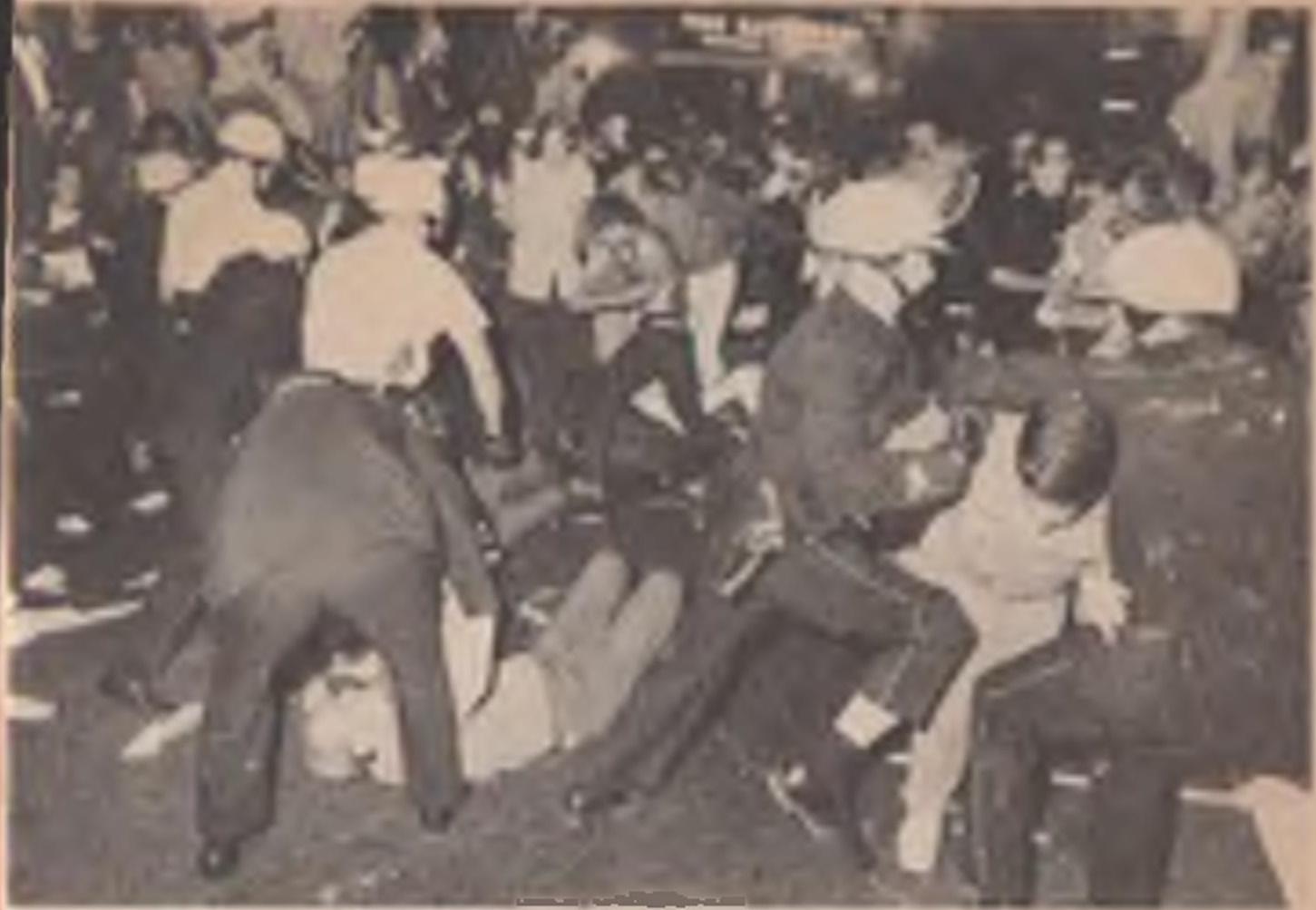
PHOTO: U.P.I.
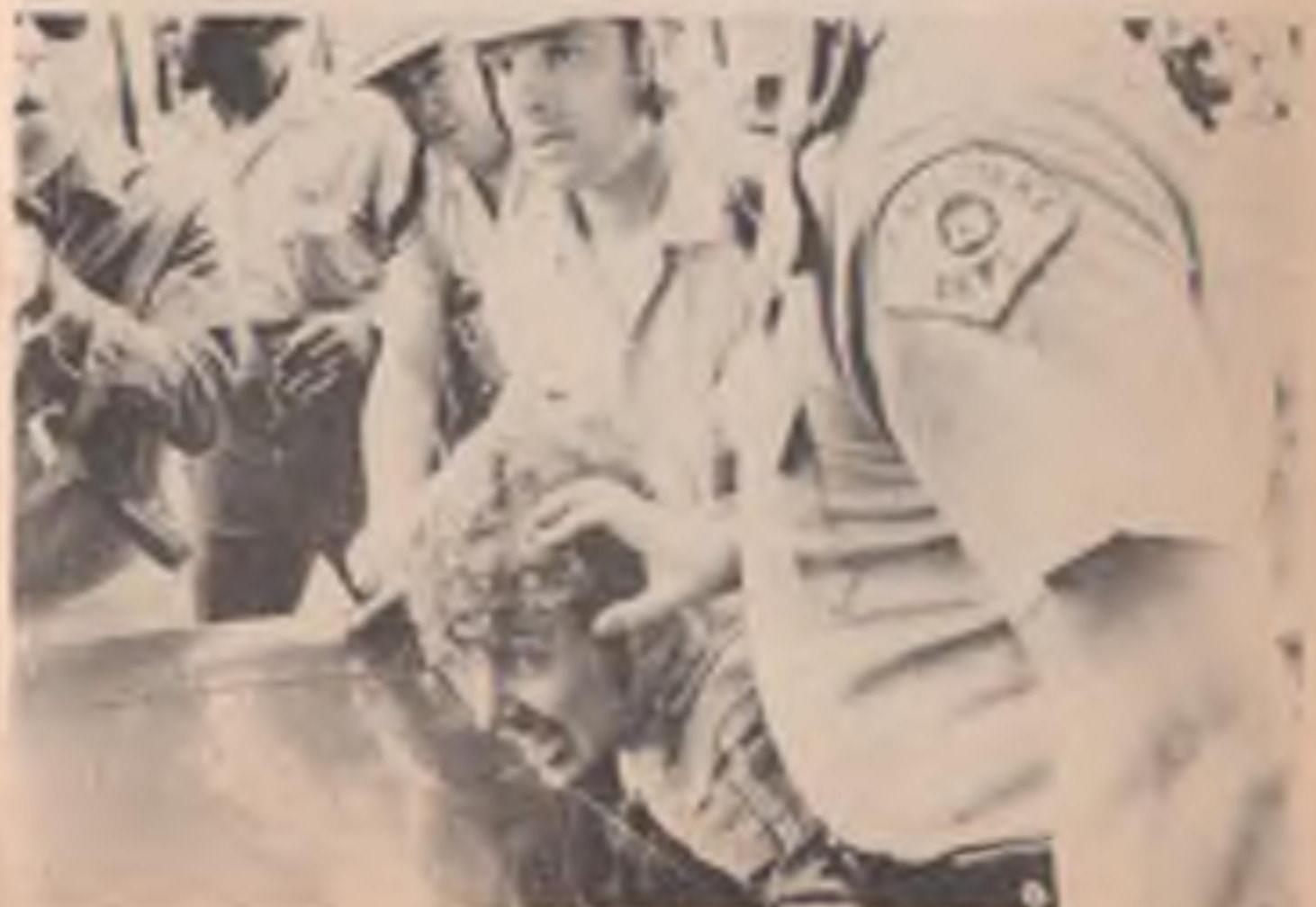
PHOTO: U.P.I.
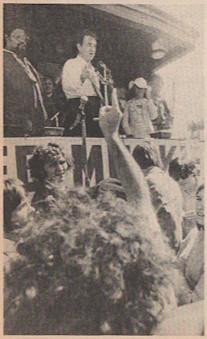
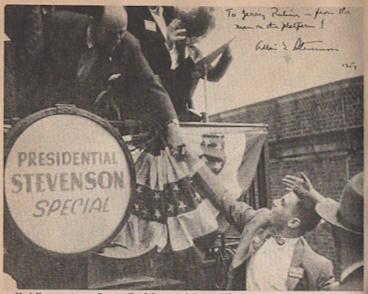
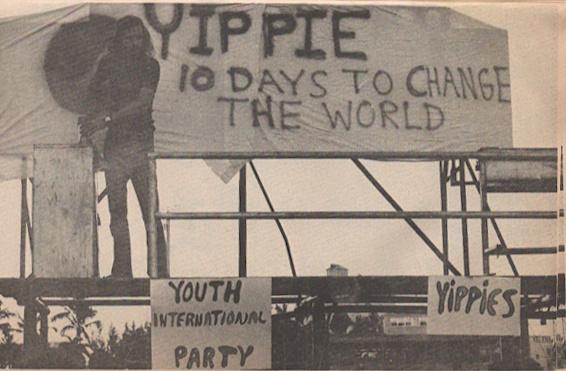
PHOTO: MICHAIL KELLERMAN
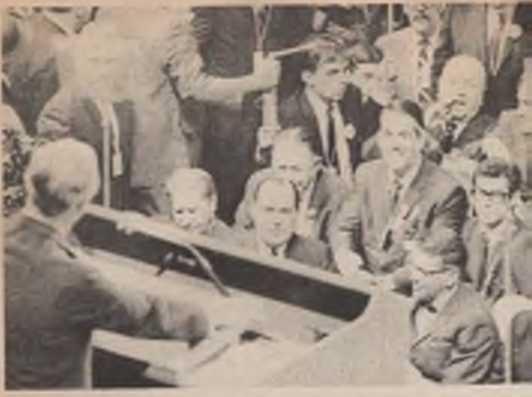
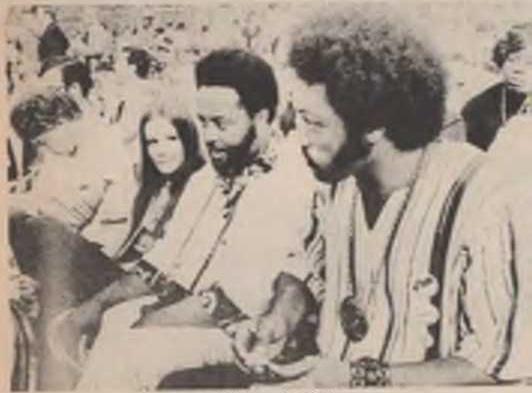
PHOTO: U.P.I.
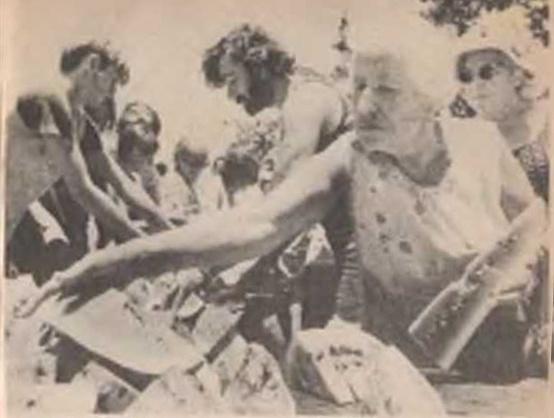
PHOTO: WIDE WORLD
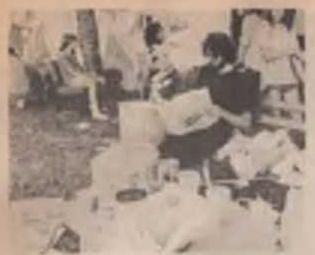
PHOTO: U.P.I.
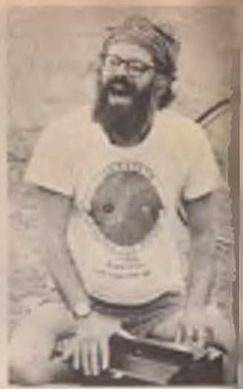
PHOTO: JILL KREMENTZ
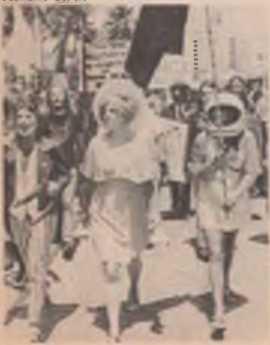
PHOTO: U.P.I.
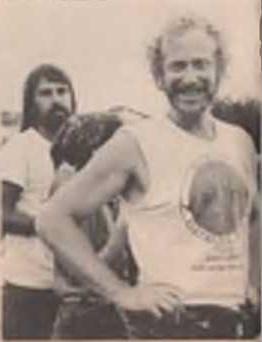
PHOTO: PETER KENNER
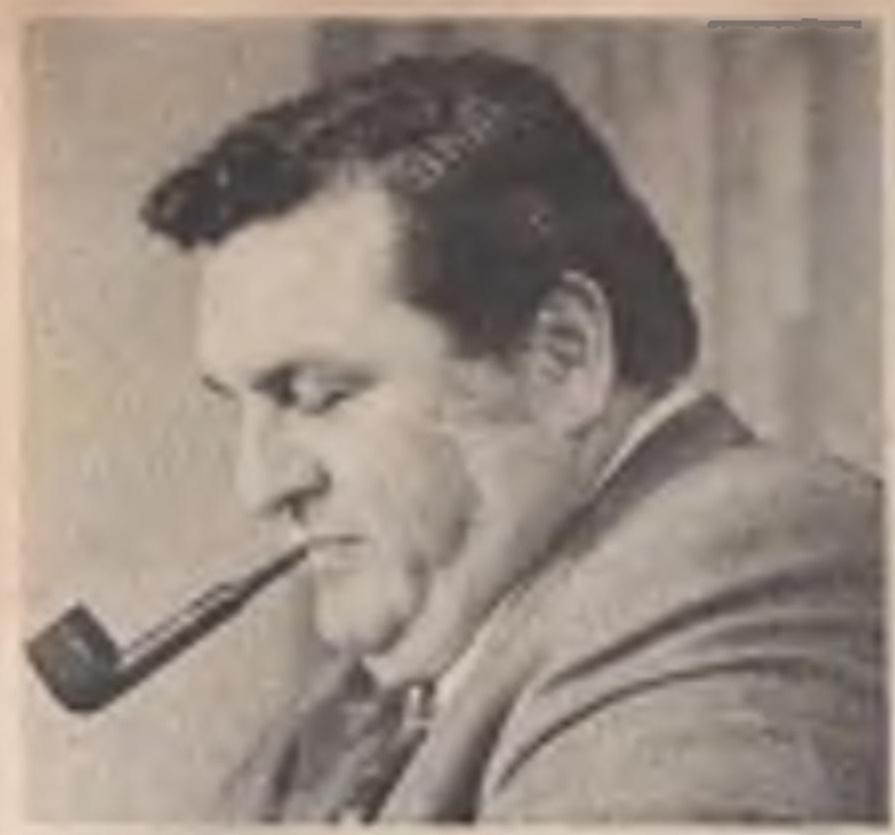
PHOTO: KIN LIGHT
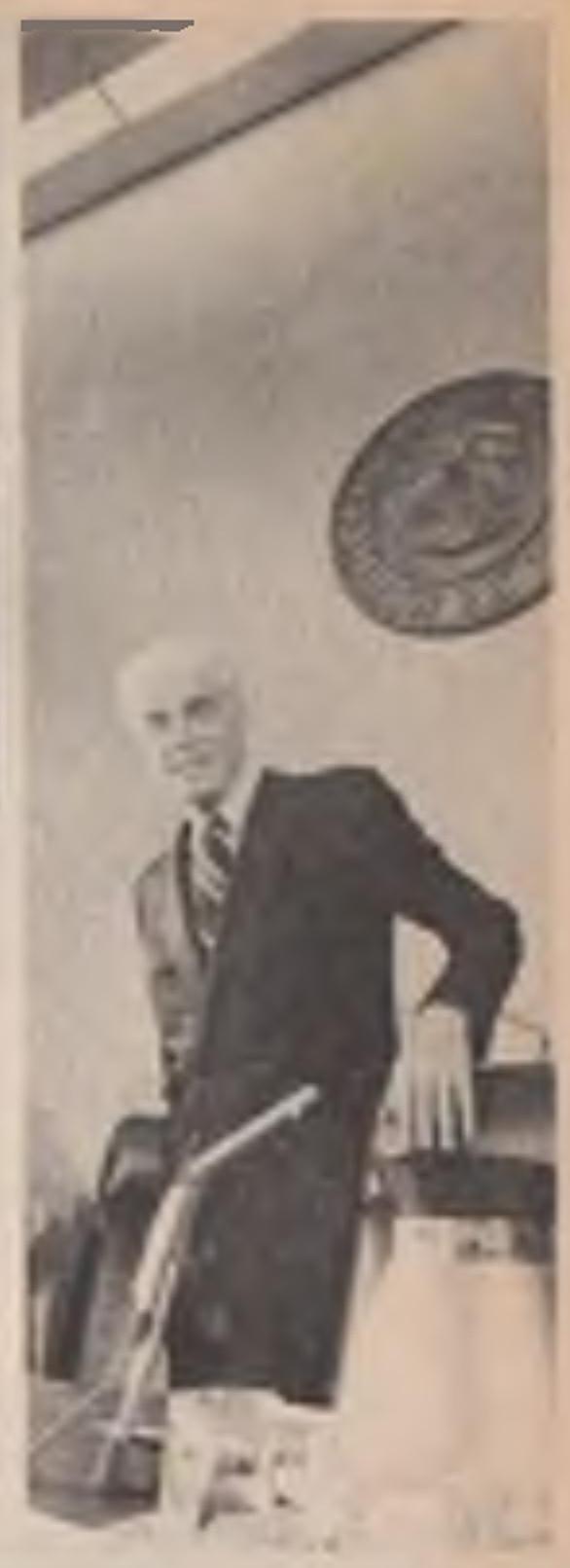
PHOTO: KEN LIGHT
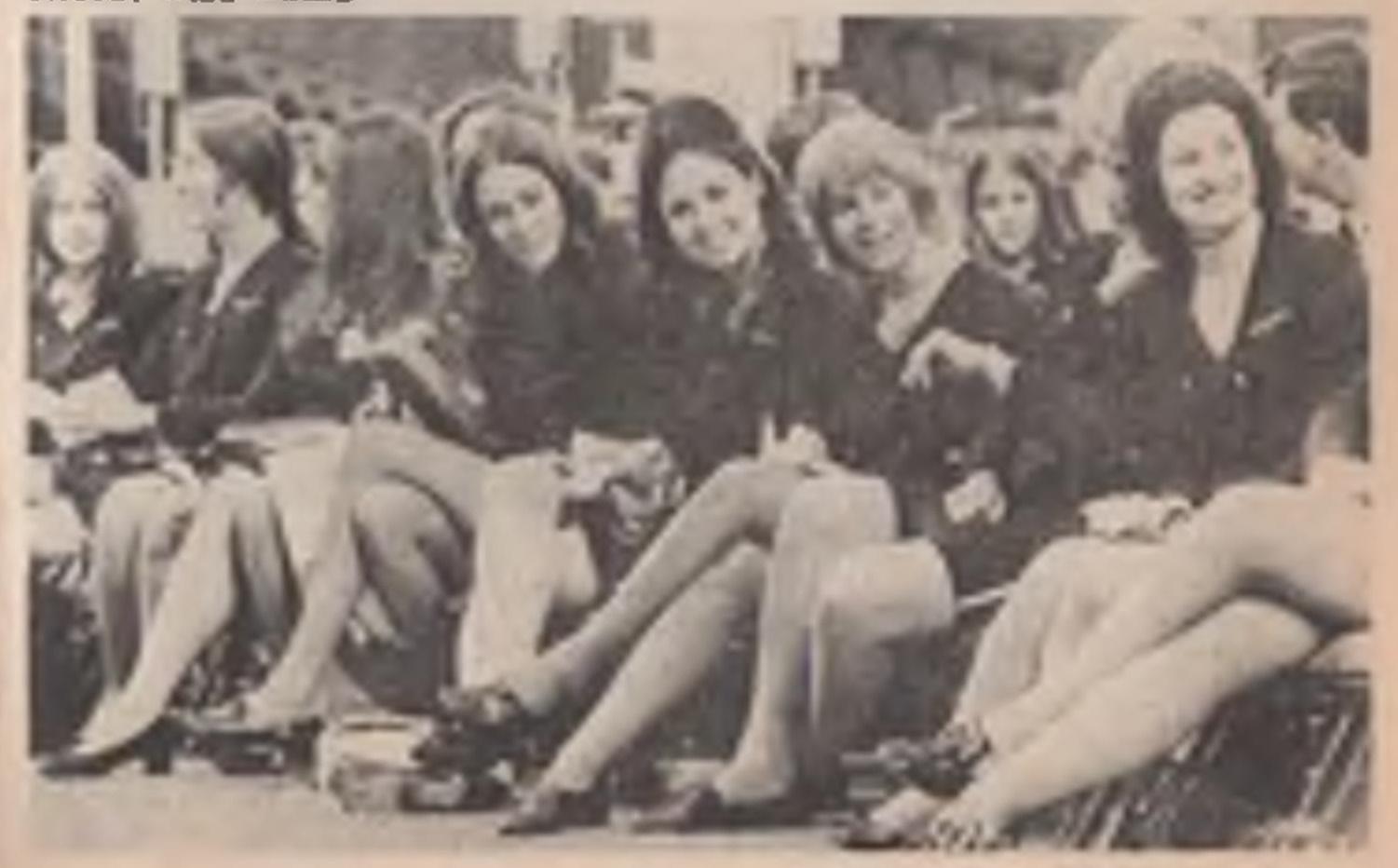
PHOTO: WIDE WORLD
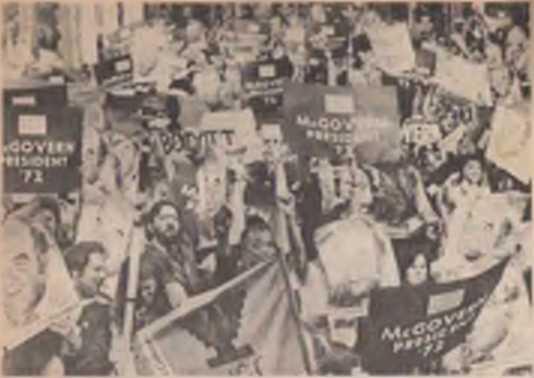
PHOTO: U.P.I.
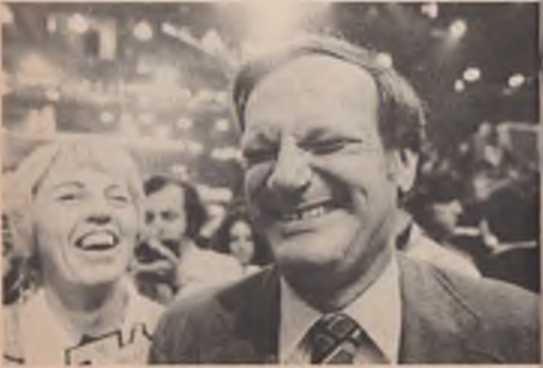
PHOTO: OWEN FRANKEN
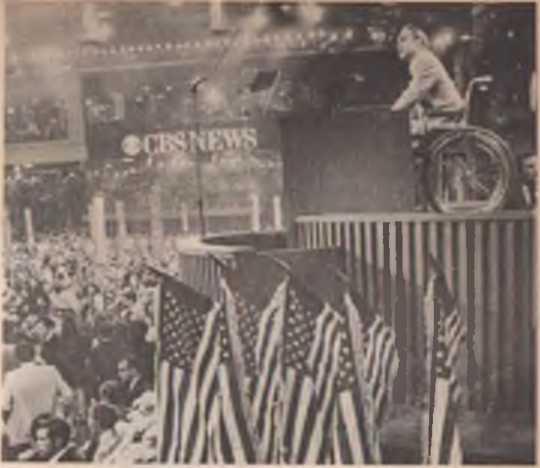
PHOTO: U.P.I.
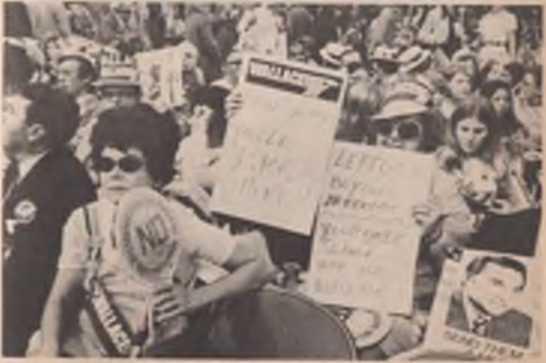
PHOTO: JIM KREMENTZ
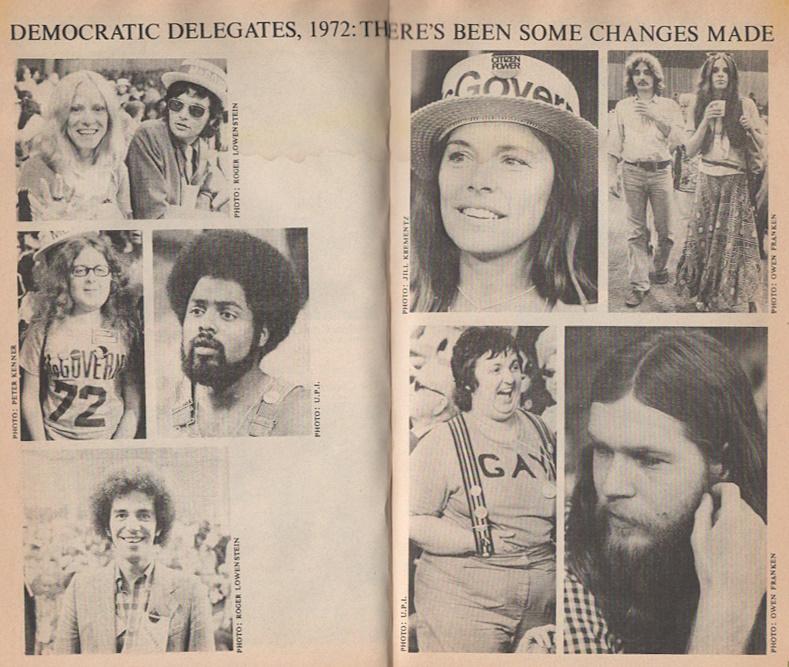
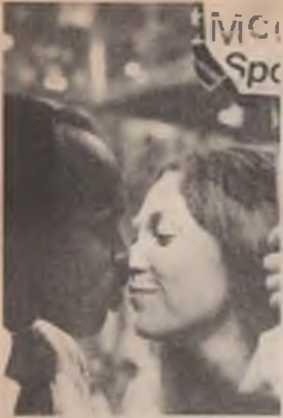
PHOTO; OWEN FRANKEN
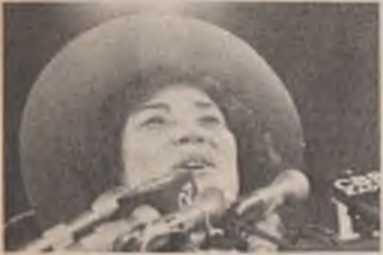
PHOTO: PETER KENNER
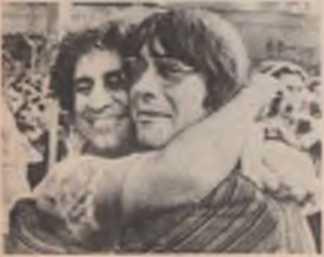
PHOTO: WIDE WORLD
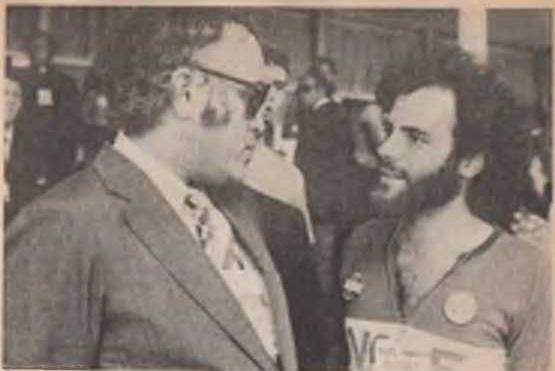
PHOTO: PETER KENNER
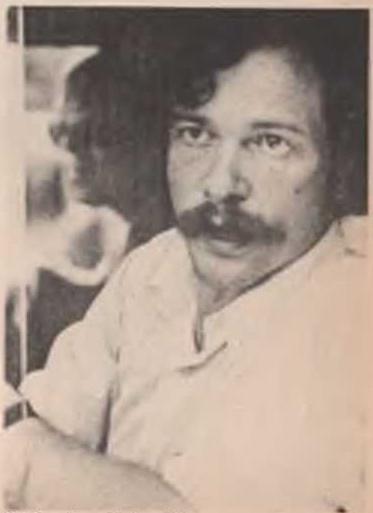
PHOTO: LARRY SLOMAN
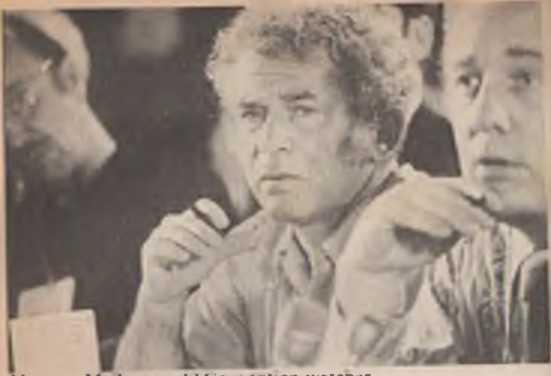
PHOTO: PETER KENNER
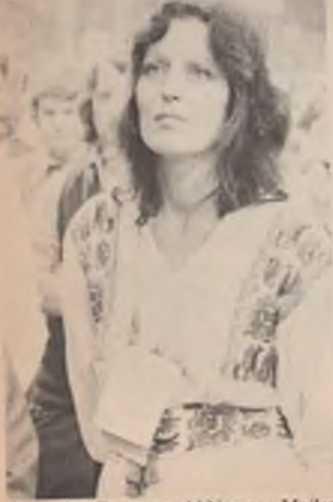
PHOTO: ROGER LOWENSTEIN
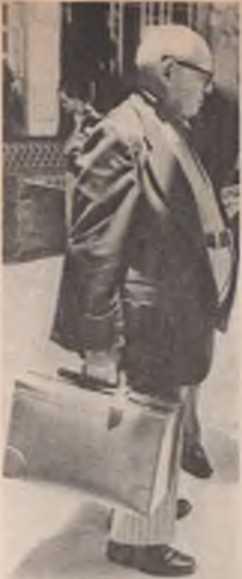
PHOTO: WIDE WORLD
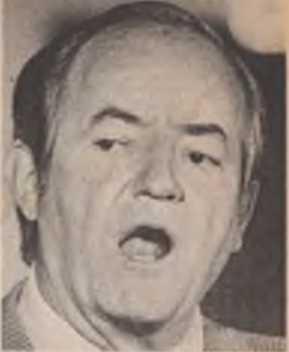
PHOIO: OWEN FRANKEN
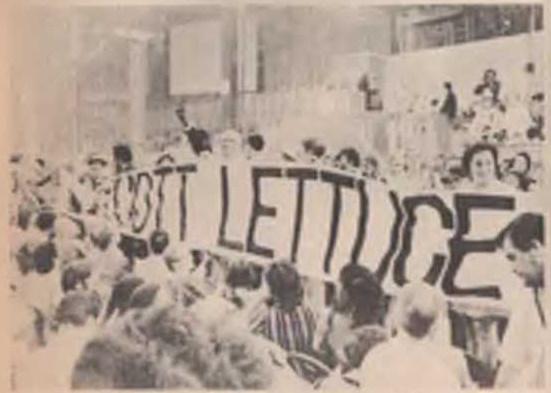
PHOTO: U.P.I.
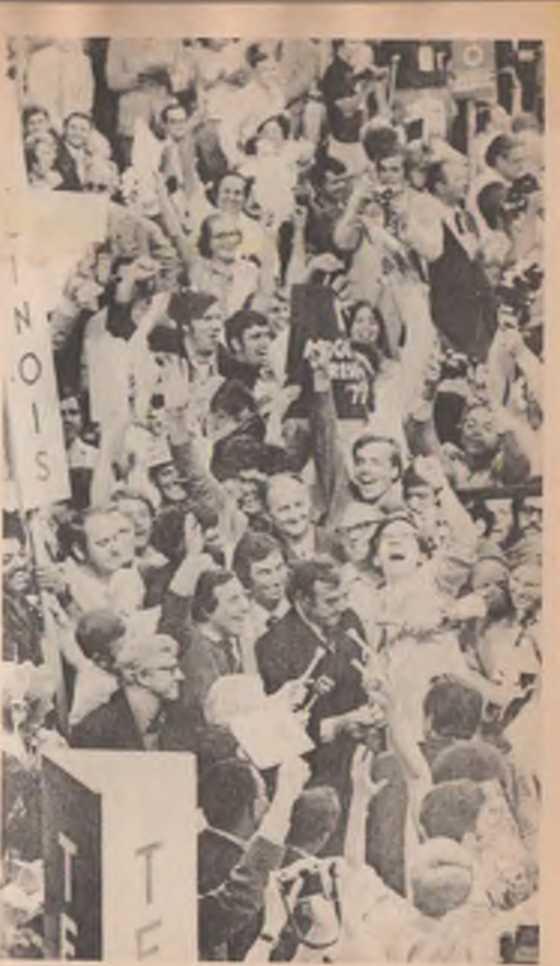
PHOTO: U.P.I.
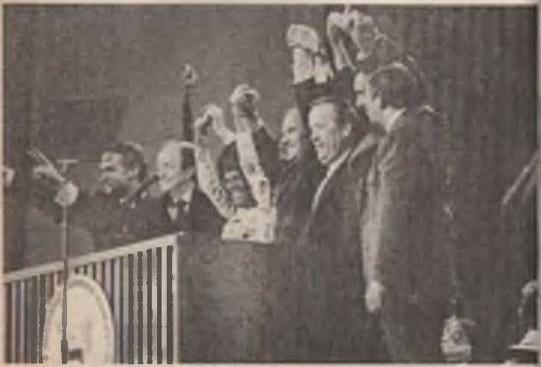
PHOTO: PETER KENNER
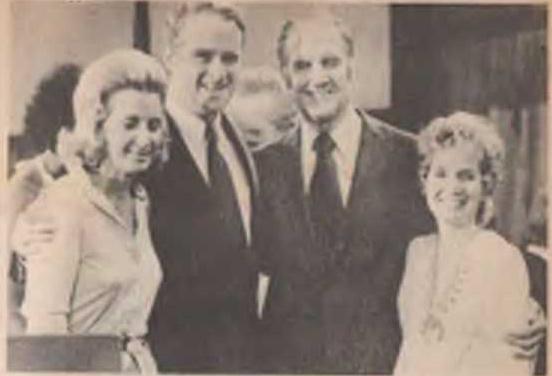
THE TOM EAGLETON STORY
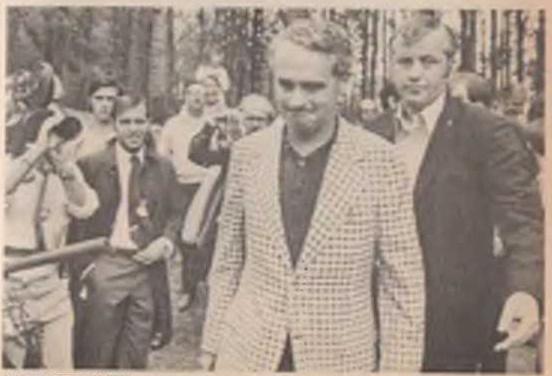
PHOTO: HOLLY BOWERS
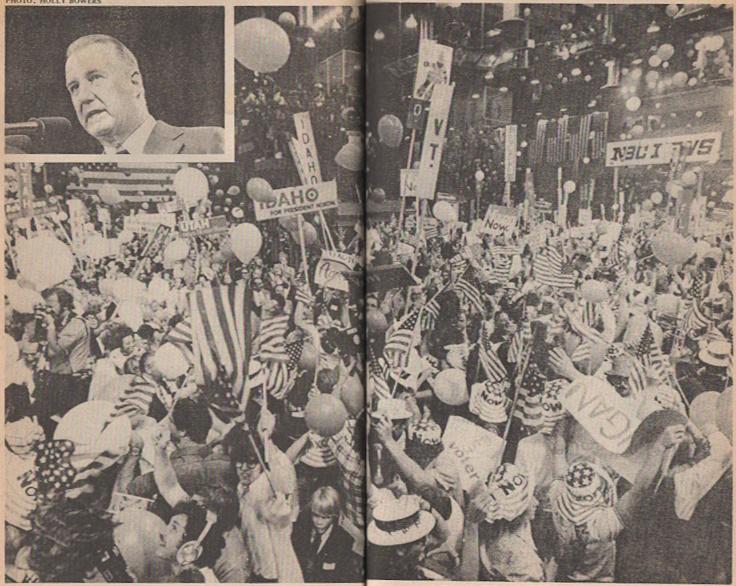
PHOTO: U.P.I
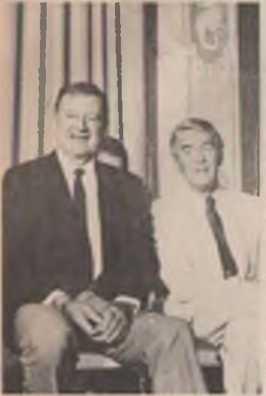
PHOTO: U.P.I
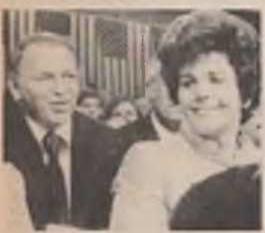
PHOTO: VELOCITY
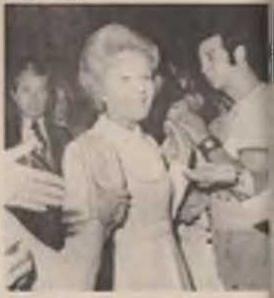
PHOTO: U.P.I
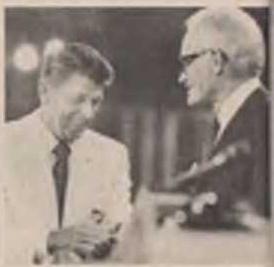
PHOTO: U.P.I
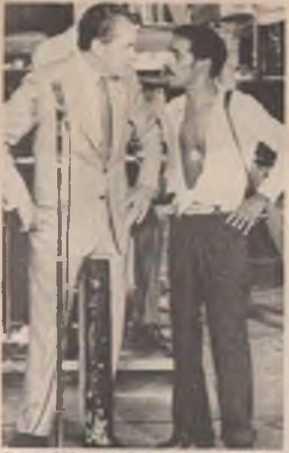
PHOTO: U.P.I
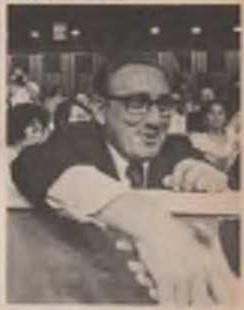
PHOTO: U.P.I
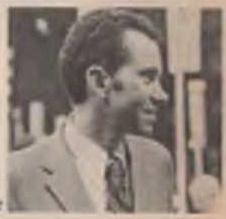
PHOTO: HOLLY BOWERS
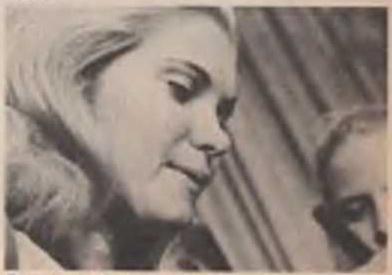
PHOTO: HOLLY BOWERS
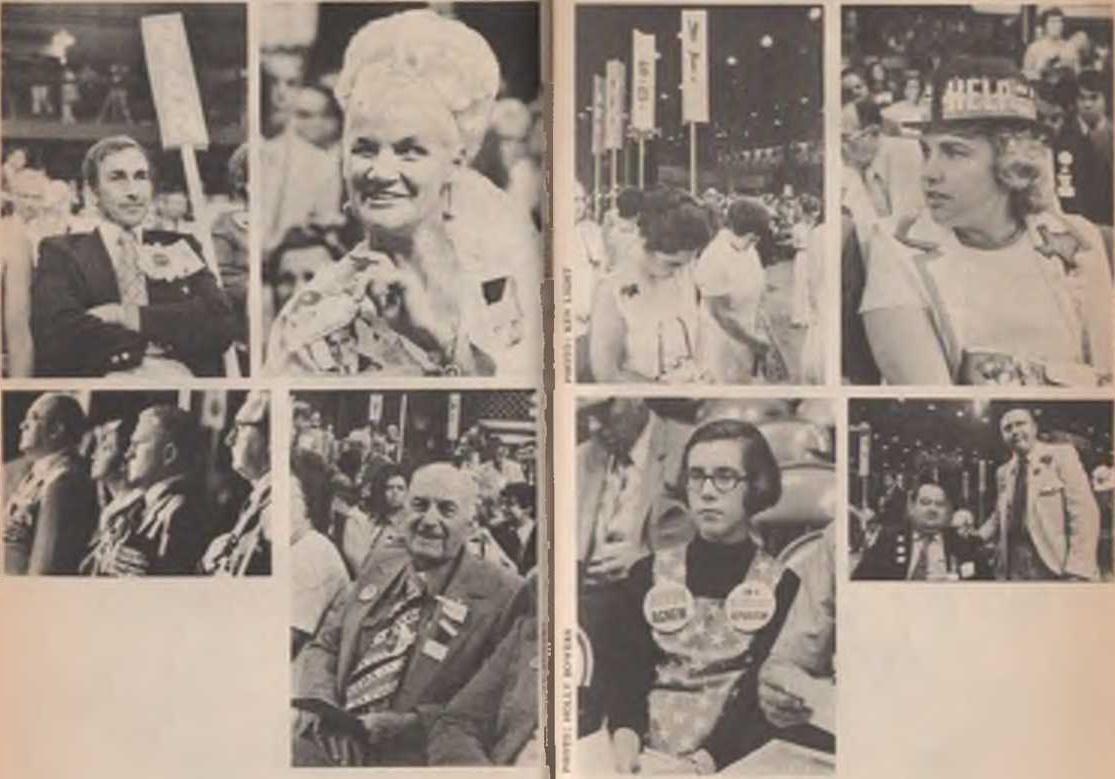
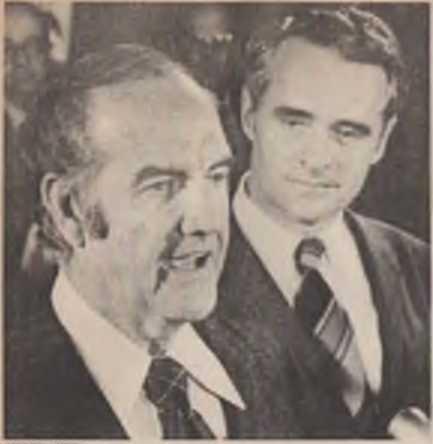
THE TOM EAGLETON STORY (continued)
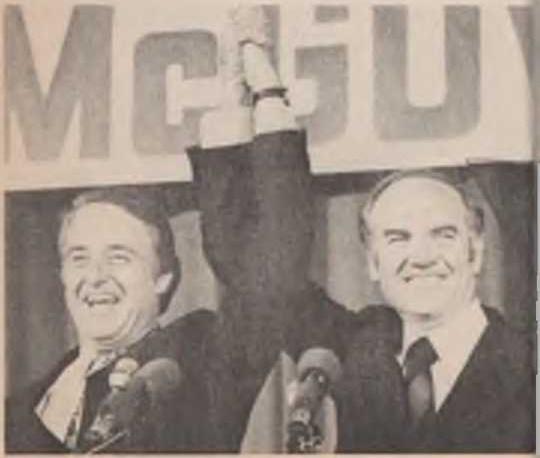
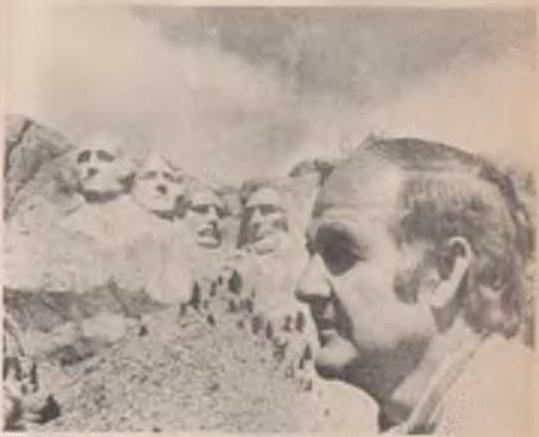
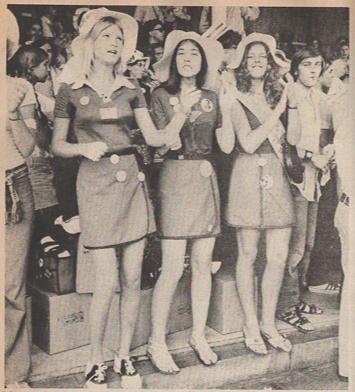
PHOTO: JILL CRAEMENTZ
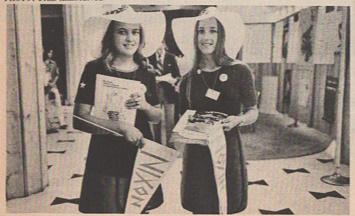
PHOTO: JILL CRAEMENTZ
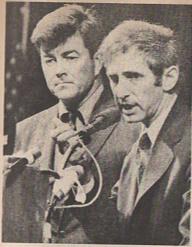
PHOTO: U.P.I.
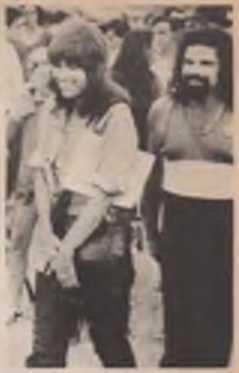
PHOTO: U.P.I.
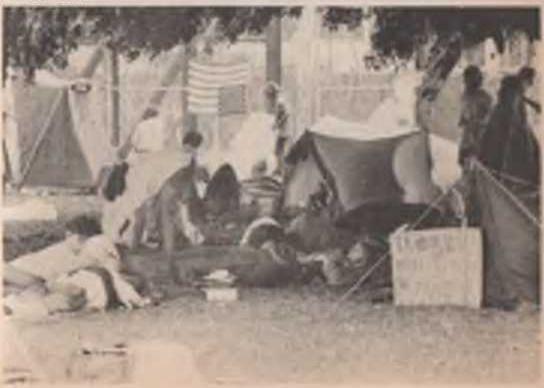
PHOTO: U.P.I.
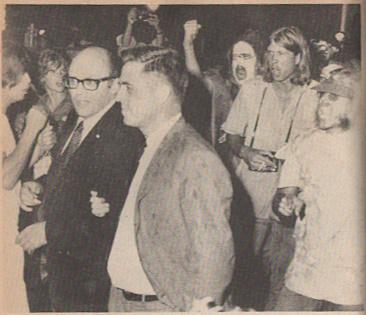
PHOTO: U.P.I.
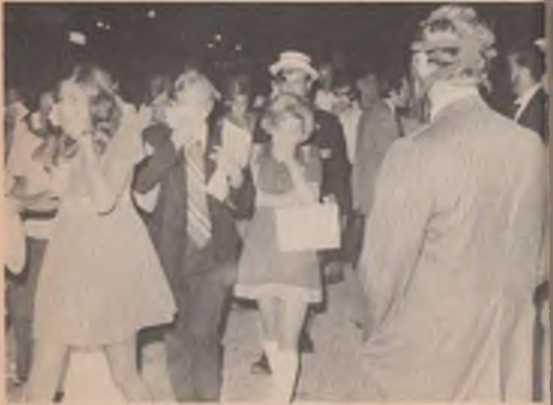
PHOTO: U.P.I.
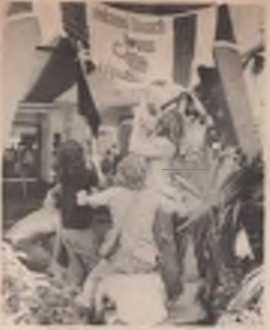
PHOTO: U.P.I.
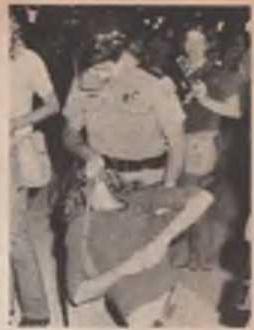
PHOTO: U.P.I.
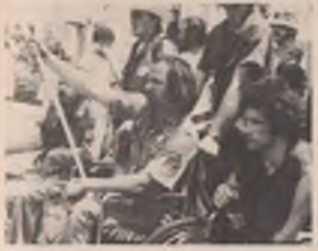
PHOTO: VELOCITY
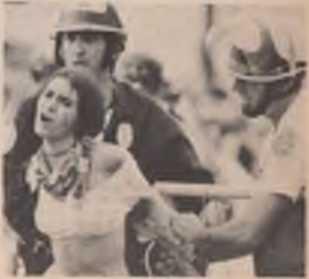
PHOTO: U.P.I.
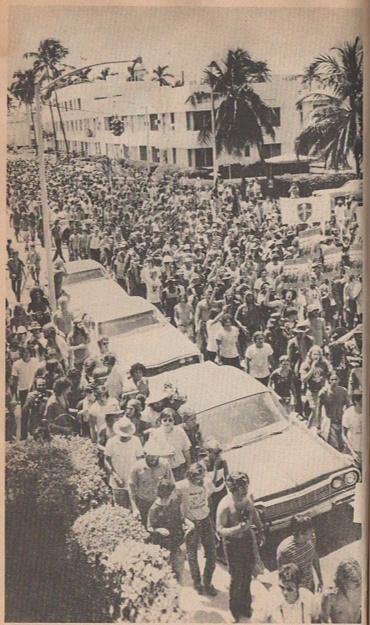
PHOTO: U.P.I.
[Image Gallery Ends]
The campaign against Nixon will require the patience of all of us who seek more rapid change, more decentralized decision-maid ng, and less emphasis on the support of the old guard and catering to special interest groups.
The defeat of Nixon alone will be miracle enough for the year.
Who among us is exuberant about four years under a Nixon unrestrained by the limitation of having to face re-election, with a Spiro Agnew waiting patiently in the wings to render an eight-year encore? Think about it!
The day the kids abandoned McGovern
Wednesday, the day of McGovern’s nomination, the McGovern bubble burst. McGovern has sold out. The word spread like wildfire.
It began with an article in The New “York Times saying that McGovern told a group of P.O.W. wives that as President he would leave a residual military presence in Thailand to pressure North Vietnam to return P.O.W.’s.
A meeting called of grassroots McGovern workers to protect their power now that McGovern was near victory, resulted in 500 people complaining so much that Gary Hart, McGovern’s campaign manager, had to come down to soothe tempers and calm fears.
Wherever you went on Wednesday, McGovern supporters pulled you aside to say: “It’s impossible to get near McGovern anymore. McGovern is softening bis position on the war to bring the old guard back into the party.”
“They don’t need us anymoreF
“They don’t need us anymoreF
“THEY DON’T NEED VS ANYMOREF
Impromptu meetings broke out all over. Every hour the rumors got worse and the attacks on McGovern and his staff increased.
A rebellion was brewing.
Kids from Flamingo Park marched to the Doral Hotel where they seized the lobby and began a disruptive sit-in, jamming the lobby with press and demonstrations. The hotel called the police but McGovern forced the hotel to send the police away. It was 1968 again. McGovern’s day of nomination, his moment of glory, looked mined.
If Nixon were here, he would Order clubbing and teargas to drive the demonstrators away. He is strictly a “spare-the-rod-and-spoil-the- child” disciplinarian. McGovern would be dead if he tried rough stuff.
Some staff members even took the bullhorn to give anti-McGovem raps and then sat down in the middle of the demonstrators.
The demonstrators were refusing to give up the hotel until McGovern came down personally to face them and answer questions.
If McGovern failed to settle this demonstration, how could he unify the country?
How could he be nominated while his hotel was under siege from anti-war protestors?
How was he going to handle the rebellion in his own ranks which threatened to break out on the Convention floor and destroy his whole organization?
McGovern came down to the lobby in his shirtsleeves, against the advice of the Secret Service, to speak to the demonstrators.
In the 1960’s, college deans lived in mortal fear of having to face an S.D.S.-Yippie-type crowd.
McGovern faced that fear—and won.
He re-emphasized his commitment to leave Indochina and Vietnam, and tried sincerely to answer other questions amid cries of “Bullshit” and boos and a lot of clapping, and then he left.
Maybe it was a snow job but he won our hearts that night.
The demonstration broke up.
The hotel was cleared without the need of a single cop.
An hour later the McGovern office released a mimeoed statement announcing McGovern’s position that he would evacuate U.S. forces from Thailand as well as Indochina. McGovern representatives said that he never made the original statement about keeping troops in Thailand. Some reporters insisted they had heard it.
The new McGovern statement quieted all fears, turned frowns into smiles.
At night the unwanted realized: “They need us. We are their only chance of winning. They won’t have Nixon’s money. They won’t have top labor leaders support or the support of much of the regular Democratic Party. The only power is in us—the door-to-door workers—going all over this country, talking to people, and bringing out the votel”
We danced the hora in the aisles that night as soon as McGovern was nominated.
That day gave us our deepest respect for this people’s army. They were principled—ready to drop their candidate in a minute if he betrayed them on Vietnam. We talked to more than a hundred delegates who were willing to commit civil disobedience inside the hall itself.
They were not George McGovern groupies.
George McGovern was no myth to them.
They stood on principle, not on personality. A new chapter in American politics.
They are the new radical force in America, suspicious of victory, living by principle, willing to serve the people.
McGovern is People’s Power
“How can I trust McGovern?” a friend was asked the other day.
“Trust a man by the enemies he makes,” he replied. “If he’s got the right enemies, he’s got to be good.”
McGovern has the best enemies, going from Richard Nixon to George Meany.
The hostility of Meany to the McGovern campaign is a blessing in disguise.
It is great.
No longer will we have to think of George Meany as the gateway to the working class.
We are forced to go around the leadership and speak directly to the workers.
Out of the McGovern campaign, new organizations will form to challenge permanently the oligarchic powers of the Meanys and the Daleys. Whether McGovern wins or loses, the old guard will never regain control over the Democratic Party. The work to be done to elect McGovern will produce grassroots organizations that will live on past November.
If no New Politics movement is under way in your community, why don’t you call together some people and start one?
If no candidate with your politics is running for a key political office in your home town, why not you?
It’s easy to get things going. Campaigning for public office is unquestionably the best way to learn how power is distributed in this society. Don’t pooh-pooh power. Each pooh-pooh puts another drop of the stuff in the pockets of those who already have it
What’s important is the movement, more than the campaign. What the movement represents is PEOPLE POWER.
To be truly successful in terms of winning the election and changing America, the organization must become a guerilla army, working for love not money, depending on volunteers, hoping to win on personal contact with voters. Its power lies not in influence in high places, but in the million hours of work done by the thousands of nameless people.
The power must come from the bottom up, from the people to the organization to the candidate.
The goal is to register every voter in America before election day to vote for McGovern.
Begin with your parents.
Sharpen your arguments.
Learn about the needs of people. Have an answer for every question.
Listen to the people. Acknowledge mistakes but return to the major distinction: Nixon is the candidate of the rich corporations. Bang home that point.
If the voters get to like you, they’ll get to like the candidate you support.
Radicals have won four seats on the City Council in Berkeley and two in Ann Arbor, 127
Michigan The McGovern movement is the coalescing of hundreds of local movements for local power.
The McGovern movement will stimulate many more grass-roots organizations moving for local control of City Councils, school boards, Sheriffs’ offices, Congressional seats.
A nonviolent, grassroots, democratic upheaval is taking place in America. There are hundreds of radical candidates running on local levels. 1972 will point a new direction in American political life. Whether McGovern wins or loses, a significant wave of change is going to sweep into power. By 1976 it can build to an ocean of experimentation and change.
McGovern’s movement is not a revolt by the poor or the workers themselves. It is no revolution of the oppressed. It is a philanthropic movement of moral indignation and unemotional business-military realism: The only way to save America is through accepting a new national self-image and role.
By rearranging priorities.
By stemming decay and despair.
McGovern’s movement is an example of college and high school students, liberation people, and the country’s intellectual elite, going to the people on a political crusade.
We can function as the catalysts for change.
We are not change itself.
For that the people must move.
Missing from the Convention floor were workers from Italian, Irish, Polish and other whiteethnic backgrounds.
McGovern must reach these people if he is to be the bridge between the anti-war, middle- class movement and the working class.
Our lifestyle prevents us from reaching some older workers.
There is no need to change our lifestyle.
McGovern verbalizes radical thoughts in an unoffending Middle-American small town tone. He Americanizes social change. He knows the workers are losing most from the tax and military structures.
Our two parties are polarizing into class parties. The Republican Party is the military, the big economic corporations and Wall Street. The rich buy votes, decisions and power. They manipulate the people with carefully-researched advertising campaigns.
Nixon. Agnew and other Republican leaders are really “front men”—actors—who cover for the invisible rich who control America through the Republican Party.
When is the last time you saw the head of a large corporation interviewed on the news?
Name 10 business leaders in America. You can’t—because their faces remain hidden.
The Democratic Party may become the party of the poor, the young, students, women, young workers, senior citizens, blacks, Chicanos, hip capitalists, or maybe we will have to build a wholly new party. It is a tenuous and volatile coalition because it must address itself to so many needs.
It does not seem likely that the Democratic Party will be big enough ideologically for both the McGovern and Wallace movements.
It is a matter of time before one leaves.
McGovern’s task is to convince the frightened Wallace supporters that big government and big money are their enemy—not black people.
Nixon and McGovern will both compete directly for the Wallace people. Nixon will try to make the issue busing, seeking the anti-black vote.
McGovern must try to make the issue taxes, the war and bureaucracy.
Who wins will decide whether the next ten years in America will be a nightmare or the beginning of a possibly-achieved dream.
The Grand Climax
To show you how giddy, strung-out and ecstatic it all got by the time balloting for Vice- President rolled around, the podium announced that Mao got seven votes from Oklahoma (later corrected), Jerry got one vote from Gail McFarland of conservative Suffolk County in New York, Archie Bunker and Roger Mudd scored well, and no one gave a second thought to the nomination of Tom Who?
The Convention ended with rousing speeches by Ted Kennedy and George McGovern. Kennedy mesmerized the hall. He began by addressing the multitude, “Fellow lettuce-boycotters.” He’s more radical than McGovern, but ...
Kennedy as Presidential candidate would rely less on people power and more on expertise, money, fame, efficiency, media glamour, top- down organization.
He would not need an army of grassroots volunteers going door to door for him.
He would keep Daley and Meany in centers of power.
He would announce for President and duck.
McGovern concluded with a call for America to come home. “For this land is my land, this land is your land.” A quote from an old popular folk song.
A bit schmaltzy for a generation that has plugged its guitars into 16,000-watt amplifiers.
Still it is no ordinary folk song, for it was penned by Woodie Guthrie.
Arlo’s old man, as everyone knows, was an honest-to-goodness People’s Commie, who sang his songs of protest from street rallies to union hall meetings throughout the 1930’s.
In Okema, Oklahoma, Woodie’s home town, they still refuse to honor the country’s most important troubadour, but here in Miami Beach at a national political convention, the Presidential nominee felt at ease with him. In 1976 they’ll be quoting Street Fighting Man and Volunteers of America.
The acceptance speech was followed by the traditional patriotic songfest, with a nod of mod acceptability to youths when Gladys Knight and the Pips heralded, “United we stand, divided we fall,” and spontaneously the audience burst into “We shall overcome,” many swaying with arms crossed in that manner so familiar throughout the past years of protest
* * *
While hesitating whether or not to join in the singing, thoughts danced through our heads:
Remember 1952 when Adlai Stevenson lost to Ike?
McGovern is like Adlai, moral and idealistic. Are the American people more ready now for an inspirational leader who will educate them?
The villain is still the same: Nixon.
From 1952 to 1972.
“You won’t have Nixon to kick around anymore,” he once announced. Now he’s kicking us around instead.
Remember 1963 when we climbed aboard Polaris submarines with “Ban the Bomb” signs?
Remember 1964 and marching through the mud of Mississippi racism?
Remember 1965 when we were at Berkeley, stopping troop trains bound for Vietnam?
And 1967 when we attempted to change the world by handing a flower to a cop?
And 1969 when we tried with a rock, and 1970 with bombs?
Remember how those actions shook America? Remember how many heads were broken, jail terms served, in years of ecstasy, discovering and suffering to convince Senators, Congressmen, people that the war and racism were immoral? Remember when we were all alone outside in the dark of night, running from some charging squad of police, our lungs and eyes burning from gas?
And now we looked around the packed aisles with the noise overwhelming to the ears, so much energy packed into one space, and finally experienced the realization of what was and is happening.
Daley couldn’t get on the floor if he wanted to. This was a Democratic Convention without a Kennedy candidate, without Averell Harriman, without James Farley, without LBJ, without George Meany, with few Senators, Congressmen and Governors as delegates, without Kings and King-makers, without puppets and puppeteers— and with only a couple of backroom deals.
It was a Peoples’ Convention.
“We Shall Overcome” sung on the boardwalk of Atlantic City in 1964 by civil rights workers ending a summer campaign of freedomfighting throughout the South; sung in Crant Park, Chicago four years later by blood-splattered anti-war protesters; the song now boomed out in waves of emotion across the vast Convention Hall.
From the outside to the inside in less than a decade. There was no reason to despair the possibility to change the system. If you can re-make a Convention, why not a community? Why not a city? And finally—why not a whole country? Ten more years of struggle ahead.
The revolution’s far from over; ten more years and it will be won.
Red Star Over the White House
Cassie Mackin, the first woman floor reporter in television’s history, interviewed us as we stood among the Illinois delegation. We spoke calmly and rationally of our changing views and dubbed the Convention “the first step to a people’s democracy.”
New York Magazine estimates that the Democrats lost 250,000 votes from that interview. Guess you can’t win ’em all.
Each week since our endorsement, the Republicans make hay out of our support for McGovern. Spiro Agnew quips, “The Democrats are having troubles with their hotel accommodations; Abbie Hoffman was assigned a room with a bath.”
Each week the home organ for the Republican Party, First Monday, asks, “What sort of positions would Yippies Jerry Rubin and Abbie Hoffman hold in a McGovern Administration?”
Yippie-baiting has replaced Commie-baiting. The Nixon Witch Hunters of the 1950’s are reliving their youth.
Every hippie, every woman, every black has become suspect.
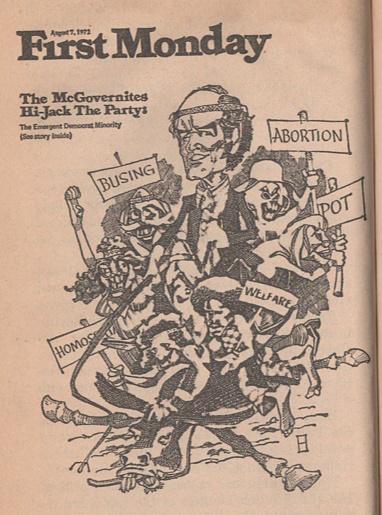
McGovern, as the cover cartoon on First Monday shows, is the captive of the crazy left.
The Left’s dream is the Right’s nightmare.
When the idea of us writing a book encouraging voting for McGovern came to us, we considered a number of titles.
Red Star Over the White House was the one we liked best. The cover would show a picture of the White House, a bright red star in the sky, and Gorgeous George’s beaming face in the center of the star. Spiro Agnew would take one look at it and come in his pants.
Unfortunately, the title was a total put-on. Nonetheless, this book will be used by the Republicans as if it had that title anyway.
* * *
McGovern may recognize Cuba, but he is not calling for the turning over of American-owned resources in Latin America to the peasants and workers who live there.
He is for protecting that power more discreetly.
Instead of blatant fascist regimes such as Brazil, McGovern would look for psuedo-demo- cratic movements that could better control their people while protecting American economic interests. McGovern is not opposed to multi-national corporations like I.T.T. or Shell Oil.
He has not declared total war on the American business empire which determines 90% of American foreign policy.
McGovern advocates a redistribution of some income from the rich to the poor, but he defends capitalism and attacks socialism. He would still leave most of the control of this country’s wealth in the hands of the few powerful corporations.
McGovern would demoralize the military and bring America into the modem world with his program for economic conversion, but power and control would remain the same.
The workers of America would still work for the owners.
Black people would still suffer at the bottom of the barrel.
The values of capitalism would remain because the basic structure would be left in tact.
McGovern has talked about credibility, and honesty, but he has not tried to re-educate the American people on issues like marijuana, abortion and a guaranteed income.
Estimates range from 25–30 million concerning the number of people who have tried pot According to the recent Gallup polls, a majority of people faoor legalized abortion. The $6500 guaranteed annual income makes more sense than giving $1000 to everyone. It allows for a redefinition of our goals as a society and says distinctly, “there will be no more poor.”
McGovern backs off in attacking the failure of our educational system, the corruption of the each-man-for-himself philosophy, and the inherent racism that’s part of the American character.
McGovern is a real alternative to Nixon. An alternative within a two-party system that we still consider rigged.
He in no way is “our” candidate.
Although the choice between McGovern and Nixon is a choice between a humanistic America and one that is not, McGovern is no bargain.
He has not yet involved blacks, other Third World Americans, and Women’s Liberation activists in positions of power in his campaign.
At best, he is philanthropic and generous, and as the campaign moves toward November he will begin to rely more and more on the old guard.
The only way black people and women will free themselves is by taking control over the structures and values that determine their lives. McGovern will not make the revolution demanded by blacks, Indians and women.
McGovern opposes American support of undemocratic governments like Thieu in Vietnam, but he does not oppose imperialism—the domination and control of the economic resources of much of the world by the United States.
Because more Jews than Arabs will vote in the November election, McGovern has volunteered to be the first American President to go to Israel.
As President, McGovern would seek to protect American oil interests in the Middle East and support Israels militaristic solutions to their problems in dealing with the Arab world. Lasting peace demands nationalization of the oil resources, and a Semitic federation that would act with regional objectives benefiting both Israel and the Arab countries, rather than the superpowers.
McGovern fails to articulate a national health program which is, in effect, socialized medicine —no matter what one chooses to call it. The particular needs of the cities, already turned into Clockwork Orange nightmares of ultra-violence and ultra-despair, need much more emphasis. In effect, McGovern should tighten his campaign, sharpen his views and move more to the left.
It is perhaps his only hope for victory. Certainly with such a campaign, even if the election were lost, McGovern would be absolved by history, and would win in 1976 under an even more radical program.
As President, McGovern would be a humane imperialist and a generous capitalist
He is a sincere man.
As the choice against Nixon, it is a choice between sanity and madness. But should McGovern win, he will find himself in contradictions— contradictions that will provide revolutionary opportunities for the people.
It will be impossible for America to protect its economic domination of the world without militarily supporting puppet governments.
Middle-road solutions exist in fantasy.
The local bourgeois is too weak in the underdeveloped world. They have to rely on U.S. military aid.
Since McGovern will vacillate in his support of the CIA and the American military, liberation movements will be able to consolidate and go for power.
McGovern’s program for America will only heighten tensions by spreading hope.
Poverty cannot be eliminated until corporate power is broken and taxation is rearranged. Revolutions occur when there is taxation without representation.
McGovern can begin to educate people about tax loopholes, phony foundations, business “incentives” and the like. But he cannot bring about a society that eliminates poverty. For to eliminate poverty, you must eliminate great wealth.
Since this is impossible, McGovern will only increase expectations. History shows that sometimes revolution takes place when tilings get slightly better, not worse.
The further McGovern goes as President, the greater the chances of an American military coup.
The greater the distance McGovern wants to go, the greater the conflict between his desires and his refusal to build anti-capitalist, anti-imperialist consciousness among the people.
McGovern cannot achieve what he wants to achieve within the limits of his own program.
The value of McGovern is that he will set America in a new direction.
He will threaten the military and the very rich, and give hope to the poor.
He will increase optimism for change in the society at large.
But the main question is what will happen when McGovern inevitably fails—by moving to the right or by failing to solve the problems of America.
Then the people will experience a rare education about the limitations of capitalism and imperialism, and will push further.
The break-up of the American Empire is inevitable. It’s economic system was built by and for a century gone by.
A communal world of shared power and resources lies ahead.
Famous in Flamingo Park
When you meet famous people you generally are impressed by two things—they are quieter and a lot shorter than you expected they would be.
For some reason, when you become famous, you are attributed with physical and psychic powers you often don’t possess.
When you become famous for taking on authority, the powers you are attributed with become exaggerated beyond comprehension.
The first day in Flamingo Park an incident happened that totally wrecked us:
We are walking along when a guy who is badly crippled recognizes and grabs us.
He begins sobbing hysterically about how he has been injured in Vietnam and has come a thousand miles to see us, for surely we, of anyone he knows, can help him out of his misery.
We are not alone in the park. As we talk, flashbulbs are popping, a dozen microphones begin their cobra-like sway from his mouth to ours and back. It’s clear what’s becoming expected. Everyone’s expecting a little old faith-healing. A Mar- joe miracle or something.
What the hell are we doing here?
It’s very hard to retell that incident. It brings a lump to the throat.
The situation was complicated by the press, but more importantly by the mention of Vietnam.
Young kids grabbed us all the time in Flamingo Park. “We re gonna wreck this place tonight, aren’t we?”
Many young lads came to Miami looking for the world they read about in Do lit and Beooln- tion For The Hell Of It. They were living in 1972 but their dreams were of Chicago, 1968.
They wanted us to lead them in face-painting and rock-throwing sprees.
When we didn’t, their love immediately turned to hate: “Fink! Chickenshit! Sellout!”
We originally came to Miami Beach as part of a collective leadership of 15 people, hut the authorities and the media refused to allow us the flexibility of fading into a collective.
At City Council meetings, even if the “super- stars” never spoke, which we rarely did, we would be photographed, and some clever narrator would comment on the evening news about our shrewd leadership abilities, “proved” by the fact that we remained quiet.
The pressures of the press and the authorities, and the assumption of leadership, can lead to absurd situations.
Not only do people make impossible demands on you, hut you are constantly being followed, tapped, investigated, infiltrated, hounded by police.
No matter what “actual” role we played, our myth was so strong that we would be blamed in Miami Beach and indicted if trouble broke out
At the Mayday demonstrations, there were 13,000 arrests. Even though Abbie attended no meetings, made no decisions, never even entered or called the offices of those who took on a leadership role, he was the only person indicted by the Justice Department for crossing state lines to incite a riot—a 10-year crime.
Stereotypes die hard,.
America thinks in terms of a leader and thousands of sheep-like followers, hierarchies of leadership.
“Gloria’s brigade.” “Rennie’s legion.”
The FBI tries to convince people that dissent is a conspiracy of a few top manipulators rather than a legitimate outpouring of grievances.
The media needs “personalities” to focus on to dramatize events and issues. Often reporters make up quotes when their editors insist on statements from us. A casual glance at articles written about the Convention reveals dozens of “interviews” fabricated. Time magazine, for example, has a few.
The movement, without funds and therefore dependent on the media to reach the people, must organize itself with symbols and media superstars to communicate with the people. America is the land of a million billboards.
“Give us a slogan and a pretty face.”
It‘s a problem for a grassroots movement trying to be collective and democratic to deal with the fame-reality of the press.
As a result those people in the superstar role are loved and hated.
They become movement scapegoats as well as heroes. They become victims of 1001 rumors growing in monstrosity as they pass from person to person.
Elitism is defined as someone famous who says no when asked to do something.
Folks become raw meat in the movement’s self-destructive habit of eating alive its leaders and fellow comrades. That occurs on all sorts of different levels and it’s why very few people stay active longer than a year or two. The enemy is always seen close by. Purging is a weekly activity. When a movement dies the purges become a daily matter. After all, when you cease to affect power in the society, the tendency is to fragment and make war on each other. The park was not the vanguard of a mass movement, but the battle zone for ideological street gangs.
w
It is hard being two people: yoprself and your image.
Living for your image means sacrificing your true self.
Living for your image means living for other people s expectations of what they need you to be. You cannot be street guerrillas forever in America- Every year people expect you to outdo the last, like shriekers at a bull ring.
Anything less is a sell-out.
Staying alive is some sort of sin.
We withdrew from active street leadership in Miami Beach in order to encourage new leadership.
Besides, there was no money to support the activities. Almost all the finances of Y.I.P. activities came from the profits of this book (See percentages of money distribution at the front of the book )
People in the movement rarely take the question of money seriously. Expenses mount up: travel, food, rent, lawyers, phones, posters, mimeo machines, bullhorns. Liberal money is gone. There is no bread. No one wants to raise money. Hardly anyone in the movement has any business talent. When the subject is raised, people say, “let’s not talk about that” We decided to write this book to finance action in the streets.
The story of this book has been in magazines and newspapers throughout the country. Reporters were told where the funds were going. Contracts were displayed. Not one single story reported that most of the money went to finance political activities. Instead, the stories falsely promoted the phony myth that we are personally wealthy.
After the Conspiracy Trial, the mass media deliberately spread lies that we were rich. If “revolutionaries” are just as corrupt as ordinary politicians, what difference docs it make? The purpose was to confuse and demoralize youth.
We are not rich. Like you, we struggle to survive. Yet people believe we have untold treasures buried underground or in Swiss vaults. We live modestly, but people dream up penthouses in the sky.
1ST
Millionaires in America throw crumbs to charities that are tax write-offs and are termed “magnanimous,” “concerned,” “caring.” Radicals give all their money to what they believe in and are termed “rip-offs” and “sellouts.”
America is the land of a thousand mirrors. Rumors talk to rumors. Scapegoats are demanded. Are there any more volunteers?
Alice Cooper is a long way from Alice’s Restaurant
The America that we live in seems to move in cycles of hope and despair—a most manic-depressive society.
At the end of the 1950’s, people were convinced The Bomb was going to go off any minute. That leaders in the Kremlin sat with their fingers on the button just waiting for an opening in America’s defenses so they could lob one into Times Square.
Overnight profiteers made millions selling fallout shelters and gas masks and radiationburn kits.
Kids in school had to practice hiding under their desks in mock air-raid drills. The most popular movie forecasted the great nuclear holocaust. It was called On the Beach, and in it, everyone in the world dies of radiation poisoning. Ava Gardner, Gregory Peck and a few drunken Australians arc the last to go.
Not everyone caved in under the horror fantasies of Nuclear War. Out of a period of great depression, grew hope. Committees to End Nuclear Disarmament sprang up and gave birth to a widespread peace movement. Blacks inspired an entire generation by refusing to remain in the back of the bus. A President was elected to the White House who symbolized this desire for change.
Today we seem to be again lost in a great depression of the spirit. People yearn for the past Ecological prophets of doom roam the country. We will die, not by The Bomb, but buried under a pile of our own garbage.
Psychoanalysis is in, protest is out.
In response to “Do Iti” people moan, “Why Bother?” Everywhere you go, folks talk of “Sitting out the Seventies.”
Nowhere is the plague of gloom greater than in the counterculture. Oases of love have in five years been converted to cesspools of hate.
The Spirit of Woodstock has been plowed under by repeated Altamonts.
Rip-offs and rapes have replaced the community of sharing. The early psychedelic drugs taken out of curiosity or a desire to expand one’s consciousness have been replaced by body drugs that send one up, down or out.
To the general public, all dope is the same.
But we know there is a vast difference between wanting to heighten the experience of reality and desiring to block it out—perhaps forever.
It’s the difference between wanting to-climb a mountain and wanting to jump off a cliff.
Right now the cliff-jumpers prevail on the drug scene.
Needles are in.
The most popular drug today among teenagers are Quaaludes; flat, round, white pills with a split in the middle. Quaaludes are classified as a hypnotic drug. One 300-mg. tablet will turn you into a zombie for about six hours. There are fifteen-year-old kids who gulp them by the handful-ten to fifteen a day. There have been deaths. Not too much is said about them because they are manufactured by large American drug companies.
The mode of music has changed dramatically. The early groups, the Jefferson Airplane, the Grateful Dead, the Beatles, Bob Dylan and others, exuded hope and energy. There was a morality in their message. There was a sense of community. There is a new sound on the scene today.
Alice Cooper came to Miami a few weeks Ixi- fore the Convention. Alice Cooper has an interesting act. A glitter-freak-transvestite who sings the praises of gore. For show-stoppers, Alice chops up baby dolls and throws them to the audience, slinks around with a boa constrictor wrapped around his neck, and ends by marching up to a gallows surrounded by hooded demons where, in a climactic crescendo of sound and smoke, he hangs himself. Alice has come a long way from the restaurant. A long way indeed.
There is a split in the counterculture. Wood- stock battles Altamont. Love fights hate. Satan challenges Eastern Mysticism. Bad trips have bummed out the utopian vision of the pioneers.
The Lower East Side, the streets of Berkeley, Griffith Park in Los Angeles, the Boston Common have become dumping grounds for the victims of the cultural clash.
In some way we were responsible for the excesses of youth culture. Some people read Do It! and concluded they should drop out of everything. They read Steal This Book and began ripping off everyone in sight. They read The Family and made Charles Manson a subculture hero.
The revolution began to be interpreted as smoking grass or blowing up buildings. Period! People missed the point about organizing a more humanistic society along socialist principles. The McGovern campaign offers a chance to encourage people to go home and change their parents’ way of thinking. It is the road back from the Quaalude quagmire of despair.
The vanguard is where there is hope and struggle for change, part of the spirit sweeping across the land, transforming every institution in America.
Campuses were the first to experience the change.
But later factories, the army, high schools, the church and now standing on the floor of the Democratic Convention Hall, you could reach out and feel the vibrating pulse of the new culture challenging the old lifestyles.
It’s not determined by who gets stoned the most By participating in electoral politics now we will lead ourselves out of despair.
The voting booth is just about a mile from the railroad track. There’s no contradiction between Rocking and Registering.
This is the first time since 1776 that America has been up for grabs.... Vote and it can be yours!
Carry me back to Old Miami
On the plane to Miami Beach for the Republican Convention, we think: It never seems quite right returning to a place that you’ve already experienced and written about.
It’s never the same.
It’s never as good.
Six weeks have passed. The Democratic Convention has faded quickly into Ancient History. It seems like a dream, a short springtime romance, an event that happened long ago. We are reluctant to return. Everyone is very low in spirits.
The Eagleton affair has poisoned the McGovern campaign and prevented it from taking off. It has increased the despair hovering in the air. It’s hard to second-guess the decision to drop Eagleton.
Damned if you do.
Damned if you don’t
McGovern made the best choice in a situation that presented only bad options. He vacillated, though, and left people asking: Can McGovern govern?
A strange thing happened—Tom Eagleton became the national scapegoat. The kid we all used to kick around at school. The media roasted him. It got so bad that on Face the Nation, one reporter asked him, “Senator, I notice you’re sweating profusely and what about that slight tremor in your hands?”
Roger Mudd asked him who he would like to see replace him if he was “dumped.” Eagleton was the victim of a public psychic media assassination—a mass lynching.
As he fought on, you fought for him.
He became the underdog.
He suffered because all of us were ashamed of our depressions and skeletons, and scapegoated “Crazy Uncle Tom.” Discussion of depression was becoming the national pastime—a very healthy phenomenon.
Accidentally, Tom Eagleton was forcing Americans to look inside themselves psychically —a positive cultural breakthrough. Maybe because of Tom Eagleton more people will be able to discuss and admit their depressions and other psychic problems.
But politically it was a total disaster.
McGovern seemed to have chosen Eagleton by pulling a name out of a hat. McGovern first backed Eagleton “1000%”, then abandoned him.
People looking for a way to deflate McGovern’s myth, and focus attention away from the War and a host of Renublican scandals, were handed an unexnected treat—cooked Eagleton.
A total disaster. The Republicans get all the good jokes.
McGovern is cast in the role of villain bending to the phobias of the people.
“Do you have any skeletons rattling around in your closet?” becomes the question of the year.
Can you imagine Mankiewicz asking Ted Kennedy that?
The second Democratic Convention in Washington to choose the new Vice-Presidential candidate is far from a replay of the cultural revolution. The faces of the decision-makers hurrying to Washington to heal the Party’s wounds belong to the type of people who perform electric shock treatment The old pros are back in the saddle. “Responsible” leadership has re- emerged.
The kids are sent packing to the seashore— “They had their fling,” claimed one New Jersey party official “Now it’s our turn.”
In a crisis, the old guard is sought out. So be it
Render unto reality that which is reality.
The speeches at the second Convention are all good.
Humphrey gives his best.
Sargent Shriver appears to be a good choice. Lucky number seven. He appeases Daley and is as close to a Kennedy as you can get without actually being one. He adds a “New Frontier,” Camelot mystique to the campaign. After seeing Shriver—handsome, dashing, charismatic- on T.V.. you wonder why he wasn’t McGovern s first choice to begin with. But like a torpedoed ship, the campaign lists and begins sinking to the bottom of the opinion polls.
Jane Fonda and former Attorney General Ramsey Clark report on the bombing of the dikes and the civilian population in Vietnam. Nixonettes MacGregor, Mitchell, Rogers and Laird are drawn into combat and a smear of good old-fashioned red-baiting.
Agnew is cleaned up in preparation for 1976.
Plan ahead. The War has again become the central issue of the campaign. As more troops are brought back or shifted to Thailand and the island airbases in the South Pacific, the aerial bombardment reaches its maximum tonage. Sixty, seventy thousand tons of bombs each day. A Hiroshima a week in Vietnam, an incredible carnage of destruction.
McGovern strengthens his opposition to the War, compares America in Vietnam to Nazi ism, says his election will end Thieu’s rule and the War, and adds why worry about a Communist victory in South Vietnam when we are rubbing knees with China and Russia?
A major Vietnamese offensive including the fall of Hue, coupled with a few campaign appearance blunders by Nixon, media exposure of Republican scandals, and a sharp rebirth of political energy when campuses open, could lead McGovern to a Truman-like upset victory in November.
The polls show McGovern slipping badly. He is 262 behind Nixon and sinking on the day we return to Miami Beach and the Republican Convention.
The sun is hotter than ever. Without sunglasses you’re forever squinting. The hotels are the same, but the faces are all different. The country clubs of America have been emptied. Fraternities and sororities have sent their “most likely to succeed.”
The atmosphere is as exciting as a cosmetics convention. If the Democratic Convention was a cultural happening, then the Republican Convention was the annual stockholders meeting, where the investors gather to see how large their dividend checks are and hear promotion reports on the fall line of merchandise.
The friendly faces are gone, and left behind are sourpusses. A gleaming Nixonette reporter for a Philadelphia paper greets us and notices that Jerry is much thinner as a result of his fruits-and-vegetables diet. “Jerry, you’re shrinking.” he says. “I hope it’s cancer.”
But in genera] the delegates and staff workers are fastidiously polite and cheery.
In order to be allowed to stand next to God, a Republican must be clean in both word and deed. Right Sir!
We had never seen more than three Republicans at once before returning to Miami Beach. Now there were acres and acres of them. Each one, lean and tall, as tall as an elephant s eye.
With Ultra-Brite teeth and Pristine crotches.
With maidenform bras and the kind of heavy, shiny shoes you store in the closet rack with presses—Florsheims, no doubt.
Everyone with a cheery “Howdyl” and a hearty handshake.
Beverages are served free—Pepsi Cola for the kids and Mobil gas on the rocks for Mom and Dad. Everybody looks like Tricia Nixon or David Eisenhower.
A chorus of Nixonettes in red, white and blue blazers marches by. waving pom-poms, chanting “Four More Years” and holding up signs that are supposed to look like they’ve been hastily 156
painted on a spur-of-the-moment-impulse-of- genuine-affection-and-love.
The Nixonctte squad captain receives instructions via walkie-talkie and the chant changes to “Nixon Now,” moves ninety degrees right, and the signs begin hopping up and down in another spur-of-the-moment-impulse-of-genuine- affection-and-love.
Mr. and Mrs. Robert Smith from Montana say that Nixon represents the old values that have made America great
The family.
The church.
Love of country.
Why argue.
Young delegates claim he represents the libertarian character of true Americanism. Samuel Feinglass, former Democrat from Brooklyn, says he represents Golda Meir.
Joe McGinnis, who wrote The Selling of the President, says the packaging of Nixon has been refined to a precise science.
There is a Nixon for the Irish, a Nixon for the youth, a Nixon for Negroes, a Nixon for the South, a Nixon for the Greeks; and in turn, the ethnic groups have responded, the buttons read Chinese for Nixon, Poles for Nixon, Jews for Nixon.
Irving Wallace is the only writer who likes writing about the Republicans. For some strange reason, the Secret Service mace his son for trying to smuggle sandwiches and coffee up to his room. We ask Mailer how to write when you’re feeling low. He says his best writing is then. Life magazine shied away from having someone hostile to the Republicans cover their Convention. Mailer was allowed to only write about Democrats.
We discuss taking LSD with Clare Booth Luce in an elevator encounter. She says she gained little insight on her trip but feels there is a great future for psychedelic drugs. We’ll rendezvous in Nirvana.
Representatives of the Ethnic Heritage Clubs of America filled the reception for Pat Nixon—a hundred librarians to greet our First Lady—herself a model librarian.
Abbie bumps into Clark MacGregor and gets him to sign an autograph. He has a very childish way of carving each letter. When he’s through, the Yippie asks him if that’s the same signature be used on the $25,000 check to the Watergate Five.
Someone whispers that MacGregor is wearing a toupee. “Grab it and find out.” Clark says. Jerry grabs his hair. It’s real, damn it.
“Hey, Clark, where’s Martha Mitchell? Is it true the Republicans want to repeal the twentieth century?” The photographers start to swarm. “Oh, shit,” we think, “We don’t want to play this role no more.” We head for the door.
The following Sunday on CBS-TV’s rap-up of Convention ’72, a ten-minute insert on the glories of Clark MacGregor is shown. AH of a sudden this encounter is shown. Abbie teenybopping the head of Nixon’s campaign. But what about the shouting match? Like a joke without the punch line, the incident has been cui and twisted to fit the media image: THE REPUBLICANS HAVE TAMED THE HAIRY HORDES. A total reversal Mike Wallace, you shithead, give us back the five bucks!
Cheering is heard. “Pat is here!”
“Four more years! Four more years!” Underground photographer-writer Velocity rushes up to Pat and screams, “I want to eat my First Lady!”
Pat, startled, moves away. Velocity snaps her picture.
Pat curtseys to the crowd, then steps to the mike and gives a four-sentence plug for people. “It’s people that will decide this election through grassroots work.”
She seems self-possessed and better than on T.V. In contrast, both Julie and Tricia at her side seem buried under make-up and cascading waves of blonde-on-blonde pony tails.
Stiff like Swiss marionettes in televised marmalade ads.
The Nixonettes start chanting again, “Nixon Now! Nixon Now!”
“My God. there he is! David Eisenhower!”
He’s with Julie and wearing some sort of a summer tuxedo. They look like they’re on their way to the Junior Prom.
They are on their way to the Junior Prom.
The Young Republicans are thronging an honest-to-goodness bash at the Americana Hotel featuring Danny and the Juniors. “Golly Geel” “I’ll be dam!” We’re contemplating self-immolation in the middle of the Fontainebleau lobby, when Mister Peanut walks by and implores us to “Vote in 1972.” We peek inside his huge blue disc eyes and spot a young hippie sweating under the load of the huge peanut head.
“Hey,” he says, “haven’t I seen you on television? Can I have your autograph?”
We’re liecoming unstuck in time and flee the Fontainebleau.
Know Your Dick
Favorite Musician—Mantovanni
Favorite Meal—Swiss Steak, whipped potatoes, cucumber salad, com on the cob, and jello
Favorite Pastime—Watching football games on television
Favorite Movie of the Year—“Skyjacked”—thinks Charlton Heston should win the Academy Award for his performance
Favorite Minister—Billy Graham
Richard Nixon is a Closet Queen
Going back to Miami for the Republican Convention taught us in retrospect how free the Democratic Convention was. The Doral Hotel, an open commune under McGovern, had become a police barricade under Nixon, with admission only by special pass. To get into the inner sanctum you needed a pass card laminated in plastic, prompting one Yippie to remark, “The Republicans only let you in if they see shiny plastic or a yacht.”
Wherever you went, security guards, followed—fascism with a smile. There were Wakenut Guards, Burns Guards, Hotel Security, FBI agents posing as staff workers, Secret Service, a lineup of Nixon hostesses to guide you with a smile, and sharpshooters on the roof with M-16 rifles to plug anyone suspicious. Dick Tuck, the reporter’s reporter, terms it the “Shut out at the O.K. Doral” and manages to get a copy of the security plan for the hotel, a paranoid Brave New World document that features, among other things, the inevitable Dita Beard Shredding Machine for all staff memos.
The press are allowed access to only two rooms on the ground floor. The entire hotel including bar, restaurant and swimming pool, is off limits. The Republicans are a very secretive lot.
“Well we have to protect the President, don’t we?” beamed charming Pat Neary, our guide to the Pepsi stand and back to the front door. The President? The President never set foot in the Doral. He stayed in Key Biscayne and waved to the people from his helicopter. Surrounded by jet fighter planes, whimpering lackeys, guardo! shields and a huge mushroom cloud of DDT. Dick was hiding in the closet. David Frye addressed the Convention.
With six Secret Service men following, Jerry went into the john inside the Republican Convention. Two waited by the gallery, two outside the john, two walked in. As Jerry pulled down his zipper to pec, one of the agents moved to a nearby stall to join him. Jerry was pissing next to his tail!
Is there no privacy?!?
“Are you following me?” the Yippie finally asked boldly.
Siem look. “I don’t have to answer your questions.”
Despite the hoopla, security was bullshit. As soon as the lights went out, as the red-white-and-blue, blond-haired-and-blue-eyed Republicans rose solemnly to pledge allegiance to the flag and sing the Star-Spangled Banner, we slipped the agent. A 17-year-old kid, who had access to the floor as a runner for a wire service, slipped us stolen passes, which we used to get on the floor just at the exact moment 20,000 balloons fell from the sky and a Nixonette squad leader was imploring his legions of foot stampers to “Put more omph into it! More omph!” Hostile delegates directed Secret Service agents to us. We were removed from the floor with quite a lot of “Omphl”
Secret Service men are the heroes of Nixon’s America. They are obligated to take the first bullet. They are always on the alert. Like German police dogs. Sic ‘em, Roveri
To an anal-retentive group like the Republicans, who glorify violence, love power, worship John Wayne, and want America to be the best football team in the world, the Secret Service man is the absolute patriot. A complete schmuck with a mechanical brain.
Unlike the S-S. men, the hired security guards turned out to be long-hairs wearing short-hair wigs, who stole passes and gave us entrance to receptions with Pat, dinner with Tricia, and let us into the dance to hear songs by the Agnew Family. Watch out, Shirley Jones! Watch out, David Cassidyl
What else was there to infiltrate?
All those young kids called Nixoncttes turned out to be just kids along for the ride.
It was rare to find one kid who could explain his or her support for Nixon.
It was easy to cheer and stomp one’s feet and scream “Four More Years! Four More Years!”
It was near impossible to defend Nixon.
None of the kids could.
None of them even tried to go beyond clichés.
There was no passion or anger-only mechanical. mass-produced approval, assembly-line applause, permanent fixed smiles. The smiles of success.
The Republicans acted as if they think they are the last bastions of civilization.
McGovern was presented by the Republicans not as a serious opposition candidate, but as a freak with a beadband around his head. Sharp Republican propaganda included a McGovern box with a white surrender flag inside and a phony $1000 bill
According io Republican propaganda, Nixon must win because the alternatives are national disgrace, socialism and economic collapse.
The Republicans are trying to sneak Nixon in again through the back door by building a national campaign of fear of the “radical” McGovern.
Fear has always been repression’s devil.
Through fear of Communism, millions are killed tn Vietnam.
Under fear of socialism, rich prosper and poor suffer.
No one complains when Lockheed Aircraft picks up a billion-dollar welfare check Without even standing in Une.
Nixon: The New Nostalgia
Fire and Jerry ran around together for a bit at the Republican side show.
Fire is a high-energy revolutionary, a perpetual optimist, a bundle of energy who runs around the country turning people on to what other people are doing, to good nutrition, new ways to screw the phone company, new movement institutions like peoples’ telephone books, new drugs, communes, child care centers.
“Turn people on to every good scene that is happening everywhere—all kinds of shit,” is the way Fire describes it
Fire is the movement’s one-human circulation system, with more useful and useless bits of information than anyone.
There are a million stories about Fire and about the nun he converted to acid and the cop who busted him and ended up quitting the police force the next day.
Fire turns on taxi drivers and corporation presidents, suburban housewives and street freaks. But even Fire didn’t have too much luck doing missionary work at the Republican Convention.
We approached one of the many tables where Republican stewardesses were selling souvenirs of the gala event
Knick-knacks, gold pennies with Nixon’s face on them for $12.50.
A Treasury of Great Republican Recipes.
Bumper Stickers.
Matchbooks, emblems, Nixon Now buttons. “Republican Cookbooks” and rubber elephants. All Nixonized. The strangest item—a dildo in the shape of Nixon’s body with his head as the tip of the penis.
We looked at each other.
A Nixon dildo?!?
Flipped out, Fire asked the lady: “Isn’t it disrespectful to make dildos in the shape of Richard Nixon?”
She blushed. “It’s just a huge, warm, fluffy fountain pen,” she said.
The pen was popular with malcontents like us, who carried it around, tongueing its circumcised head, shouting, “Lick Dick! Lick Dick!”
We are now inside an exclusive reception for Pat, Tricia and Julie. The Republicans are organized, hierarchically, each person with a little slot. One huge corporation. Nixon, Inc.
“In two years Fil move up to the 12th floor, add another room on the house, complete the payment on the insurance policy and maybe put a little something away for Junior.”
Plan ahead. When you talk to Republicans you feel like an African tribesman talking to the minister’s wife, a Latin American peasant 166
meeting a busload of tourists. Someday there will be war.
The Republicans intend to use this election to re-align American politics so they become the coalition party of Big Business, the South, the Church, the ethnic minorities, the Military and the suburbs.
They are already grooming a “New Agnew” in the PR backrooms. In the same way they performed plastic surgery on the “New Nixon” in 1967 and 1968.
Republican philosophy maintains that the rich can lead the workers in America. The Republican philosophy has been and still is: “What’s good for General Motors is good for the country.” Money buys votes. And they have money. Unlimited sources.
They’re selling the country at a super-rate to the super-rich in exchange for campaign contributions to cheaply buy the votes of the workers. It’s a good investment for a businessman.
A Republican never cares when he asks, “How much does it cost?”
Their campaign book is loaded with full-page, glossy, color testimonials from the down home folks at Whirlpool, Westinghouse, Humble Oil, General Motors, Goodyear, Tenneco, North American, Rockwell, Fairchild Industries, International Paper Co. and Chevron Oil. They are more than happy to give. Nixon, the trusted corporation lawyer, is part of the Big Team.
It was frightening to see so many eager beavers working to defend greed. Justifying an economic system based on survival of the strong. It was Twilight Zone to look into so many faces and see such VACANTNESS. Here we could be witnessing the foundation building of the new Master Race. The replacing of democracy with the Corporate State.
The future Republican State doesn’t allow for deviation. Were all going to look like the Nixons. Ytkes! There’s one now. A Nixon look- alike. It’s Ed Nixon!
The first thing you notice is his nose. It is built like a ski jump. A fascinating national resource. “My campaign button,” he says. Ed is likeable. He’s polite, calm, friendly, simple. He signs autographs while you ask him questions about his brother, his parents, his cousin on welfare, his other brother’s business scandal.
He’s Dick’s stand-in at the Convention, a look- alike who’ll give people a thrill, but who can’t be engaged. He answers in friendly, noncommittal clichés. He looks almost like Dick in the same way the Nixon masks look almost like Dick. We ask him to hold his arms up in the classic Nixon victory pose. He politely refuses.
Staring deep into the Nixon face, you see through the mask and then you fall into the abyss.
You plunge into darkness and emptiness, an empty cellar.
We press into the big green room at the Doral for a celebrity press conference. In the comer, a large color T.V. is attracting the most attention. The Chess Match is on. We start cheering for Spassky, encouraging him to use the Doral Defense. “Come on Boris! Four More Moves! Four More Moves!” We get a lot of icy stares.
Shootout at the O.K. Corral. In comes John Wayne, Glenn Ford, James Stewart, Mary Anne
Mobley (a past Miss America), Ethel Merman and a bunch of television personalities. They all look pretty soused. Each one takes the microphone and gives a one- or two-sentence plug for Nixon.
Glenn Ford sums it up best: “We’re in the right place, at the right time, for the right man.” He returns to his seat and misses it when he sits down. Glenn Ford and chair fall noisily off the back of the platform.
“Hey Glenn, someljody move your horse?” someone jokes. John Wayne shows restraint by not favoring the lynching of anti-war demonstrators and Jimmy Stewart berates Ramsey Clark for not examining aerial photos of Communist atrocities. Aerial photos of atrocity pictures? What tlie hell is he talking about?
Someone asks if Mick Jagger supports Nixon. Terry Moore jumps up and exclaims, “No, but Jay and the Americans do.”
“Who the hell are they?” asks a reporter.
“Gosh, if you don’t know Jay and the Americans, you must be too old, silly. You’re just not with it.”
It’s her best performance since Mighty Joe Young lifted her into the air while she played Beautiful Dreamer on the piano.
“Hey Terry, does Mighty Joe Young support Nixon?”
“Come on, let’s be serious, now.”
Mv God, we are in the 1950’s.
NIXON IS TOTAL NOSTALGIA!
He who digs Apple Pie is Apple Pie.
Fuck the world.
Let them eat Devil Dogs!!!
The Movement: The New Nostalgia
Meanwhile, back in Flamingo Park, the tents were beautifully arranged and the park had been converted into a giant midway of protest Huge blow-ups of atrocity photos, kitchen brigades dishing out organic food, silk-screening operations, a wonderful display by a group called the “People’s Farm from Alabama” on how to start a farming collective.
At one end, people swam naked in the large pool.
At the other end, splinter groups screamed at each other over control of the microphone.
Vietnamese students were speaking about atrocities to their country when the spaced-out M.C. interrupted them for going over their allotted time and asked the rock band to start playing.
The ugliness of in-fighting grew to exaggerated proportions. Wine was consumed in large quantities. Jesus freaks were everywhere excising devils that don’t even exist. We were handed special prayers to say in jail
“Do you believe in Jesus?”
“Yeh, sure.”
“Oh good. Keep spreading the word.”
O.K. We were handed the following leaflet:
WOMEN UNITE!
There s been a lot of hasseling of women on the land. This cannot continue. This morning a woman was chased and beaten. ‘Women cannot walk around the campsite without being harassed in one way or another.
“Do ya wanna screw?”
“Don’t you like men?”
These are fust some of the things we’ve had to put up with.
During the Democratic Convention, the womens anti-rape squad effectively dealt with this problem. Teams of women working in shifts around the clock patrol the entire park area. They wear armbands with the letters W.A.R.S. We urge our sisters to join with us so that we can again protect and defend each other. Come to the womens tent and sign up.
Womens meetings happen every night at the tent at 7:30. Join us in planning for the women’s march and rally on Monday.
Sisterhood means fight back!
* * *
Twenty crew-cut Nazis quietly sneak one-hy- one into the park. The crowd is scattered. Only a few people are listening to a rap on Vietnam from the stage. Suddenly the Nazis leap to the stage, seize it, throw three women off the stage and begin verbally assaulting kikes and niggers and pushing the supremacy of the white race.
Hundreds of young angry kids rush up until a crowd of a 1000 surround the Nazis. The crowd s anger is high. Objects are thrown. People shout to throw the Nazis put of the park.
Slowly, the group in Flamingo Park with the most moral legitimacy, the Vietnam Veterans, begin to take over the crisis, forming a well- disciplined circle around the stage to protect the Nazis from the angry crowd, then forming a line from the stage to the end of the park.
Then the Vets climb the stage and begin taking the Nazis off the stage and out of the park, one by one. The crazy Nazis fight back and get their noses bloodied. The Vets carry each Nazi off the stage and out of the park
The park reached its most together moment at the end of this incident. The park policed itself. A great danger was avoided. The people did not slaughter the Nazis—they removed them with very little violence. The Vets used controlled, responsible force to prevent mass violence. At this moment the park became an organizational alternative to the surrealistic chaos of self-destruction being acted out by Western society.
There were other moments. Constantly, new energy pressed against old media imagery straining for a place in the sun. But more often people unsure of the future sought the false safety of the past. The Republicans craved the 1950‘s. The demonstrators craved the 1960’s.
In the hotels and in the park Everywhere you went, people longed for the past.
“Two Hundred Years More!”
The night of the acceptance speech, the streets outside the Convention Hall and the big botch were aswarm with protesters, delegates, and state troopers. Unlike Chicago, the press were missing. Control the Imagery was the word from the top.
If the troops overreacted, downplay it
If a few demonstrators attacked a librarian, focus in on that.
If Vietnam Veterans in wheel chairs got smuggled into the Convention Hall and shouted antiwar slogans, orders were to switch the cameras to an Iowa delegate picking his nose. Skip the elephant dragging a coffin. That’s not news. Instead feature Rocky Pomerance explaining Tennyson.
It’s probably a toss-up.
An elephant dragging a coffin or a Police Chief who recites poetry while his troopers gas demonstrators.
For hours upon hours the Convention unrolled like a rigged movie script. In fact, BBC reporters, in the biggest news break of the Convention, were mistakenly handed an actual copy of the entire script for the Republican Convention, complete with cues for applause, time slots for “spontaneous” floor demonstrations, and indicators about what should be featured in prime time.
Behind the podium a mechanically-controlled platform regulated each speaker’s height so that none would appear taller than the man Henry Kissinger affectionately refers to as “the Incumbent” The podium itself was designed by the producers of Dating Game. Even the opening prayers had to l>e “cleared” two weeks before the Convention. NO RISKS ALLOWED. In such a rigged setting, with the news networks having conceded the election and not wishing to upset the power structure, it was very difficult to build demonstrations that did not also fall into the particular time slot and propaganda slot allocated them by the Grand Producers.
Sandy Vanocur, former NBC-TV correspondent, writing in Esquire magazine last year, confesses that in Chicago 1968, the news media for the first time broke away from the script and showed what was really happening—without regard for what those in power tried to control. Interestingly enough, in France that same year, during the famous May uprising, the news media went through similar convulsions and for a moment overcame their role as preserver of the status quo. When the insurrection was finally put down, De Gaulle’s first move was to regain total and complete control of television broadcasting.
Agnew’s famous Des Moines, Iowa public attack on television was followed up by pressure from both government and business. The faces on the Federal Communications Commission began to change in the same way the Supreme Court was changing. Slowly, but surely, the myth of Nixon sensibility began to be actively pushed.
The control of the media is far from complete. But the collaboration of the news media with the intentions of a government in power seemed apparent to most observers. In four more years the August wedding in Miami Beach could settle down into a long term marriage of mutual convenience that will be truly an anniversary celebration.
America’s two hundred year centennial.
The Republicans have already sold the franchises. Thousands of blonde-haired, blue-eyed cheer leaders will line the streets of Pasadena. Floats will alternately feature huge Coca Cola bottles and murals of the Founding Fathers. Jet planes will stream across the sky in tight formation and inside the huge bowl, three organs will play the Star-Spangled Banner. A Catholic Organ. A Protestant Organ. And a Jewish Organ. Walter Cronldte will raise the arm of the next President of the United States of America- Spiro T. Agnew—and on cue the squad leaders will signal the chorus of Spiroettes and the chant will spontaneously begin building among the multitude:
“Two hundred vears more!”
“TWO HUNDRED YEARS MORE!”
“TWO HUNDRED YEARS MORE!”
Ed Sanders Eats the Republicans
The Gore Crowd comes to Miami
You could tell the Republicans were on the way to Miami Beach when they began to construct unpainted Secret Service observation towers on top of the apartments and hotels surrounding the Convention Halt
Stores removed their “Miami Beach loves the Democrats” signs and substituted “Miami Beach loves the Republicans”—waiting for the cash registers to sing their summer cicada tunes.
Yachts with polished dark interiors and fresh flowers daily on the deck bars, began to tie up on Indian Creek in front of the fancy hotels like the Fontainebleau. The gossip columns began to whine and fume with data about Republican cocktail parties, the alleged, unproven sexuality of Henry Kissinger, and the shenanigans of alcohol-guzzling, steak-sauce-breathed corporation executives.
There was a square dance festival at the DiLido Hotel near the Yippie beehive, the Albion Hotel. In Wolfie’s Restaurant, among the mounds of seeded rolls and chartreuse frost jobs on the hair, sequined square dance champs with string ties and hoop skirts lived onward, blissfully ascient of all the pain. After the square dance festival, the DiLido, like all the hotels, was overrun with Republicans. People kept telling us that the Justice Department had a command post on the top of the DiLido to observe the Yippies in their Nathanial West pastel apartments on the roof of the Albion.
“For the soft soul of America, Oothoon, wander d in woe”—sang William Blake. “Enslav’d, the Daughters of Albion weep; a trembling lamentation upon their mountains: in their valleys, sighs toward America.”
One day in early August, I sneaked into the Miami Beach Convention Center to check out what the Nixoids were doing to prepare for The Coronation. They were building a huge podium, complete with hidden bar beneath, with a small thin babble deck, like Nixon s head, upon which Nixon would utter his dementia and weirdness.
The wood with which a local capitalist was building the coronation tower was beautiful but right before our glazed eyes, they began to frost it up with a weird globular stucco upon which they affixed silver plastic striping. The vision of socialism is always with us, but when I walked from the intense jungle heat outside into the empty Convention Hall full of blue, American Seating Company tubed chairs and a half-made coronation throne, it put us down into a despair, the sort of despair that drove a generation to Paris in the 20’s; that drove Rimbaud into a premature silence; that drove Allen Ginsberg, fresh stitches from a hernia operation in danger of ripping, into the gas- filled streets to commit disobedience against the right-wing predators; that drove Shari Whitehead, Carol Kitchens, Dave Dellinger, Rennie Davis and holy Jeff Nightbyrd—and others— to fast throughout the month of August in the streets of Miami, to make America like one vast sharing wheat field in the wind.
So many, even the throngs of strong humans in the movement who drove Lyndon Johnson back to the Pedemales, so many lie awake in fear of this strange, twisted person named Richard Nixon. Nobody wants to talk about the real issue—will Nixon alter and revise the Constitution of the United States? Will Nixon, whose chief advisor, Kissinger, worships the thought of using nuclear weapons—pull a Caesar Augustus scene? After all, the White House guards now look like a Bavarian discipline and bondage cult So many cruel sneers fill the faces of Nixon’s arrogant staff when they are on the media. So much love and peace has been torn away from the land.
Being an alleged journalist-demonstrator, it was imperative to visit the grand hotels where the Republicans held honk. The Fontainebleau Hotel is the prime example of the later regurgitation form of architecture, a huge sprawling ocean-front palace of potted plastic.
The lobby of the Fontainebleau during the Republican Convention was filled with people sitting wearing wild colors and diamonds, trying to look nonchalant. The Republican males all seemed to wear honorific medallions of many sorts. They even handed out to reporters covering the Convention, medals with ribbons fixed, so that journalists would always remember how wonderful the Convention was.
The copper-colored front lobby ceiling is built around three huge oblong chandeliers of eight-tiered cut glass. Eight gold pillars with gold glass glued to the sides support the ceiling 18 feet above. There are many other smaller columns stretching upward, thin circular silver, thin circular gold and fat gold and white. The archeologists won’t even bother.
Romanesque statues and busts are further adornments for the lobby. Marble women with left breast exposed and head bowed down demurely and submissively to the right Two sternfaced, gold-painted Romans glower on green and black stone columns at the entrance.
Off to the side in a garden lounge, a 15th century piano rests upon a raised circular marble enclosure. Hands off. Plastic flowers sit upon the rug of green, matching the 17 different shades of green in the various upholstering.
In the right corner is a flower shop, surrounded by a green metal fence of iron arrows, above which, near the Social Desk, is the sign leading to the exhibition of paintings by Xavier Cugat. On a curved wall in back of a staircase to the Mezzanine, is a 15-foot-high mural ol black and grey ruins of Rome. Everywhere are the ruffled curtains dotted with Fontainebleau crests, F’s surrounded on each side with winged griffins having hanging tongues. Bars, including the famed Poodle Lounge, lie off every side of the lobby.
The media is set up in the long exhibition hall where a medusa maze of curtained booths, T.V. cables, publications and the cynical press corps coordinate the publication of word-hordes. “Un lock yr word hordes,” said Bill Burroughs.
The Republicans had a free xerox service in the lobby and printing facilities for the media in the basement. Outside by the beach, women in fur-trimmed bikinis ice-skated upon the rink in Quaalude-inspired laziness.
let
To plan the demonstrations at the Republican Convention, the Youth International Party Collective formed a loose organization of 80 or so known as the Republican Task Force, which would help plan militant demonstrations while keeping the population of Miami Beach from being subjected to riots that would leave the streets looking like a pizza.
The Yippie Republican Task Force divided up into committees to handle negotiations with the city and police, to plan food preparation for demonstrators, to work with the senior citizens, to design props and floats, to work on problems facing the demonstration campsite at Flamingo Park, to raise money, to work on tactics to be used by demonstrators, especially in regard to civil disobedience. In the civil disobedience debates, the chief conflict was whether to have a mass sit-down demonstration on Nixon’s speech night or to engage in what was called “mobile civil disobedience”—a roaming form of protest in which c.d.-ers would stay on foot and try to elude arrest. A lot of people felt that more aggressiveness, even though still nonviolent, was called for. This would assume the form of taunting arriving porkomorphic delegates, being up traffic and holding activities like mock rape-ins at the Playboy Club, and puke-ins at the Fontainebleau (one was actually held—the problem being that a group of individuals cannot puke in unison, whatever medicine they might take).
We held meetings with the senior citizen groups on the Beach, to get their ideas and opinions about the upcoming demonstrations. They expressed concern about the use of the upside down flag and the use of the word FUCK. They seemed often embarrassed when we used the word fuck in discussing why they didn’t like its use on placards and in chants.
A lot of the senior citizens had taken part in protests over the last half-oentury. One morning we were discussing the probable use of provocateurs by the government in order to foment chaos. An old man rose up in the rear to speak to this point. He said, yes, there is a problem, because in 1905 when there was a huge protest rally in Russia, a human known as Noiak the Provocateur, stood up in the crowd and fired off a revolver, whereupon the Cossacks attacked the demonstration and many people were injured.
Being in Miami helped me to love more my own father, now 72 and living in the Midwest It was an outdoor hospital, but so what? So it was the cottage cheese at the end of the rainbow. They were beautiful, many of them, and responded to love and friendship instantly, minds young as a new moon. Some of them so biologically phased that even to prepare food is a day-long chore. What curse from the sky produced ageing?
The Freeshare Feast of the Generations
I wrote this poem eating black beans and rice in a Miami Beach Cuban restaurant, then raced to the beautiful ceremony conducted by Allen Ginsberg, singers and rabbis, and a warm sea of senior citizens, in Lummus Park, where young and old danced and kissed by the blue-watered beach. I climbed upon a sea-wall ladder and read this poem, for my grandmother, for my grandfather, weeping in the sky.
Poem For The Marriage of the Generations Lummus Park, July 11, 1972 Miami Beach, Florida
grandmother in
Irish Ozark glens
dancing through thick forests
on the way to meet her
lover Sam Sanders
in 1888
teenage woman in
Missouri mists
by the river lying down
bride/groom
in the grassy molecules
mist-spun daughter of
the Ozarks my grandmother
Alice Regan
1888
I salute my
grandmother Alice Regan
in 1888 floating through Ozark
glens on the way to
wild-bough church
with Sam your lover
later partner
all down together in the molecules
In ancient Egypt there
was a Sed Festival
or 60 year jubilee
in which the brain
was re-wed & placed
in a spirit-sac of youth
again
In Lummus park 84 years later
I call out to my grandmother’s grandmother’s
father’s father mother mother
back through even’ bump and gyre to
meet with thy long wedding
in the molecules
We are here on a tropical
beach to tell you that we love
you and kiss you under
the nihil novum sub sole sonic tryst
And we have changed
the mode of love
& we have
changed the mode of our will
& we have changed
into true-tempered humans of peace
& the walls of the city shake
4 minutes to sing praises
of the marriage of the generations
& the salvation of the species all human
all mammal
as the brains unite in
innemexus
& outer plexus
I salute you
daughter of the Ozarks
teenage girl in 1888
in Mountain Grove, Missouri
my grandmother
who met Sam Sanders
in the misty-spun spirals
And the Wedding
moves into the
ocean
sea-woman
Irish moss
sea-man
Irish ocean
We are here
to love one another
forever
to be compassionate
forever
the wedding moves
to the ocean
to find each other
forever
in the minglings
of the kisses & gropes & sighs
and suckings & caresses & compassion
on the skin-covered bridge.
Opening Night of Nixon’s Coronation
Jane Fonda comes on the tube at the six o’clock news in the Albion Hotel bar the first night of the Republican Convention. Regulars, including policemen, slurp and gaze. She is speaking at a women’s rally on the beach about the bombs in North Vietnam. The police break into angry hoots and macho-spasms. “Bombing the Dikes! Hal The only dike getting bombed is Fonda herself!”
“Did you see her last picture? The one where she played the hooker? Yeah, that’s no acting job.” Mumble, Mumble, Mumble.
Jane Fonda is brave. Hostile right-wing flak comes spewing at her every second, these days, because of her trip to Hanoi in July of ’72, where she raised her anger against the bombing of dikes and hospitals and the unprotected.
She spoke up in Hanoi itself against the smug boys in phantom jets killing. In reply, Congresscreeps like Ichord and The House Interna] Security Committee began to foam like they’d eaten a bowl of toothnaste, muttering about “treason and sedition.” They even tried to get Kleindeinst to arrest her. as in the following example of wire service instant telex typing of August 15, 1972:
HOUSE PANEL SEEKS
TOUGH TREASON LAWSIf actress Jane Fondas Hanoi broadcasts did not violate existing laws pertaining to treason or sedition, the Justice Department should seek new laws, the House Internal Security Committee said Monday.
I am sure that you recognize the pernicious nature of Miss Fonda’s statements to our servicemen” Rep. Richard H. Ichord (D. Mo.), committee chairman, wrote Attorney General Richard G. Kleindeinst, “and the seriousness with which nearly all members of Congress view her conduct, blah blah, etc.”
It was hard to feel anger in Miami Beach because of the nausea of possible metaphysical convulsions. Ichord made me angry. When, in the early ’60 s, I printed Fuck You/A Magazine of The ARTS, we used to have a special section written by a friend of mine named Nelson Barr, entitled A Bouquet of Fuck Tons. When Ichord called treason, we sat in the Albion bar and doodled the following upon a napkin:
Fuck you! Representative Richard Ichabod Ichord of the House Internal Security Committee, you paranoid vomit-sucking frog, you disgrace to the green pleasant hills of holy Missouri. Fuck you! you ailing demented right-wing hunk of addlepated mule mucous.
Fuck you! you Mussolini of Missouri, you charmless scum. This is what we say: you will be called to pay for your own inhuman treason— along with ageing killer Walt Rostow, Kissinger and Nix, not to mention the long-hair of the Pedemales, Lyndon the bomb, and hordes of others.
Woe is our land, woe is our heritage, woe is our Jeremiad of the 1970’s.
* * *
A bitter twinge of tragi-humor filled the mind as we walked into the Republican Presidential Convention on its opening night. It spread through the soul like a punch in the face. We had picked up a news service press pass, and our seat was directly behind the speaker’s lectum in a prime area for possible protest later. The new mod breed of Secret Service agents were everywhere, however, with guns, broadcast earpieces in left ears, and new anti-Bremer strategics. The Republicans had plastered everything with their goddamn elephant decals. In my section of the hall alone, I spotted 36 American flags of various sizes and angles. Kansas delegates dared to wear plastic sunflowers upon their spotless suits. I had never before seen so many white bucks, and so many red-white-blue vests unable to enclose fat Republican bellies.
The speakers, Senator Scott, Barry Goldwater, Ronnie Reagan et al, all had guttural diseased voices that sounded like Babe Ruth’s farewell address one hears on TWA in-flight entertainment. The house orchestra kept playing football fight songs from famous universities plus every song from the 50’s that can be bought from T.V. sales pitches given by Snooky Lansen.
There were buttons all over the place that read, “Super Spiro.” James Stewart received a standing ovation and then he introduced Patricia Ryan Nixon, who made the shortest speech of all time.
“Pat Nixon—I’ll tell you the kind of woman Pat Nixon is—the kind that waits in the wings— always ready to help her husband and her country,” drawled the General from Hollywood. Thereupon he narrated a film about Pat.
Then he introduced her: “Ladies and gentlemen, I bring you the First Lady of our land, the First Lady of our World, Patricia Ryan Nixon.” Hysteria and fanatical clapping ensued. Then Pat thanked the crowd, told them they were wonderful, and split.
Sitting behind Ronald Reagan in his white- and-cream-striped suit with shoulder pads, and hearing Goldwater asp-gasp his speech into oblivion, it was too much. We trudged back to demonstrationland.
* * *
The outer gates had been closed by the police because of trouble. Red-faced Republicans wearing oodles of ribbons and awards were unable to cajole the state troopers into letting them out the side way. In the distance, red banners walked by accompanied by Algerian war whoops. The police, agitated, were stomping the ground with their long clubs. They were wearing their green padded vests and white helmets. All traffic was directed out the rear of the hall, to Meridian Avenue.
“Any idea when we can go home?” One policeman to another. Then my eyes passed to a trio walking down the alley: “They ought to blast their brains out,” mumbled a woman in white trousers with red horizontal stripes below the knee.
God, I’m stuck in Miami Beach. Nixon is stuck in knots of bad karma. I crawled into my small room on Albion’s third floor, dreaming of the sad drift into the interior of Nixon’s mind.
I saw the barbed wire in hazy dream-time irreality, helicopters moving over tent cities, shiny huge orange inner-city floodlights upon angry faces at midnight. I saw senior citizens caught in a canal without their civil pass cards.
The executioners as never before make the rounds of a new generation of occult fascist talk shows where pain and derision fill the eyes.
I saw all minds wrecked on new psychotropic laser rays and biologic plasms growing in truant youth stomachs to weaken the revolution. I saw a strobe and a data sensor on a stalk in every hallway tracking violators. I saw mothers and fathers jeered by helmets at night: “Where are your children? Where are your children?”
Pain and folly commixed—provocateurs with unlimited money and dope and access to printing equipment circled, with the United States weakening with corruption and violence the root people of the Anti-Monarchy Movement
Frozen oligarchs with mouths full of money pat their stomachs while watching footage of the wars, working on new weapons—rays that maim, beams that cripple, sensations that ruin; scientists of the life of the damned.
We saw seven women with eyes gleaming- benevolent, honest Truth held in their hands, seven women rose up to capture the beauty and hour of the age. They smote down with fierceness, Nixon’s successors and the visions thereof and the emanations therefrom, and wrought in new molds the life of America.
Nothing matters
save the long blurr of peaceful lampfire
and the easing of suffering
& the study of reality in peace
And we shall win
the day of sharing
Mitchell at Hate Camp—Bye Bye Bond Salesman
On April 25, 1972; CBS-TV in New York reported a conversation with a “key official” of the Committee To Re-elect The President, who said that the Republicans were beginning to “game-plan” a race between Nix and McGovern. In February, Attorney General John Mitchell had resigned his position and took back his former post as Nixoid’s campaign manager. He also leaped back into his private law practice, no doubt to sop up some of that 2.5 million dollars his firm stood to make from floating a huge post office bond scam authorized by Congress.
When the TIT influence scandals forced the Republican Convention out of San Diego in April, Mitchell, apparently the world’s most paranoid bond salesman, was responsible for the plans to fortify the Doral Hotel in Miami during the August Convention. It was to be like a Prussian spanking-dungeon on Halloween, so strict, so righteous, so pained.
Martha and John Mitchell live at the exclusive Watergate Apartments in D.C. Madame Claire Chenault, sometimes known as the Dragon Lady of Watergate East, whose husband founded the company that later became Air America—AKA Air Opium» in Southeast Asia—lives also in Watergate. She was one of the movers and groovers behind Nixon a campaign of ’68, and was even accused of meddling a bit in Saigon affairs to improve Nixon’s chances. About April 1, 1972, the Republicans, faced with McGovern, got bugs in their bonnets.
The Convention goes South, The CIA and the Cubans come North: Watergate
Late Friday night-early Saturday morning on June 16–17, 1972, five chumps in the employ of The Committee To Re-elect The President broke into the opulent National Democratic Party Headquarters on the sixth floor of the Watergate Office Building in Washington, to fiddle with or to remove bugging equipment in the ceiling panels near Larry O’Brien’s office.
It was like a left wing up-tight fantasy of 1983 as five assorted humans, wearing surgical gloves, including ex-FBI and CIA agents and violent Cubans associated with coastal piracy and the Bay of Pigs Invasion, huddled together late at night with loads of fresh 100-dollar bills supplied by the Republicans, spy cameras, mace and bugging equipment. Roll over, Beethoven, and tell George O. the news.
Richard Kleindeinst, Nixon’s answer to the musical question, “Why don’t we build some camps?”, has planted his buttocks upon the case with singular turgidity and slowness—as if he wanted to wait until the elections to deal with it.
In its investigation of Watergate, the General Accounting Office has uncovered a $350,000 illegal slush fund with which the Republicans could finance right-wing weirdo projects.
$25,000 of the money used for the caper came from a pal of H.H. Humphrey, by name of Andreas. Dwayne Andreas is the owner of something called First Interoceanic Corporation, with his money squeezed from owning lots of tons of soybeans. Andreas was a key advisor to Hubert Humphrey s very own Bay of Pigs, namely the Convention and campaign of 1968. Ha ha.
There was also the matter of the checks from the rich Texas oil creeps, totalling $89,000 which an ex-CIA agent and chief shit-worker of the Watergate project, named Barker, received for his ugly punkery.
The 89 grand from the Texas oil-grubbers was sent to be dry cleaned through a rich lawyer named Manuel Daguerre in Mexico City, in order to shield the true identity of the donors. Lawyer Manuel Daguerre ran the mon through his account at The Banco Internacional, converting the money to cashiers’ checks on U.S. banks. This money wound up in Miami with ex-CIA agent Barker. A total of $114,000 was given to the project by the Republicans.
One of Daguerre’s main clients is the chairman of the Texas finance committee to re-elect Nixon, Robert Allen, the president of Gulf Resources & Chemical Corp, of Houston. Several Texas oil-oids have been subpoenaed by the Democrats to testify as to involvement in the affair.
As for the money from Humphrey’s pal, the Republicans, led by the bleatings of finance chairman Maurice Stans, claimed that the money was promised in March but actually delivered in cash at a Miami, Florida hotel safe on April 10, 1972, thus not in violation of the new election funding law which requires public disclosure of all such gifts. Since the money was promised in March and the law didn’t go into effect until April 7, the Republicans feel no law was trampled.
On April 11, 1972, Maurice Stans, according to Stans’ testimony to the Florida State Attorney General’s office, forked the mon over to the treasurer of the Nixon campaign, Hugh Sloan Jr., a tower of rectitude. Sloan then turned the $25,000 over to a policestateman, G. Gordon Liddy. Liddy, a former Republican finance committee counsel and a member of the bar, gave all $114,000 to ex-CIA agent Bernard Barker to finance the caper.
Thus the plot was hatched in early April. Apparently they began to bug the Democrats forthwith, perhaps as part of that “McGovern game-plan” that CBS talked about—setting up surveillance posts in a Howard Johnson Motel across the street from Watergate. At noon on June 10, 1972, Bernie Barker and Frank Sturgis rushed into Rich Photos, Inc. of Miami with two rolls of 35 mm film of Larry O’Brien’s correspondence and memos of stuff offed from the Democrats. Some of the document photos were taken with hands in rubber gloves holding them down upon a shag rug. Rich Photos, for an extra fee, processed the film and forked them over to the thieves at three p.m. the same day with an unidentified third man, collecting the 10x7 inch prints by coming to the back door of the printing establishment.
On June 16, 1972, the grim five to be arrested that night caught the afternoon Eastern flight from Miami to Washington, D.C., whereupon they checked into rooms 214 and 314 at the Watergate Hotel. The Watergate Hotel is connected with the Watergate office building through the underground garage, so the burglars could get right to work by taping open doors.
Their walkie-talkies were authorized to operate on channels granted by the Federal Communications Commission “exclusively for the use of the Republican National Committee.” Late at night they creeny-crawled the Democrats. This was a standard event, since the Democratic offices had been broken into on several occasions early in the year.
After midnight, a security guard named Frank Wills found some strips of tape across the latches of two doors leading to the underground garage from the Watergate office building. He removed them and walked away to his post in the lobby.
Acting on a hunch, Wills returned ten minutes later to discover the doors freshly taped, in addition to two other doors on a lower level of the garage. He called the police at 1:52 a.m., June 17.
The first police to arrive at the crime scene were nlainclothes members of the Second District Tactical Squad who proceeded forthwith to the eighth and too floor, where they found tape on a stairway door. They worked their way down through the building. They found more tane on sixth-floor doors. Revolvers ready to snuff, they entered the offices of the Democratic National Committee where they arrested five silent ex-CIA burglars crouching in the darkness.
Arrested were 55-year-old Bernard Barker, president of a Miami real estate outfit. He is known to the CIA under the code name “macho” —according to The New York Times ; and James McCord Jr., 53, the president of McCord Associates of Rockville, Maryland, a private security agency. McCord retired only two years ago after 19 years in the Central Intelligence Agency and after two years in the FBI. Since January of 1972, McCord had been employed as “security coordinator” for the Republican National Committee and The Committee To Re-elect The President.
Also arrested: Frank Sturgis, AKA Frank Fiorini, a human who once lost his U.S. citizenship for serving in the Cuban Army. He is a self-proclaimed intercoastal adventurer; Virgilio R. Gonzales, 45, Cuban exile, a locksmith at the Missing Link Key Shop in Miami; Eugenio Martinez, 51, listed as a real estate salesman for Bernie Barker.
All five—Sturgis, Martinez, Gonzales, Mc- Weirdo, and Barker—first tried to use aliases to the police but fingerprint checks revealed their identities in time for the morning editions.
A lookout at the Howard Johnson Motor Lodge across the street from Watergate signalled two humans named Gordon Liddy and E. Howard Hunt that the fuzz were on the set, so they left and escaped arrest. Or, it is possible that they were monitoring the break-in themselves with radios and split at the cop-voices.
Howard Hunt, under the code name “Eduardo,” was in direct charge of the Bay of Pigs raid in ’61. Barker’s phone bill indicates that he called Hunt many times during the planning and early 200-stages of the bug-ins and break-ins. Until March 29,1972, E. Howard Hunt worked for the Nixon administration’s equivalent to Goebbels, one grouser named Charles Colson, described by the Wall Street Journal as a “hatchet man” for Richard Nixoid. Hunt also is a novelist and a copy writer for a Republican public relations firm in D.C.
There has been a lot of sneering and jeering over the sloppiness of the job, how they fucked up and should never have been caught One possible explanation is that the task assigned was too top-secret and “heavy” to be assigned to normal channels and that those who undertook the assignment—although trusted—were a bit out of shape. Perhaps their fingers had gotten a little rusty in the years since they had come in from the cold.
It was completely scary. A complex ripple of terror and jeers overcame us. Nixon’s associates pulled a police state caper on the party out of power. It’s as simple as that
Right after the Watergate arrests, the Cuban situation in Miami Beach, where dire warnings of violence came our way every second, calmed down. Organizers of summer demonstrations had heard every sort of tale of terror about impending Cuban attacks. We would visit a rich libera] banker’s house and hear liberal Cubans exclaim about, not the deaths, but the keening sounds of the funerals from the Beach. They were going to raise the drawbridges and beat us into the sea. There was a big contract out from Bebe to irrigate our faces. We kept the Yippie office closed during prime bombing hours, midnight to eight a.m.
After the Watergate scandal, th? threats subsided, perhaps because of the public attention and outrage. How would you like to have Nixon and his hirelings listening in to your living room or office? Think about it as you cloce the voting booth curtain.
John’s dirty pool
Around the time of the Watergate robberyhug-in, John and Martha Mitchell were attending a party at the home of Mrs. Donald Wash- abum of Seven-Up mon, on Avocado Avenue in Corona del Mar, California, when they got into a heated argument in front of John Wayne and assorted Righties. John wanted to take Martha home; she told him to fuck off. Martha Mitchell was angry at the dirty political tactics her husband’s friends were using, or going to use.
On Thursday June 22,1972, just five days after the Watergate break-in, Martha announced that she was splitting from John until he promised to leave Nixon’s grime-suffused campaign.
“I love my husband very much, but I’m not going to stand for all those dirty things that go on.” Perhaps she was referring to Watergate and the possible plans to use mercenaries to cause trouble in Miami. After all, the Mitchells actually live in the Watergate apartments.
The day of her announcement, while Ms. Mitchell was conversing on the phone to Helen Thomas of U.P.I. from Newport Beach, California, a man Martha Mitchell identified as a security agent for the Republican National Committee, entered her bedroom and pulled the telephone out of the wall, preparing to zap her derrière with steel.
Thereupon gruff guards, in her words, “threw me down on a bed-five men did it—and stuck a needle in my behind- I’ve never been treated like this, ever.”
The chauvinist weirdo security agents bruised her up and created wounds that required stitches in the fingers of her left hand. Ms. Mitchell complained continually about the dirty politics involved in the campaign, but would never be specific about matters.
She only would say later that she had been held prisoner and that the security men accompanied her on her subsequent flight from California to New York, where she was held captive at the Westchester Country Club.
At the Country Club, Ms. Mitchell held press interviews to show her wounds and bruises. Mobs of reporters beseiged the resort. We even tried to call from Miami Beach. “Free Martha Mitchell” signs appeared at rallies throughout the U.S.
On June 26th, John Mitchell had a morning meeting at the White House, then flew to the Westchester Country Club to try to cool out his wife.
On June 28th, John Mitchell fired his financial counsel, Gordon Liddy, because Liddy refused to answer questions about the Watergate bug- in/break-in. How convenient.
On June 29th, Mitchell and his wife left the
Westchester Country Club together in a limousine bound for home.
On July 1st, John Mitchell resigned as Nixon’s campaign director—pressured by Wife, Watergate, paranoia and probably Nixon. Clark MacGregor was hand-picked to head-up the campaign. MacGregor tried at once to pressure the media into pushing the lie that McGoverns team was organizing and controlling the demonstrations to be held at the Republican Convention. The story died on the lawn mower page, however.
On July 2, 1972, Martha sneaked out a quick phone call: “I’m still a political prisoner. I can’t talk long. I am calling surreptitiously,” Martha told Helen Thomas, just a day after her paranoid hubby resigned as Nixon’s campaign director. After this, Martha Mitchell’s voice was heard no more. And John Mitchell was not seen in Miami Beach, even though his paranoid Prussian fortress at the Doral was waiting. When asked, Republican aides looked vague and muttered that perhaps Mitchell was sulking around Key Biscayne somewhere, besieged with illicit visions of James Forrestal.
The Street Without Joy
At 8 a.m., after a night of heavy rain in Flamingo Park, there was a motorized growling sound coming from the direction of the Port-a- San toilets. A truck with a huge ribbed hose was sucking the wastes away, leaving a thick bilious odor of peach blossoms and pandemic shit-fit. Images of Nixon floated above a wide, wide river.
Protestors were still asleep on the wet ground, some in tents. The huge, high Yippie tent was filled with about 50 sleepers. The Claes Oldenburg posters, Ten Davs To Change The World, had been ruined by the torrent. A cup of water filled the donations can on the literature table. Everybody had to get up by nine for a meeting to discuss civil disobedience tactics the next night. The jungle heat was unbearable.
Not far away, a congery of Jesus freaks babbled about psychedelic sin. Trucks and sound systems and trailers and hundreds of signs filled the park with quiet, desperate power. Everyone was here against their will, and certainly against the pleasure principle—it was so unbearably hot. Provocateurs were able to break up community-type meetings of all protestors with complete ease, almost according to a script
We shored up our sanity by being creative. So it was on this morning we were building a huge Tower of Shame which we placed upon a borrowed orange bowl parade float. We had blown up 10 photos of U.S. atrocity victims—hideous photos of napalm wounds, torsos ripped by plastic pellet bombs, death death death. These 3x5-foot blow-ups we placed upon a 15-foot-high structure shaped like an oil derrick. The Tower of Shame. Next to the tower on the float we built a jail, above which a Satanic papier maché verisimilitude of Nixon’s head bobbed and swayed, next to a gallows. Death-masks were nailed all over the tower as were posters from the Committee To Re-elect The President.
The over-priced lumber for the project lay wet and ready. The problem was that a young man wearing fringed jeans and silk-screened Yippie tee-shirt lay sleeping on top of the boards. Finally we woke him up and he headed for the Coconut Coop food tent.
The Yippie Tower of Shame float was built for that night’s Street Without Joy demonstration, where we lined the streets outside the Convention Hall with tragi-bummer guerrilla theater actions dealing with the joyless horror of the War. The delegates were confronted and forced to view reflections of their own perverted warrior decadence. Ruthie headed out to purchase lots of poster paint and paper to unadom the Tower. What a relief from angst it was to labor all day with paint and wood and artwork to construct what was certainly the most stunning sculpture of Nixons napalm-evil ever made.
To lead off the dirge-march to The Street Without Joy from Flamingo Park, Patty Olden- berg had constructed with the chief Yippie construction engineer, Tam-O-Shanter Richard, a black coffin and a black-draped cart which was pulled by an elephant rented from a local circus trainer.
We intended for the elephant to take the coffin, a symbol of all those snuffed in Southeast Asia, into the Convention Hall to deliver it to Nixon’s podium. We had measured the doorways to make sure of easy access.
Late in the afternoon, the elephant-and- coffin, the Tower of Shame, and hundreds of costumed marchers, headed out to the Convention. The media, attuned only to explosions and violence, paid it scant attention.
There was a hassel at the gate when they turned the elephant away, so we loaded the coffin onto its edge against the entrance. The Tower of Shame, with its appendages of horror and nightmare death images, came to rest in front of the hall. Nothing more can be said about The Street Without Joy. People acted out complex air battles from the War. Tableaux were set up depicting the joyless cruelties of torture and bombardment. Delegates were made to see the death-vibes.
Senator James Buckley freaked out, walking into the Convention Hall surrounded by pained, painted, taunting faces, daring them to touch him.
Huge, burning papier maché airplanes were hurled over the fences toward the Nathaniel West nightmare Convention. The beauty was everywhere; a person attired totally in white paint with an upside-down American flag glued to his bare chest, and the word NIXON grease- painted to his belly, walked by slowly, softly whistling When Johnny Comes Marching Home, just as the elephant tried to enter the gate and his trunk thumped against the wire.
In fact, delirious with fascism-trances, we abandoned the Tower of Shame and walked through the guerrilla theater exhibits. At the corner of 17th and Washington, we encountered and taped an interview with a man who is the head of a group called The Morticians For The Re-election of The President. This man, a well- to-do (so to speak) human with a long-haired son, for many years was a fevered Wallace supporter and even had gun-mounts affixed to the roof of one of his mortuaries in Hialeah, in order to repel and destroy advancing mobs of black rioters. Lately he has mellowed and has organized embalmers for Nixon. Here is part of the interview:
Q: What do the other funeral directors think about Nixon?
A: I would suspect that its probably one of the highest ratios of any profession—I would imagine 95% for Nixon.
Q: Is there a funeral director’s organization for the re-election of the President?
A: Yes.
Q: And you’re the head of it?
A: No. I’m the head of six states. I’m a regional director. Twelve of us went to Washington and formed this nationwide.
Q: What’s the official name of the organization?
A: Funeral Directors For The Re-election of The President.
Q: What are you raising—you raising embalming fluid?
A: (Laugh) No, ours is a grassroots organization. It’s for communication ... to get the vote out. We’re not raising funds at alL We have no public fund-raising.
Q: That’s really strange. Well, what do you think about the War?
Ai I think it’s a mistake that we’re in Vietnam. I did not think so until a few years ago. I admit that. But whether it’s a mistake or not, we’re there so... ( break ) You see one of McGovern’s strong points is that he does enlist volunteers— primarily young people. So this is to help counteract that movement. The Committee To Reelect The President has established all sorts of committees. Such as lawyers, architects, accountants ... I suppose barbers, maybe nurses ... all types of professions. It’s just to involve more people in the campaign—one way or another.
Q: Jesus. That’s the strangest organization ... what did you think when they broke into the Democratic National Headquarters .. ?
A: I think they were damn fools. And they’re bunglers on top of that. A real pro wouldn’t have gotten caught. There are means today of bugging anything you want to bug without getting caught. And I think this was a real amateur outfit. I don’t suspect that it was people opposed to McGovern, although ... McGovern people are trying to turn this thing around, you know, get caught... I think it was some stupid people trying to help the President—I really do. I think it was a very stupid act and very poorly done. If I was robbing Watergate and I found one of tbe doors I’d taped with the tape off and shut again —I’d get the hell out of there, you know. This is no place to hang around.
I rip into the legs of villagers
with liny plastic bombs
dropped from helicopters
and robot platforms
hovering above the jungles
I am defoliation I am hideous scars
I am mothers keening in rubble.
I am piles of stolen hardware
on the blackmarket
SAIGON waterfront
stolen from the mouths
of the poor
I am General Creighton C. Blackmarket
I bomb North Vietnam without
the approval of civilian authorities
I am Gen. Creighton C. TERROR
I swoop down,
belching with fragmentation
bombs, lips flecked
with ghoul-drool,
upon the
soul of
America
I am the militarv-industrial-licroin complex
I AM HEROIN
in grade schools
brought here by corrupt
U.S. officials in Southeast Asia
I am the
wheel of death
spinning through
the minds of the young
bearing heroin, racism, sexism, napalm & fascism.
Nixon and Chaos In Miami
After delegates like Senator Buckley were confronted on Tuesday night on The Street Without Joy, intense pressure was put upon the police to tighten security and to break up before¬hand the sit-ins scheduled for the following night. Adtos, months of negotiations by Jeff Nightbyrd, Rennie Davis, Shari Whitehead and numbers of others.
In reality, Miami Beach was a vortex of opposing philosophies. Allen Ginsberg told us: “Any aggression in any direction is the Enemy.” Ginsberg rallied hundreds to his nonviolent singing circles in the park and on the street, singing redemptive mantras and his relaxation syllable: “AAAHHHHHHHH.”
On the other hand, there were the mobile trash tactics where one would walk up to the delegate limousine waiting at the light, say “Hi!” while a confederate opened up the hood, ripped out the distributor wires, handed them in through the front window, and both darted away. Past the Bass Museum of Art a Miami Beach transit bus sputtered, a blue hall of cro¬chet yarn stuffed into the exhaust. Three humans lay in front of a bus full of Republican delegates, then others zapped the engine in the back.
Before the Convention, the government had sent into Miami Beach its architects of Washington, D.C. riot control methods. Right away, Miami officials sawed off the ladders on the water towers—the old LSD-in-the-water-supply phobia.
What apparently was sold to the Miami officials was the Mayday stalled bus defense perimeter. The transit bus/wagon train tactic was developed in Washington when during a huge Moratorium rally in the fall of ’69, they completely ringed the White House with stalled buses, while Nixon sat inside watching a Michigan State football game.
Early Wednesday, August 23, the police wheeled up buses and blocked access to the Convention Hall, except for a guarded path for the delegates to enter. Then they loaded themselves up with various forms of gas. Protest leaders that night like Allen Ginsberg, Dave Dellinger and Father Groppi, were forced to wander in a Dostoievskian gas-land from corner to corner, helping demonstrators. There was no order, only chaos, which Nixon ironically loves. Universal Rent Strike.
This November let’s Eat the Rich
It’s a long way from here to November. Anything can happen. Cheer up. When you talk to people about being against Nixon, retell a few of the great Republican scandals. All political parties have scandals, but there is a distinct pattern of difference between Republican and Democrat theft. Democrats skim a little off the anti-poverty program, bribe some local judges, make a few deals with racketeers, and somehow reap pages and pages of publicity when it all becomes public.
When the Republicans steal, they steal big.
Read Jack Anderson daily.
Read Nader’s stuff.
Learn a few of the hundreds of scandals that have almost been brushed under the rug by a timid press. Here are a few you might not know about:
Under the Republicans, a large number of mergers have been allowed to occur, in the opinion of many lawyers, including even the anti-trust division of the Justice Department before Richard Kleindeinst cleaned house. Warner-Lambert, for example, a large drug company represented by Nixon’s law firm in New York, was allowed to merge with Parke Davis—another biggie. The anti-trust division opposed the merger and was overruled by the White House.
Another drug scandal involves Nixon’s friends Smith, Klein and French, who are allowed to overproduce amphetamines which are dumped on the blackmarket in Mexico only to be smuggled back into this country. To say nothing of the Heroin Traffic allowed to flourish in Southeast Asia.
Because of the lettuce boycott’s effectiveness, the Defense Department has been buying up huge quantities of lettuce, shipping them to Vietnam and letting them rot in the sun. The farming syndicates that grow the lettuce are headed by close friends of Nixon. EAT LETTUCE was a popular button at the Republican Convention.
C. Amholdt Smith, a San Diego multi-millionaire rolling in lettuce and a top Republican fund-raiser, was recently accused of tax evasion and campaign expenditure fraud. The IRS recommended prosecution only to have the Justice Department kill the whole idea.
During the height of the wage-price freeze, the oil companies, in particular, were allowed to bypass the freeze and raise their prices. This was especially true for Gulf and Mobil. Not to be outdone, Sealtest, Hoods and other large milk producers knocked at the White House door requesting action against profit limits being placed on them. Nixon responded to their pleas.
A month later these same companies channelled a million dollars into various Republican re-election committees.
Meanwhile back at the ranch, the cattle barons were also upset with the price freeze on meat. The prices held but, unknown to the consumer, the quality ratings of meat were allowed to drop. The Agriculture Department, for example, allowed “choice” to now be considered “prime.”
In ecology, enforcement of strip mining regulations and forest depletions has been less than lax. Big corporations polluting rivers and lakes have been granted “special” licenses by Army Corps Engineers to continue dumping even though the law has been repeatedly violated.
John O’Leary, a fairly tough director of the Bureau of Mines, was replaced under the persistent prodding of large mine owners. His replacement—a figurehead Dr. Elbert Osborn— holds little power. Instead his chief assistant, Edward Fai lor, whose only qualification was his ability to mine Republican funds in the Midwest, refuses to enforce mine safety codes. A number of recent mining disasters have occurred directly traceable to lax enforcement. The owners are happy, though they are laying aside a chunk of the money saved for Nixon’s re-election.
Nixon runs the CIA. Nixon had the CIA overthrow Sihanouk in Cambodia in early 1970 because Sihanouk wouldn’t open the door, Richard, to rip-off American products. Nixon’s CIA is up to its death-eyed, overdosed face in the world heroin traffic flooding from Southeast Asia.
As soon as Nixon was sworn into office, in 1969, heroin in fifty-cent and dollar packets flooded the school yard. Poets all of a sudden could afford heroin. There was a heroin storm in New York. But Nixon. Nixon went south in 1969 and clogged up the Mexican Border with Operation Intercept—merely to trap the holy weed cannabis.
After all, Nix-pox would say, “It’s just a few hundred thousand blacks in the ghetto getting the skag, right General Westmoreland? What do you call blacks in private, Richard Nixon? Cmon, you’re on a yacht with generals on the Potomac—just you and braid-visors. What do ya say, tricky?
It oozes out of Burma, Laos, Thailand on pack animals. American-sponsored planes and warlords own the traffic- The American Mafia/ Heroin combine owns the white death powder on the American end.
It’s good for business. Think of all the burglar alarms, attack dogs, insurance policies and second-hand T.V. fence shops that feed off of heroin and the theft-fear it engenders.
They drop it from planes into the Gulf of Siam. Diplomatic pouches carry it It spews from trawlers in Mal as ia, Borneo, the Phillipines, Hong Kong, Bulgaria, Afghanistan, Paraguay, Panama. They’H ship heroin via the Moon soon —unless the problem is dealt with at the crop level.
Raw opium : S7.50 a pound—processed heroin: S1350.00 a pound—Streets of USA: 8175,000.00 a pound.
The Warlord-Mafia is a bigger rip-off than the medical profession, making huge profits because of the deceits of fate and pain. Heroin is a pain-killer. It can kill a mind too, a mind that might struggle for a better, sharing world if— if it weren’t corroded with the cloudy, sexless, brain-dream, violent universe of the poppy.
Readers interested in learning the real story of the American Government’s role in aiding heroin smuggling and dealing should read The Politics of Heroin In South East Asia by Alfred McCoy, printed in 1972 after the CIA tried to ban it. It is a haunting, revolutionary work.
In early 1970, Dr. Arnold Hutschnecker, Nixon’s New York shrink at one point, proposed that psychological tests be given to every 6-year-old in the United States to determine his or her future potential for criminal behavior. Nixon was interested and directed H.E.W. to investigate it. Who are the brain police?
Nixon drops robot water-mines with T.V.- camera targeting systems into foreign ports.
Nixon allows experiments in creating changes in weather conditions to aid flooding of crops and people in North Vietnam. In something called “Operation Pop Eye,” planes seeded clouds with silver-iodide crystals to create a torrent, up to 22 times the amount of rainfall that would have fallen normally. One seeded cloud can produce heavy rain over a 105-mile-square area.
Nixon does this.
Nixon allows his soldiers to use hand-held napalm grenade launchers.
Nixon allows the CIA to set up a Murder Incorporated torture apparatus to loll suspected dissidents in South Vietnam—a project called “Operation Phoenix.”
Nixon allows Americans to supervise torture of Vietnamese women with pieces of their faces ripped off by bamboo pinching mallets inside metal furniture cartons near luxury trailer camps for lazy generals.
Nixon gives America away to his friends and steals die wealth of the love that could be America.
Nixon allows bombs actually to be made out of plastic kegs of nails that ruin the innocent fleeing flesh.
Nixon defoliates.
Nixon wants to invade Venezuela and toss back some napalm spittle. Woe be us, cursed is our land with tyranny.
Nixon jacked up rates for second-class mailing privileges, forcing liberal magazines out of business.
Nixon totally controls all questions asked of him by reporters.
In April of 1972, as Republicans were raising money to bug Watergate, the Freedom of Information committee of the American Society of Newspaper Editors formally complained about the grim level of secrecy in the government and in the military. The committee decreed that the entire governmental bureaucracy was hostile and rude to journalists.
There is something about Nison’s regime that strives to glorify rudeness—to worship sort of a clean cruelty. On the podium the night of Nixon’s acceptance speech one of his aides there, instead of applauding, would stand in a crouch and swivel back and forth in front of the audience smashing his fist into the palm of his other hand, smiling.
Henry Kissinger is another form of rudeness.
The Japanese despise him for his racist arrogance.
The North Vietnamese say he spends all his diplomatic time in Paris weirdo-ing it up in a suburban villa.
Kissinger views bombing like spanking in a European academy.
Henry Kissinger, Nixon’s guru of gore, wrote an alleged book called Nuclear Weapons and Foreign Policy which became a minor religious text to the right-wing gore crowd. In the book he advocated hitting war opponents with hot diplomacy and nuclear weapons.
Kissinger does not want anything such as morality to prevent the use of “neuks” in his war-gore strategems.
Kissinger is. 12 years after his book, in power making people grovel the world over. Think about it on the way to the polls.
ITT is well known. There is more. With Nixon in, the rich dance. With Nixoid out, their pocket books are threatened. Right now $150, 000 a day pours into an already bulging Republican campaign fund.
It’s not the nickels and dimes from that nice old lady in Duluth who thinks the President is doing such a nice job of running the country.
It’s coming from Lockheed Aircraft and Standard Oil.
From large ranchers and insurance companies.
From banks and drug companies.
From heroin and sldm.
Along with the War, Nixon’s aid and comfort to the rich must become a central campaign issue. Brazenly Nixon’s Navy of floating milliondollar yachts sailed right out of the Schwepp’s advertisements in New Yorker magazine and paraded past the Doral Hotel.
This November we have a chance to mine the harbor of the rich.
The night Nixon gave his Acceptance Speech
At 6:31 p.m. on the roof of the Albion Hotel, we watch the street far below and the Convention site. The first mobile affinity group walks down 17th street toward the Convention, westward. As they walk, two three-wheeled motorcycles rush up to the National Guard-army troops lounging on the grass two blocks from the on-coming protestors. The troops immediately stand up, brush themselves, and don their green- rock-proof vests. (Oof! Thonk! The sounds of rocks hitting vests. ) Five helicopters hover and spin above the luxury hotels just east of the convention.
At 6:33 p.m. a delegate bus is confronted by a hissing congery of haters of napalm—they thonk the bus1 side with fists, then allow the bus full of exploiters to gunge onward.
Two Secret Service agents, huffing from asthenia, their triangle identification buttons on their green sportscoats, dash up to the roof. They announce that there has been a report that a “man with a beard” is on the roof waving a rifle. Get lost, loser-lackies. We leave the holy Albion roof and go downward
We shave and watch the news—shots of icepick stabs into tires by a young male Caucasian that afternoon—mobile tactics—a shot of a bunch of porch chairs lined up across an intersection—a honko limousine being stoned by whooping nondelegates—the announcer babbles about teargas filling the lobby of a hotel on Collins Avenue where Dave Dellinger got a toke of gas in the lobby.
Stop market speculation.
At 6:39, we look from a window of the Albion Hotel—white sportscoats and pink carnations, delegates, entering gate of Convention Hall past the peace voices. It is time to go see the Napaimer talk.
Quick shower, assemble papers, check on press pass, trudge out of Wm. Blake’s Albion Hotel past our summertime friends, the senior citizens, sitting, as always, on the front porch. Glance up James St.—blinking blue-green lights of Miami Beach Police Cars at block ahead—blue helmets donning gas masks—a policeman slowly pulls on a long, tight black leather glove up forearm. Flashback to a similar glove-pull in a Veronica Lake movie. Police van opens back door, two peacemakers, hands bound behind with plastic handcuff-straps, are pushed aboard. Another arrest unit.
We hang a right at the corner and walk a block to the Convention—an ABC-TV color truck whirring nearby—smell of mace in air.
“Fuck you all! Fucking scum bagsP a woman screams in the general direction of a dour-faced assembly of Secret Service agents, Florida State Troopers, Miami Beach Police, reporters, delegates, and soldiers, waiting to snuff out the gorpes (Southern cop-talk for long-haired hippie peace-creeps).
Seventeenth Street has been cleared of all traffic so we walk down the middle stripe—toward a large circle of people with arms locked, standing around a mace victim, several yelling for an ambulance. The macco had tried to climb the chain link fence to get to Nixonland.
Gruff brown shirts line the entrance passway armed with floor-length sticks. “If you’re gonna come in, you’d better hurry,” one of them says, as demonstrators approach.
We arrive on the Convention floor just in time for Charlton Heston from The Planet of the Apes to deliver the invocation—wearing a wig, fat in the kidneys, attired in tight charcoal suit, babbling about captured napalm-droppers in foreign prisons. Heston calls for a moment of silence throughout which the wire service telexes keep clacking—the telex operator with cigar tight in his mouth clacks onward as Charlton begins to lead the pledge of allegiance. ‘Napalm.
Ethel Ennis of Maryland sings The Star- Spangled Banner, a capello, softly and slowly, sticking perfectly to the melody line till “bright stars” which she renders with a bit of bent trill. One wonders if the white bucks and frost jobs in the audience are going to dig this Jose Feliciano-type variation on the bad poem that became sanctified. Clack clack go the telexes, grinding out the data. It is well sung, however, and the crowd gives it an A-plus, cheering, snorting, hooting.
One nods out with the Heston tedium. A Secret Service agent with a pink broadcast unit hanging from his wrist, parks himself in my seat, so I sit next to him, right behind the podium. The Secret Servicoid, replete with lapel pin, proceeds to pretend to be a press photographer, an electrical cable extending from one of his cameras along the aisle to where it disappears into the wall. One is happy.
Heston’s torpid tedium ends. Then we are treated to endless rows of girls and boy scouts in white gloves and forest green, with merit-badge sashes full of merit badges, standing holding flags during imprecations of prayer to the Cosmos. Contingents of Youth For Nixon with their ugly red-white-blue vests line up behind us in the press box and try to beat time with Ray Black’s cliché-charted band. They are hideously out of whack, like amphetamine-head dresser drawer drummers on St. Mark’s Place in a boarding house in I960. Ugh-Smugh.
The only symbol that isn’t totally of ugly ordnung is a gold and red God s Eye perched atop the New Mexico delegation banner-pole, above which, in the teargas distance behind panelled glass, sits David Brinkley with a shiny scrubbed forehead in NBC-land.
Two of us, man and woman, are planning to hold a make-love-not-war demonstration on the red rug in front of the podium during Nixon’s coronation speech if we both can get floor passes at the same time, during Nixon’s babble. We are to meet at the Washington Post booth at 8:30 p.m. We have noticed that Mike Wallace and Roger Mudd are wont to hover with their head sets and antennae near the site of our proposed floor-grope underneath the pink altar.
There’s a dignified way to napaim children, heh Nix?
It’s all dignity, heh Nixo?
It’s just like a pizza stand, heh Nixon?
We scarf up a 15-minute floor pass and begin to stroll slowly across the sea of exploiters toward the Nixon Box. None of the Nixoids are there but there is a stiff-faced horde of show biz-napalm biz elite sitting there in the fame gallery. We join the circle of photographers and microphones five feet from them. In this throng of bomb-pomp are Charlton Heston, Secretary of State Rogers, Frank Sinatra, Kim Agnew.
Happy Rockefeller and Nelson Attica Rocio- efcllcr walk up to the fame-gallery with stocky ashen carp-belly face.
Sinatra is wearing a Julius Caesar-style wig and is sun-burnt. He also looks as if John Chamberlain has attempted to make a piece of compactor-sculpture out of his face. Or, you know when you pull the food value test on a loaf of Wonder Bread by stomping it into a fistfull of wet bread-gush? Well, Sinatra appears to have a squashed loaf stuffed into each side of his mouth ’tween cheek and gum ridge.
One tries to read into Momma Agnew’s face the emotion. Where’s the dope?, but it’s merely the Coronation Blues that cover her eyes.
Henry Kissinger arrives! Hate boils up within us. Two female Caucasians follow him, touching him, the man who loves to bomb. Kissinger leans down, lasses Happy Rockefeller. Kissinger and Nelson Rockefeller step away together for a few seconds of smiling chauvino-talk. Kissinger sits down.
One tries to persuade a fellow reporter to ask Sinatra if the Senate testimony, that he fronted points in the Fontainebleau Hotel for the New England Mafia, was true.
We hesitate, however, remembering the food executive who mysteriously almost died in a night club as a result of pissing off Palm Springs Frank and his crowd of crude, obsequious guzzlers.
Cod, indeed! Kissinger and Frank Sinatra begin babbling together, perhaps asking about Jill St. John during the filming of Tony Rome in ’65. Maybe Sinatra is fronting points for Kissinger in the old poppy fields of foreign wars.
Charlton Heston, apparently to show he is supporting the liberal wing of the Republican Party, wears a Percy button on his charcoal lapel.
There’s famous Kim Agnew, attired in a white- collared maroon dress with yellow flowers, buttoning down the middle. One looks to see if her eyes shine of cannibinous glaze. They do not. Next to her is her apparent date, a human with medium-long black hair and a moustache.
Obviously, we want to ask Kim Agnew about the pot-smoking incident of several years back and to see if she wants to come back with us to the Albion Hotel for a midnight dope-swim. Formidable indeed, are the two cement-faced Secret Sendee agents to her left, our right, who keep us at bay. “Talk to us ... Talk to us,“ we whisper-yell at her.
Bored, having taken our notes, we turn our gaze from Sinatra, Heston, Henry K and Kim, and walk away, past Roger Mudd
Our bored chins are near our chest with nod- out ennui when, sniff sniff, like when you sniff out a waft of grass in a crowd, one smells teargas at the podium of the Republican Coronation.
We walk past the white bucks and frost jobs to the outer corridor. We call the Albion Hotel to check on things. There is gas seeping into the hotel. The Secret Service keeps raiding the roof to drive people away. They’re afraid someone is going to gun down Nix’s helicopter. Hie senior citizens are continuing to sit on the front porch in spite of the pepper gas. Earlier, as we were leaving the Albion Hotel, in the elevator, a woman in her seventies, from Liverpool, had complained softly about the gas.
It is 9:13 p.m. on Coronation Night A reporter walks up and says that they have zapped Allen Ginsberg with pepper gas. We worry about the stitches from his recent operation.
There is a throng of scouts at the side entrance door, excited. A young girl, apparently a Girl Scout, is carried into the ABC trailer, unconscious, maced by a violent cop. Tiwnk you, officer.
Rich Americans rush inward, eyes tearing- pausing to wash them in the water fountain—a woman in a black, floor-length gown with red, yellow, pink, orange flowers and edged at the floor with five-ply chartreuse quilting, stoops delicately to rinse the hate from her eye make-up.
We decide to take a quick walk outside. It is 9:18 p.m., 82° in Miami Beach according to the clock on the Financial Federal Building, and the air is ouchy to the eyes—pepper—need to sneeze —and tropica] hazy nearly-full moon through blue-grey summer clouds. The streets on this side are clear. It stings, Nixon, it burns.
We walk back into the hall to escape it Wrong door. We enter the Miami Beach City Council chambers by mistake—full of agitated Boy Scouts.
“What are they doing!? What are they doing!?” Eager boy voices rising. We pause. “Who?” we ask
“The Tipples! The Yippies! What are the Yippies doing?”
“Circling the Convention Hall, protesting the war. Why don’t you join them!” we urge.
“Yeah,” one says to another, “why don’t we join them?” Back to the floor.
We travel to the other side of the Convention Hall to the Railroad Press Lounge, where we can get free beer, compliments of the ripped-off- by-exploiters American railroad system. Thank you, Vanderbilt. Agnew is beginning his speech on the T.V. set in the Railroad Press Lounge. We hurry out of the Railroad Lounge to the floor. As we leave, someone is having a heart attack On the way to Agnew’s speech we run into teareyed Revi Wicklcr, the author of Sex and The Senior Citizen, who has been driven into the Convention Hall by a double-cross gas job the police have pulled on the demonstrators.
The police have hemmed in a group of approximately 1000, blocking their movements on all sides directly in front of the Miami Convention Center monstrosity, and then have proceeded to gas and mace the trapped humans, a drifting blanket of fumes floating toward the doors. We run in hacking and spitting and retching. Eyes have visions of swirly grey things. I think of you as I puke, Richard Nixon.
Agnew seems to be speaking in a broken-jaw mutter—snore snore. His speech soft and blubbering, he stands in broad-shouldered, light blue, tight-collared shirt; fresh haircut; grey suit—face pink from recent sun or blood pressure or rouge or a ritual Teargas scents in auditorium. Rumor is that they have had to shut off the air conditioning system. Cigarette clouds hover. There are many Secret Service agents nervously fiddling with their pink communications bulbs.
In his speech, Agnew keeps babbling about One America—how the Napalmicans only want largesse for all America. Agnew, his psychic tropisms aimed toward ’76, softens his voice into the vale of boredom:
“As a member of the National Security Council, I have seen President Niton face up to critical pressures with coolness (blah blah blah), I have seen his compassion in dealing with the afflicted and the helpless.” I I 1
While each week millions of tons of bombs are dropped by Nixon and his boml>voms over rice paddies and dikes and electric plants. Ugh. Get committed. Get into the streets. Then, had act introducing one worse, Ag introduces Nix.
Nixon wears orangutan-hued make-up, his hairstylist apparently the same as his wife’s—i.e. Ernie of the Wind Tunnel. The Convention floor is jammed with cameras and “Youthoids For Nixon” who begin to sit on the floor—which could provide a perfect cover for the initial ecdysiastic stages of our planned Fuck-in.
Nixon lurches at the lectum, the elevator height-adjuster silently whirring to lift him up to his “correct height” with regard to his not appearing to be a runt.
We are standing 50 feet behind him, in plain view of his un-linebackerish back. We can see his alleged smile, sweat oozing through the orangutan-foam, his overbite pronounced, as they say, as he brings Agnoid back to lift their arms together for the drunk manufacturers and used car dealers huddled below.
Nix-nicbt next brings Pat forward, she clad in rose-colored plastic fibre. Blonde hair sucked into a cotton-candy headdress. They love her.
Now Tricia and Julie/Cox and Eisenhower, or whatever their names are, dance forward to the lecturn—a beehive of Secret Service agents moving about, their eyes flicking over the spaces, on Bremer-patroL
“Four more years,” the crowd chants, “Four more years” as gas seeps into the ugly flag- strewn punk parlor full of racist exploiters. Unbeknownst to us inside the hall falling asleep during this pitiful vomorama, Americans all over America are judging the Republican Convention to be as hypnagogic as a Quaalude and are switching their sets to anything, Modem Farmer renins, the Roller Derby, documentaries on terminal cancer, you name it. The Napaimers have bombed.
We are hemmed in by Secret Service agents during Nixon’s nose-dive, as we sit in the press box clipping articles from the Washington Post about the Republican hirelings who bugged the Democratic National Committee headquarters. We read Nicholas von Hoffman’s great trash-job in the Post that day, chuckling with half-hate over Hoffman’s getting thrown out of a scummy, elitist Republican moncy-grublicrs’ luncheon:
“Picture a small bridge with private police guarding it. On the other side of the bridge is Indian Creek Village, an island place where millionaires live among the palms and the great chauffeured limousines stop to let a mother quail take her babes safely across the road. Nelson Rockefeller and his wife have just arrived for lunch when Mrs. Gardner Cowles realizes a few reporters have stolen in. She’s nice enough about it, but we haven’t been invited, and would we step into the laundry room, where we will find a telephone for a cab that will convey our unwanted curiosity the hell out of there?”
“There are innumerable such parties for the big richies here, but the media credentials all have LIMITED ACCESS printed on them. We are to confine ourselves to reporting on the official transactions of this Convention, which has no business to transact. For the rest, all is maximum security. Sir, your name isn’t on the list, you cant come in. No, Tm sorry, this is by invitation only.” War crimes in 1973.
Meanwhile, one Richard Nixon, delivering his acceptance speech, is making us puke. We pause to bet that White House staffers watch movies of Vietnam War carnage like high school football coaches watch last Saturday’s game films. We will pick up our $50 after the revolution.
High on the Pyramid of the Novus Ordo Napalm, with dollar bills spewing from his mouth as he lurches back and forth toward the lecture (funny how he jerks like a pillhead looking for amphetamine on St. Mark’s place), Nixon mumbles onward. His whole shot is to con young voters into his detention camp. His henchmen have placed cheer leaders among the Youthoids for Nixon in the audience, who lead cheers according to the “script”
A bad writer wrote Nixon’s speech. Babble babble. No welfare, blather blather; “I’m not going to change my mind tomorrow”; thanking the delegates for choosing Agnew, whine whine. Fuck you, we mutter, fuck you, fuck you, blather blather. Moaning about Vietnam, accenting his platitudes with more of those torso-staggers, reading the text, sharp nose pointing downward at the words, then jerking his head up quickly to deliver babble.
Clark MacGregor, the stiff right-winger who directs the campaign, walks about, nervously monitoring the street actions outside, smiling hysterically when the Secret Service tells him the protestors have been arrested or have scattered.
A plastic flower-field of money-grubbers arise in the hall on puffy legs to hoot and snort for Nixxxxx. Delegates often look as tired and bored as the old guard at the Democratic Convention. A bearded delegate from Kansas sits grinning in his Sears’ mod suit.
“We will never stain the honor of the United States of America,” says the male-chauvinist- conqueror-macho-presidcnt of the U.S.A. But it is not nearly as bad as the way that he ends his arpeggio of vomit-verses, by daring to talk about mass murder:
“On your television screen last night you saw the cemetery in Leningrad I visited on my trip to the Soviet Union—where 300,000 people who died in the siege of that city in World War II are buried in mass graves.
“At the cemetery I saw the picture of a twelveyear-old girl. She was a beautiful child.” Her name was Tanya. I read her diary. It tells the terrible story of war. In the simple words of a child, she wrote of the deaths of the members of her family. Zhenya in December. Grannie in January. Then Yeka. Then Uncle Vasya. Then Mama in May. And finally—these were the last words in her dairy: ‘All are dead. Only Tanya is left’
“Let us think of Tanya and of the other Tanyas, and their brothers and sisters everywhere in Russia, in China, in America, as we proudly meet our responsibilities for leadership in the world in a way worthy of a great people.”
A man who has dropped more bombs than any other man in history said this. An amoral murderer, slicer, butcher, hunk of scum.
* * *
CBS-TV comes forth with a purloined copy of a written script for the Republican Convention, complete with “spontaneous” instructions for floor demonstrations, just like in a totalitarian country. The elevator behind the podium that raises the speakers up or down so that no one can be taller than the chief punk, is the last straw. As Nixon ends his speech, there is actually a rush for the door and you can almost hear people yelling, “Boredom-fire! Boredom-fireF as they lunge from the gunge. Reporters with respectable reputations are living examples of Bemouli’s Theorem as they jostle into the narrow exit aisles in order to escape. It’s almost funny. Ha ha.
We walk out past the deserted Pepsi stands where free carbonated prune was dispensed during the ennui. Momentarily we experience anger when an asp-eyed, barbecue-bellied Republican stumbles past with a green circular sign on his lapel that reads: Let Ue Eat Lettuce.
“Very funny, punici” we yell. One hankers to one-on-one him like Walt Frazier, taunting him, cheeking him with our hands as we back away with him, jeering, sneering. But we don’t. Just like we didn’t fuck on the floor. Such is the mystery of Hitler.
Finally we reach the outer grounds of the Miami Beach Convention Hall. To the left is Nixon’s green helicopter looking like a huge shiny slug in the nausea-gas smog. Everywhere are the stalled transit buses plus goons looking to bash heads.
As we leave the safety, a huge man wearing Ted-and-white striped tennis shoes and a Secret Service badge, jocks by, holding in his handbook a shaved baseball bat! He has just left a light-colored car with Tennessee license plates and two-way radio aerials. The huge humanoid with shaved bat, like in a bad joke, begins to shout, “Hey George! George! George!”
Shaved Bat finally runs into George, also a brute, who is holding in his hand what appears to be an axe-handle. Together they stride toward demonstrationland, ready to hack gorpes.
Rounding the bend we encounter the sky and like a flood of river-bank death past alien shores, the gas rolls up toward the fullish moon. It is everywhere. We shudder for the hings of the senior citizens. Tears make us stumble. Ahead of us in the staggering knots of reporters and delegates lies a teeming heap of teargas can- nisters, lids, and CS-1 nausea gas cans, sort of like the ingress road to a city garbage dump. This heap marks the southeastern exit point from the Convention Hall, where a certain famous Lieutenant of the Miami Beach Police Department has his command post
The Lieutenant used to drink at the Albion Hotel bar-lounge, Yippie headquarters, in the days before the Convention He was belligerent, calling us gorpes, predicting dire ass-lacking by the fuzz during die demonstrations. There was an article written about him in the New York Post, depicting a memorable evening in the Albion bar wherein the Lieutenant said, “Just call me Super-Mace.”
He sure is super-mace, like a fi ré ape living in an ancient cave by a river with used clam shells clogging the caveway, this helmeted warrior stands at his command post, surrounded by gas cannisters and leaflets abandoned in a hurry. He and his cohorts are now mace sharpshooters. They probably will hold mace target shooting .contests at future police conventions. Police State science has advanced the accuracy of mace cans so that cops can slap leather and draw and fire on demonstrators like Billy the Kid, standing in a crouch with swiveling hips, as a mucous- colored ribbon of mace spurts out of the brown container for 15–20 feet and slashes eyes. We can see, watching the police, that they have been practicing alot because some of them can zap a face with despicable accuracy. How cruel are the grins on their faces.
“He who sits in at my gate is gonna get maced,” bragged the Lieutenant as he sat in the Albion bar muttering drunk in a swivel chair, babbling with Yippies and reporters, several days prior to the Republican Convention. He waxed so angry at one point that he handed over his revolver to the bartender in fear of going snuff- batty.
He predicted that Wednesday night was going to be the worst; that the 1972 Miami police were not about to be “out-classed” by the Chicago police of ’68. “We have to face our families, you know,” quoth the Lieutenant.
He further stated that on Thursday night the police were going to clear the Land, Flamingo Park, with bloodshed and mace.
We listened as reporters sucked data from his mind about his alleged career. He was proud. His first assignment years earlier for the Miami Beach P.D. was with the narcotics division. His first arrest was on a tip from a snitch enabling him to send a human being to prison for ten years for selling less than an ounce of grass. Great going, Lieutenant, weaving in your bar stool 15 years later. Someone kept playing Bad- finger singing Day After Day on the juke box, as Super-Mace reminisced. Across the room from the weaving of S. M., Jackson Pollack-inspired stained glass windows with squiggles of black snaking through them, shone light upon the chrome cash register. The bartender, himself a former policeman, had been reading James Michener’s The Drifters in order to understand his teenage sons. What a weird universe.
Anyway, sure enough on Wednesday night when we walk past the Lieutenant’s command post after Nixon’s speech, it is total hostility. We dance past, escaping the mace, and arrive at the Albion Hotel bar where we huddle and scheme.
During the demonstrations, the police run into the bar to beat a bit upon people. Our friend Paul, of the Yippie Republican Task Force Demonstration Cult, is sitting in the Albion bar, after a night of attempting to get arrested.
“I’ve been maced, teargassed. pepper gassed, and clubbed, but I still couldn’t get arrested,” he says. The police only make arrests where they can’t use cruelty to disperse the crowds, as at the fancy hotels full of Republican smut
When the fuzz in helmeted battle gear sweep into the bar, Paul feels at last he can get arrested. They vamp on him. “I’ll cooperate with the arrest. I’ll cooperate with the arrest,” he informs the officers.
“Fuck you, gorpe!”
Whomp. Whomp. Whomp. Whomp. They vamp on his back with sticks and leave him sore, disconsolate and unarrested.
So it is in Miami Beach the night that Nixon bores the galaxy.
We scheme for several minutes about SuperMaces gas-can-suffuscd command post just two blocks away. We decide to undertake a conspiracy involving humans who have crossed state lines. We conspire to return in our Land Rover to 17th and Washington and to collect all of the Lieutenant’s used gas cans and place them in the back seat, and thereupon to drive northward with them, to dispose of them in the immediate vicinity of the main cabin of the yacht moored in Indian Creek, where it has been reported that Senator Tower and assorted oil depletion allowance honkos, are revelling.
With canteens and wet towels a-ready, we drive out, cackling with disobedience, toward the garbage.
Lights off, we speed to the mace-pit, a knot of cops hovering near the palm-thatched guard roost at the gate. We leap from the Rover and scrape up oodles of gas cannisters, like evil spam cans—into the back, 50 or 60. Cops, waving mace cans like TV. deodorant ads, sprint toward us.
“What are you doing, what are you doing?” One of the most vehement voices of authority is that of good old Super M. We try to be nonchalant, telling the officers that we are helping to clean up the streets. They almost fall for it until they spot the fact that the back of the car is only filled with gas cans.
One of the cops, shudder shudder, is speaking with a pissed-off thick Cuban accent, causing tense angst to sweep upon us, fearing an Alpha- 66 sport to have sneaked into cop uniform and gas mask for a little fun. The Cuban’s voice is totally trembly as he shakes a club at us. The Lieutenant kicks one of us in the shins. “Get out of here. If you come back, I’ll mace you”—in a low, droning voice, weapons waving.
Like a throng of stick-hockey players, police-men beat all the gas cans out of the Land Rover with their clubs. We leap aboard and race away, shouting, “Fascist! You fascist! You fascist!”
[Back Cover]
VOTE NOW!
(OR PAY LATER)
1968
“When in doubt, burn. Fire is the revolutionary god. Fire is instant theater. No words can match fire.”
—JERRY RUBIN
1972
“Take your parents to the polls. Voting against Nixon unites kids and their parents!”
—JERRY RUBIN
1968
“Maintain a sense of humor. People who take themselves too seriously are power crazy. If they win, it will be haircuts for all. BEWARE OF POWER FREAKS.”
—ABBIE HOFFMAN
1972
“This is the first time since 1776 that America is up for grabs. Vote and it’s yours.”
—ABBIE HOFFMAN
1972
“I might have done a lot of crazy things before, but now, it’s time to get the rock and roll people to vote.”
—ED SANDERS
WRITTEN COLLECTIVELY BY:
ABBIE (“WOODSTOCK NATION”) HOFFMAN
JERRY (“DO IT!”) RUBBIN
ED (“THE FAMILY”) SANDERS
{1} This 30-minute color documentary is available by writing: Southwood Films, Inc., 361 West Broadway, New York, N.Y. 10012
